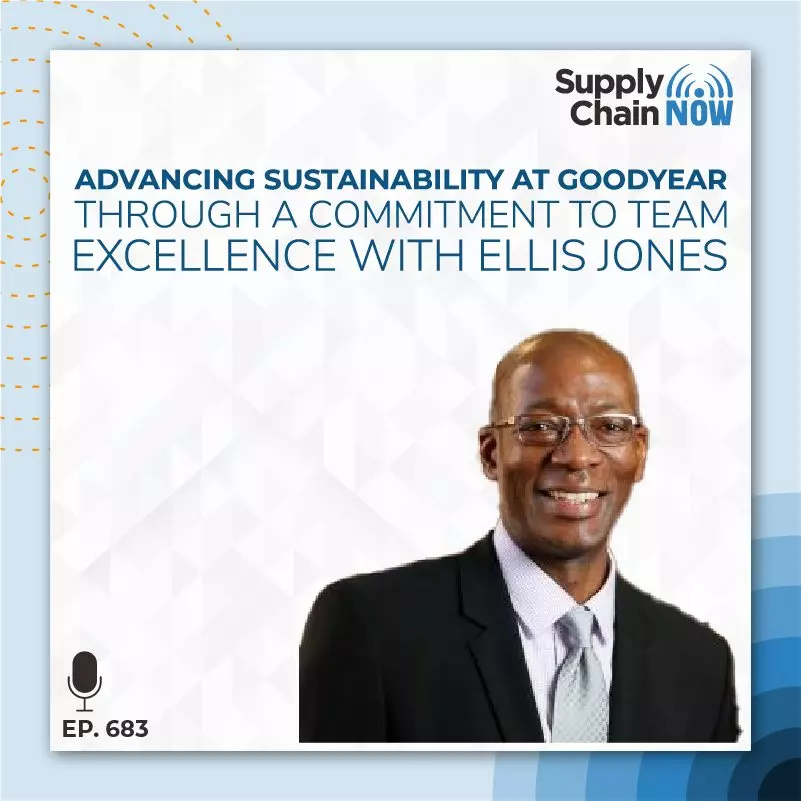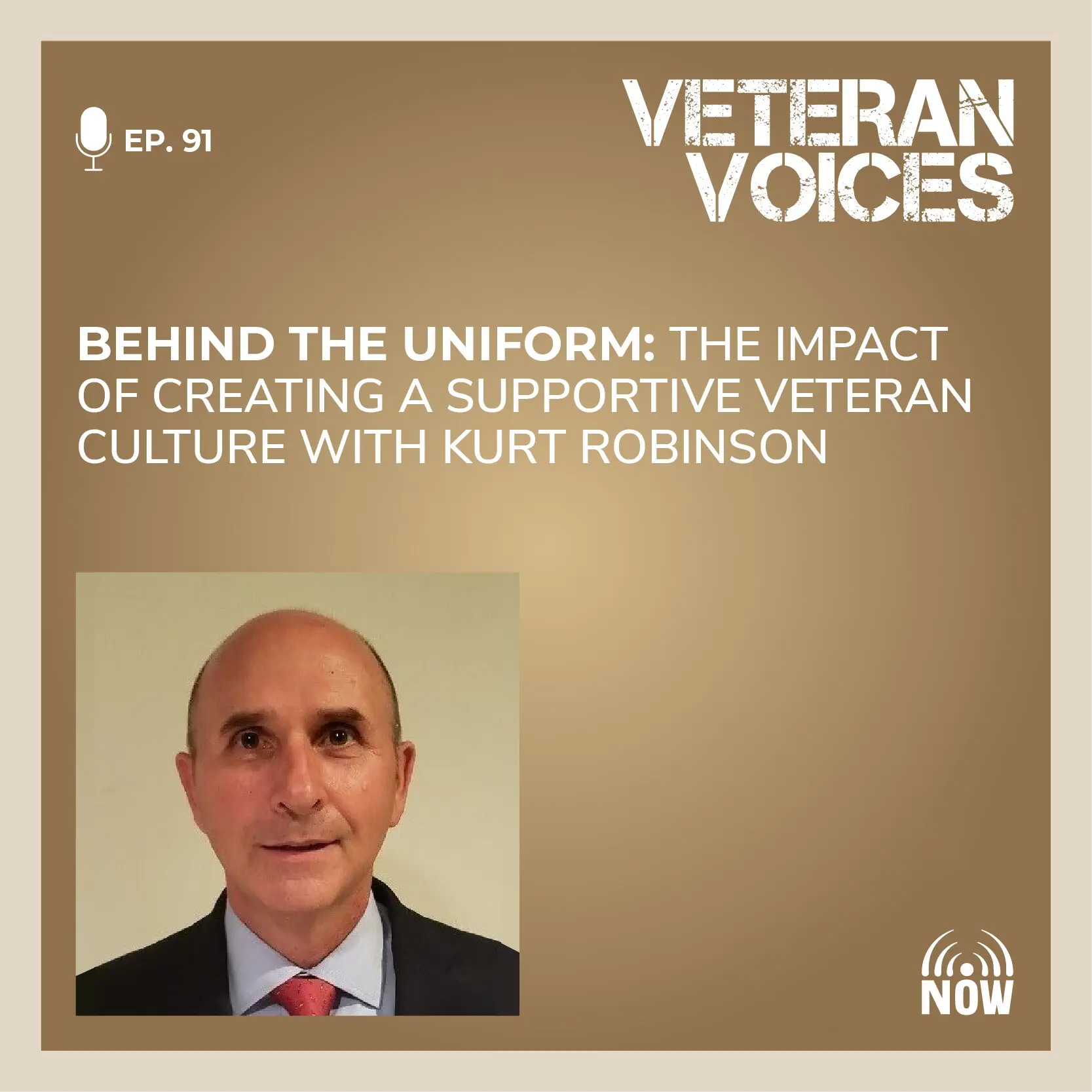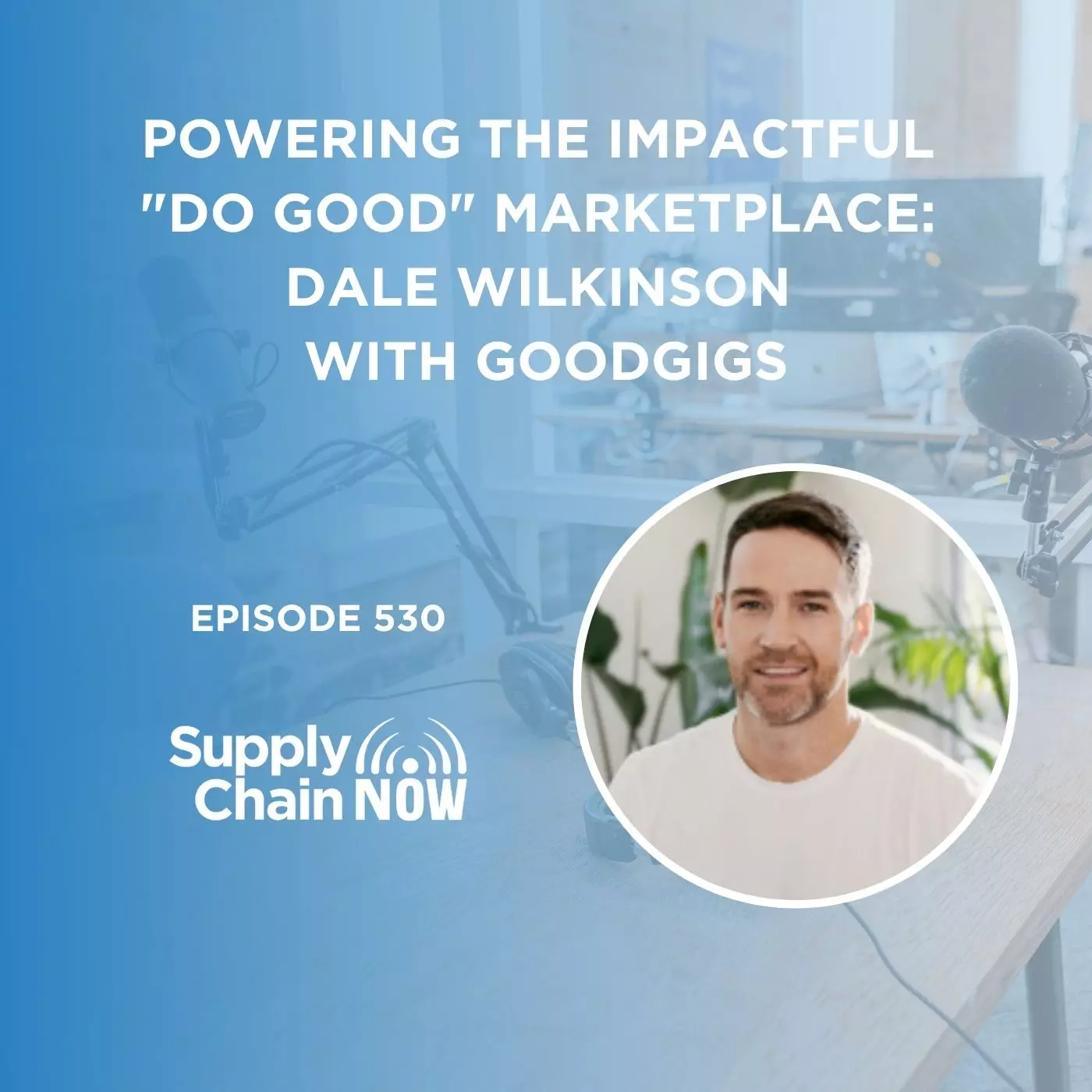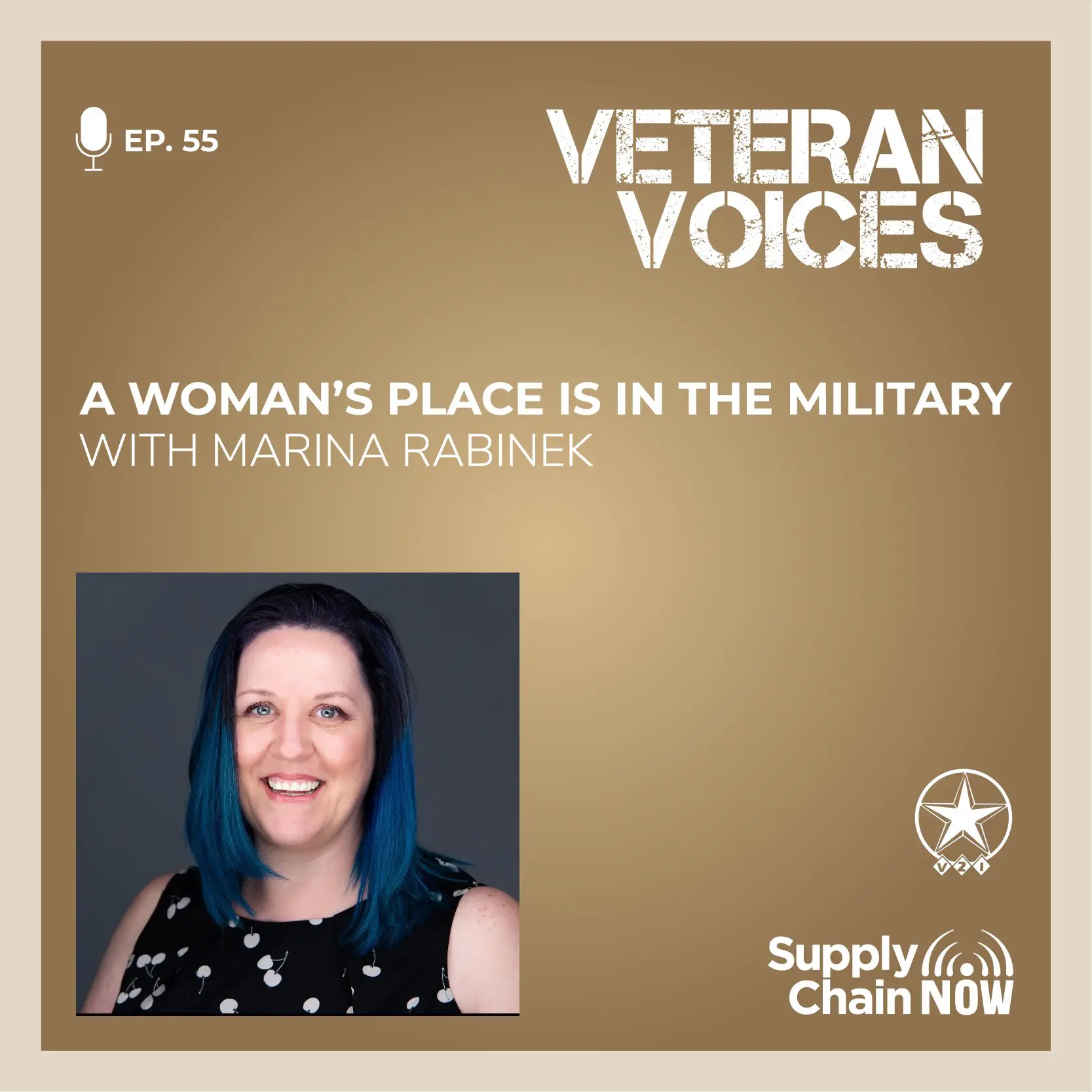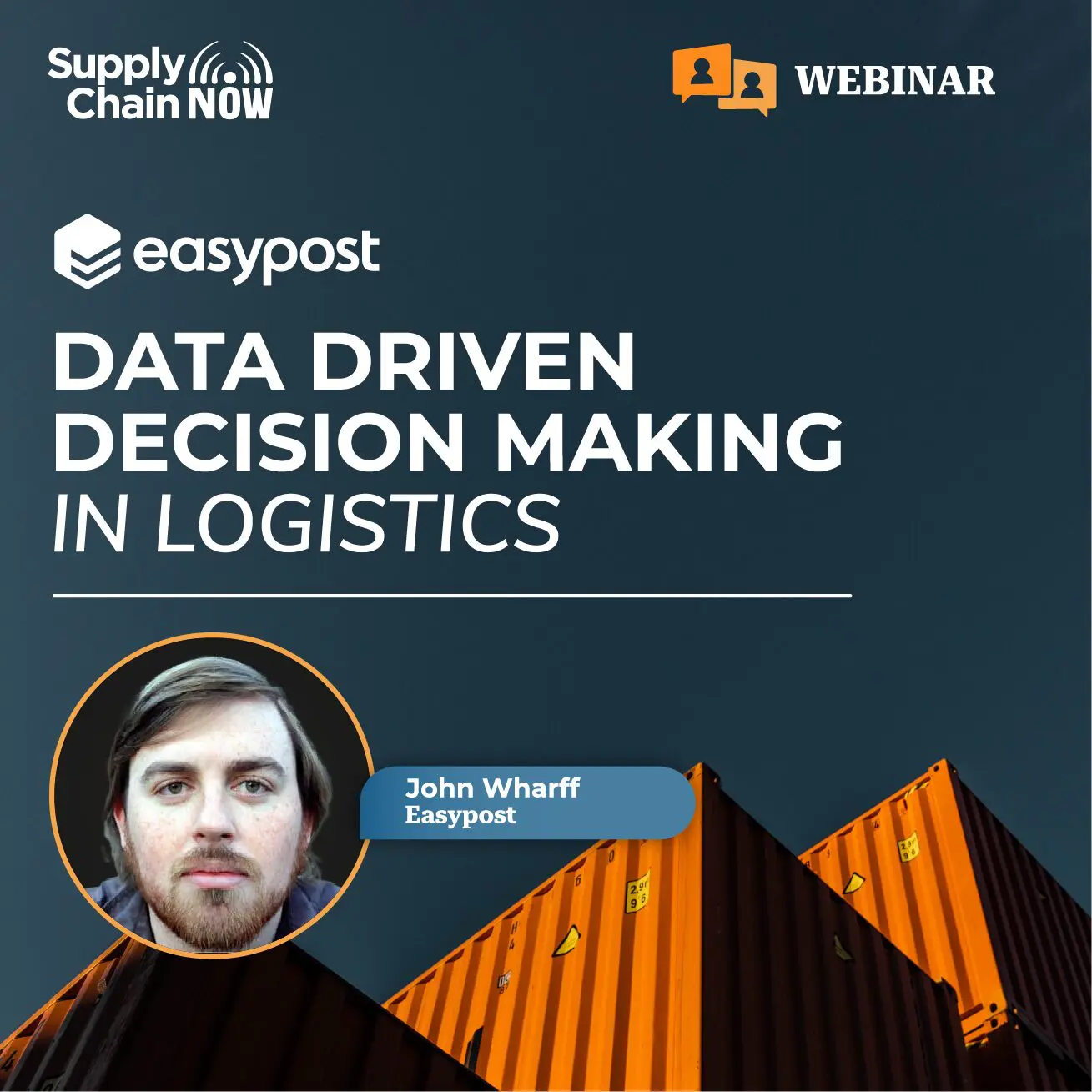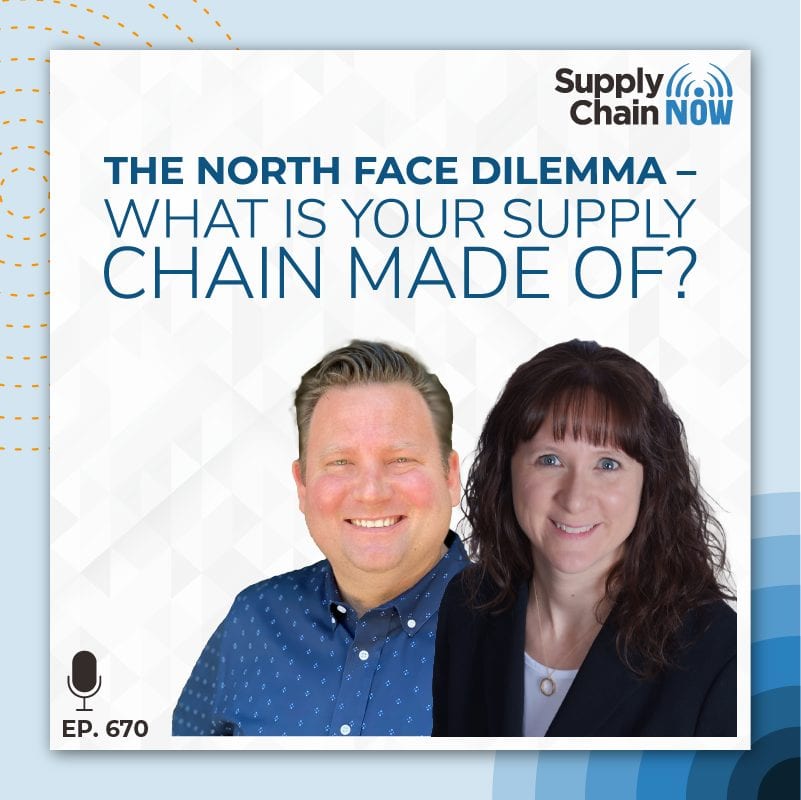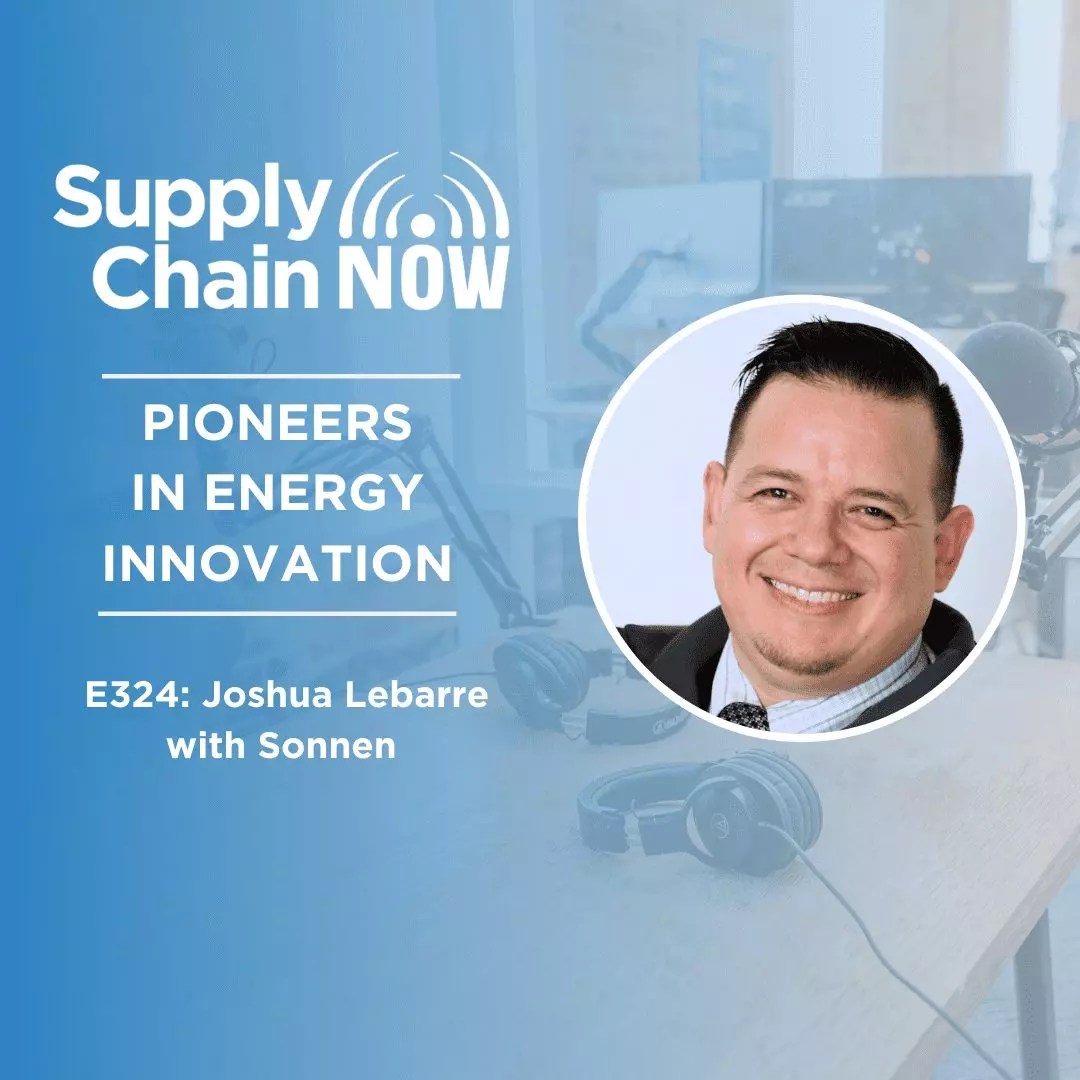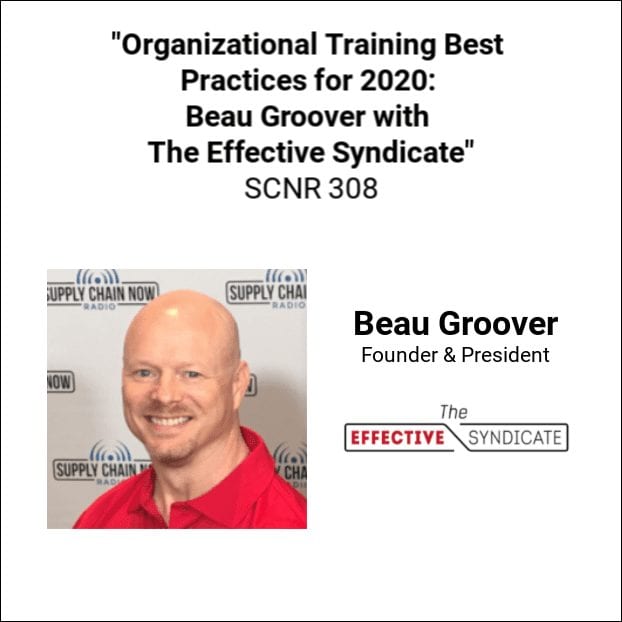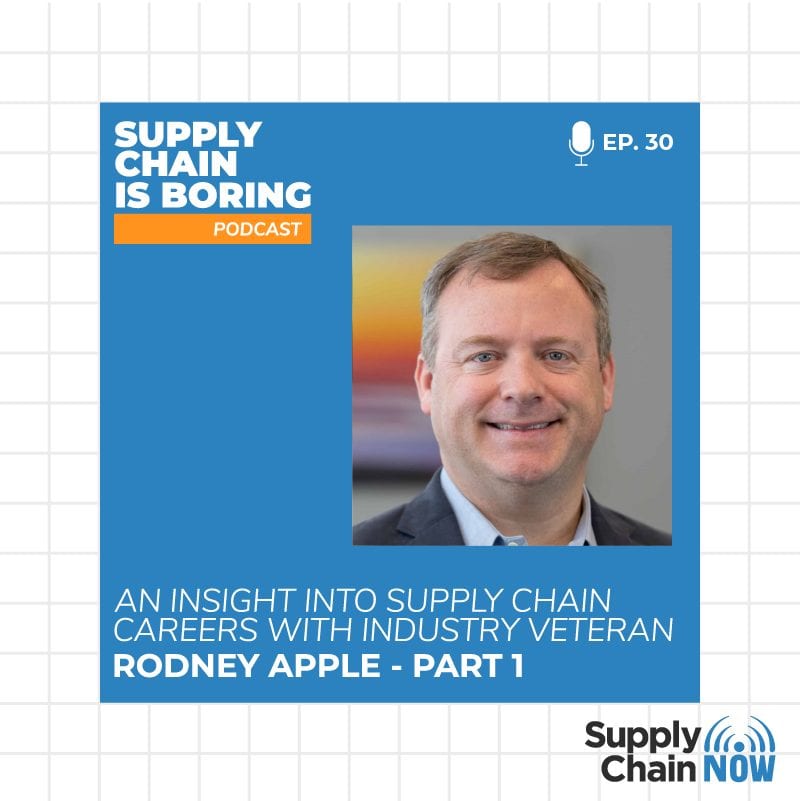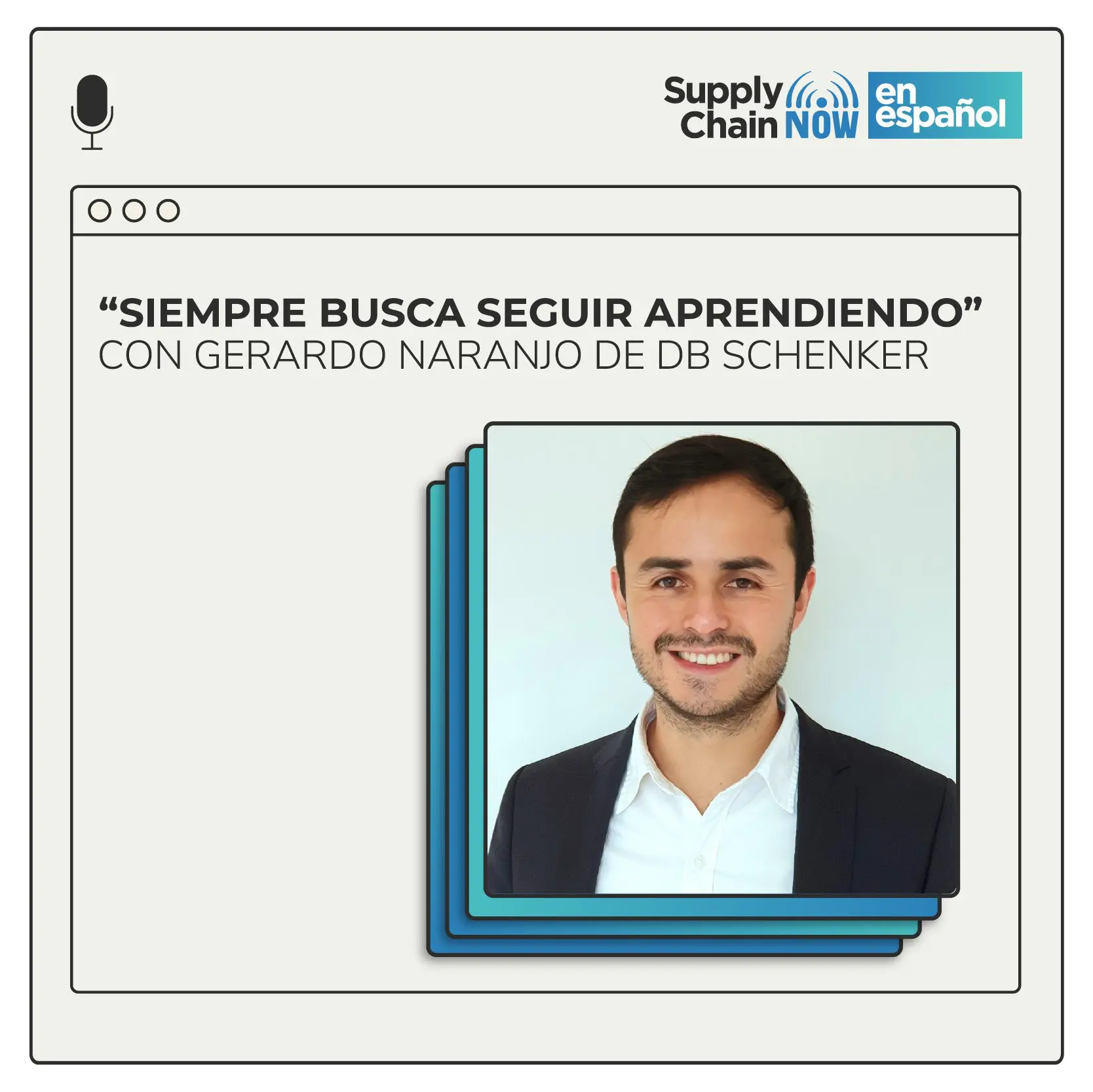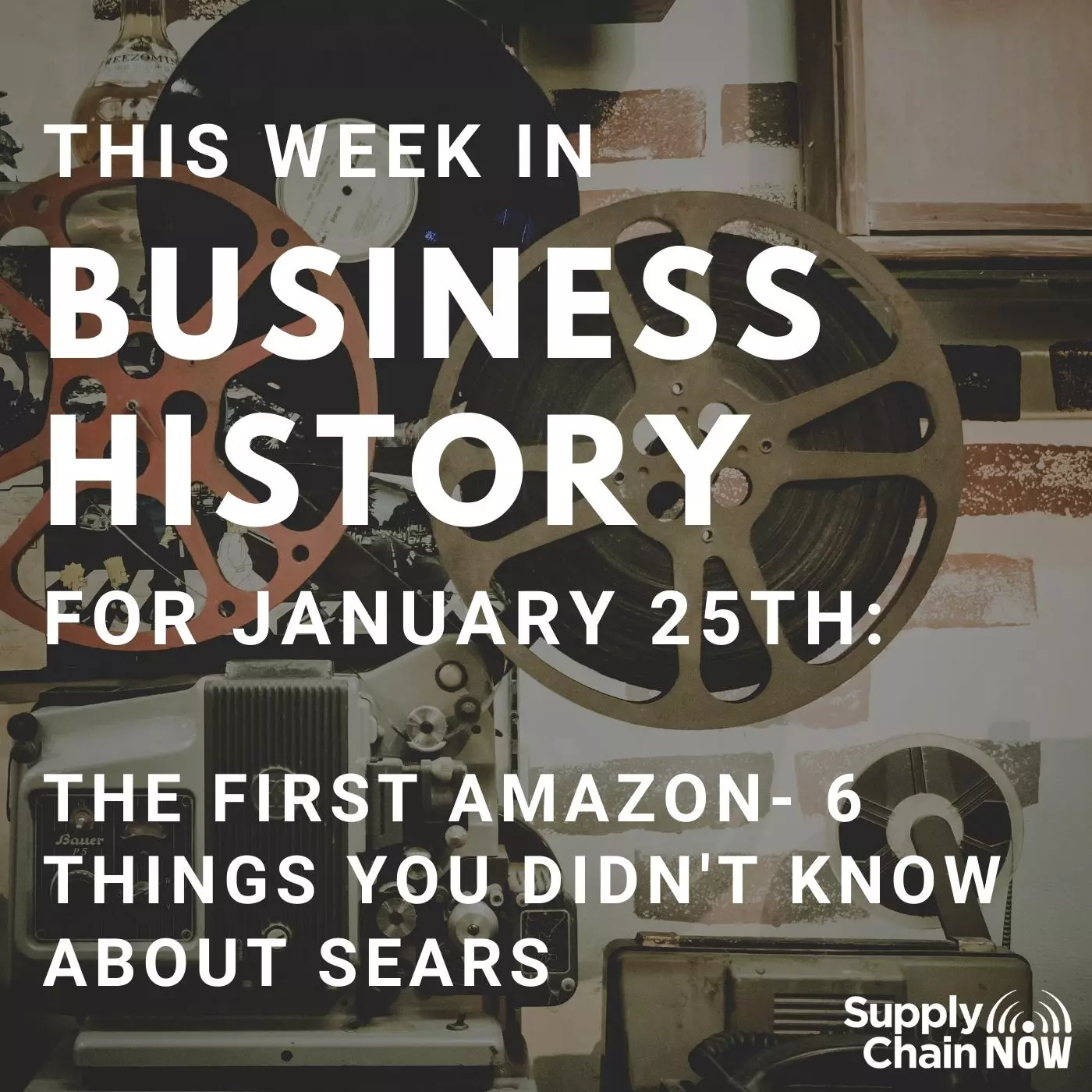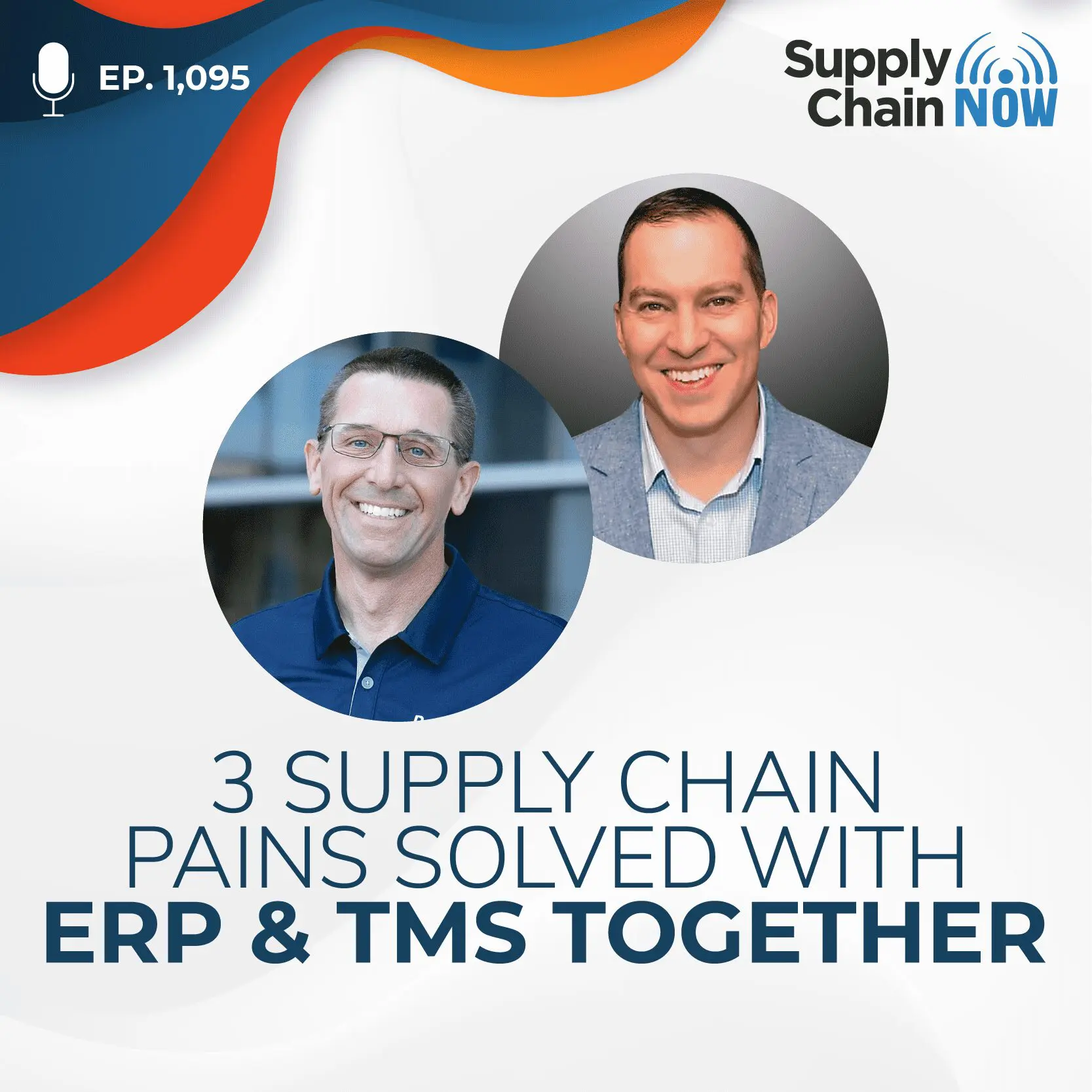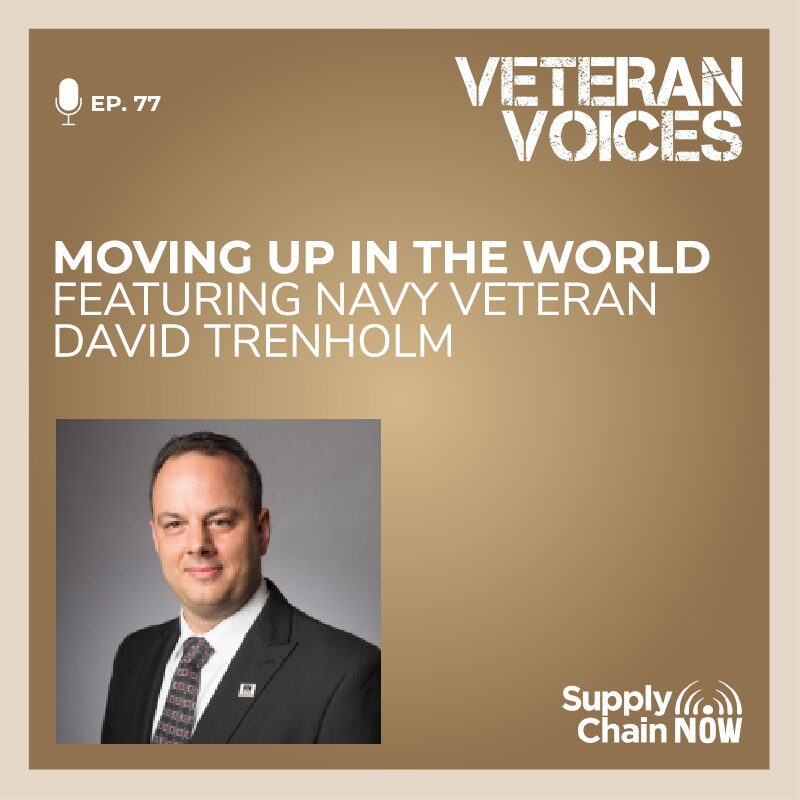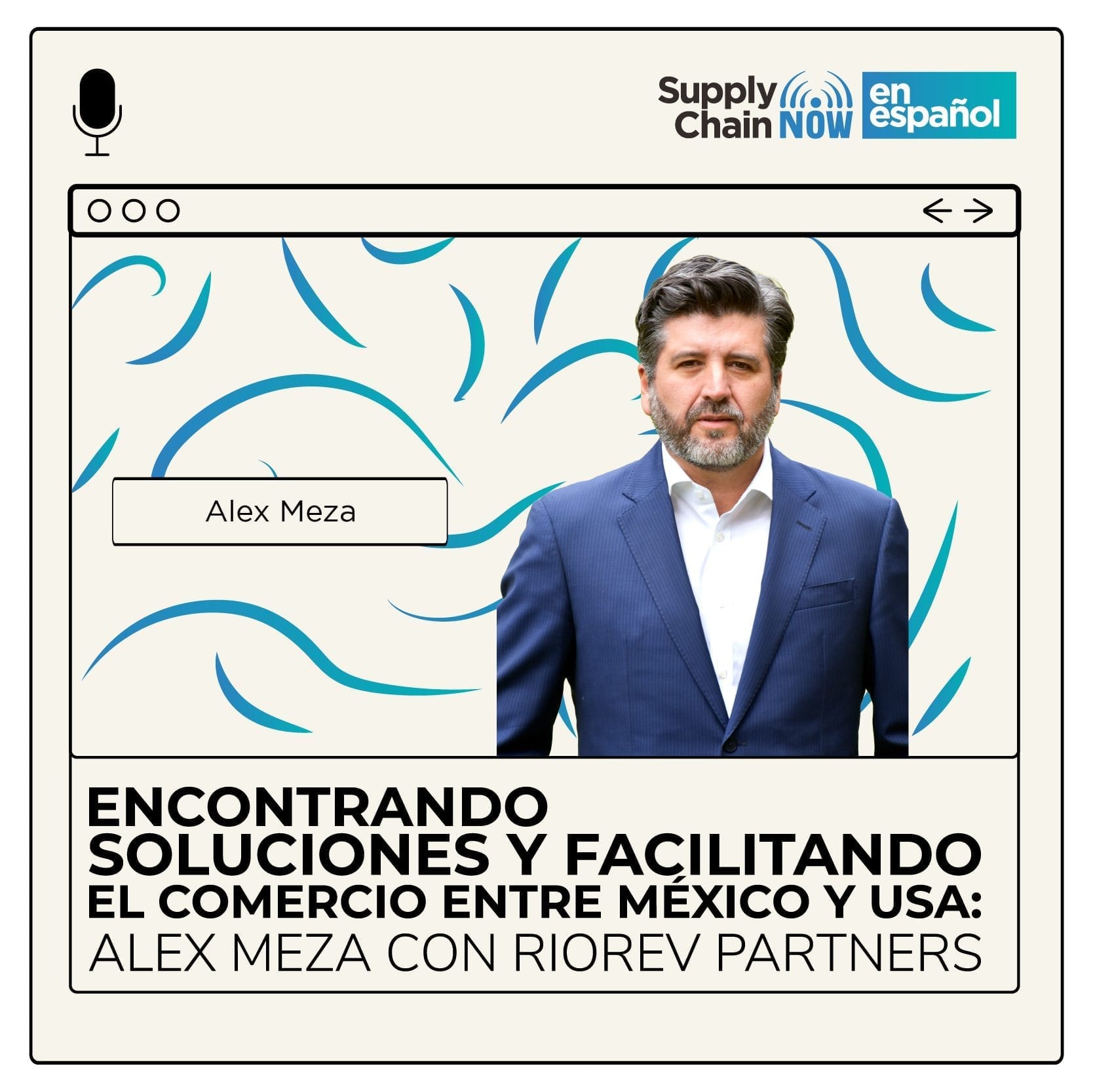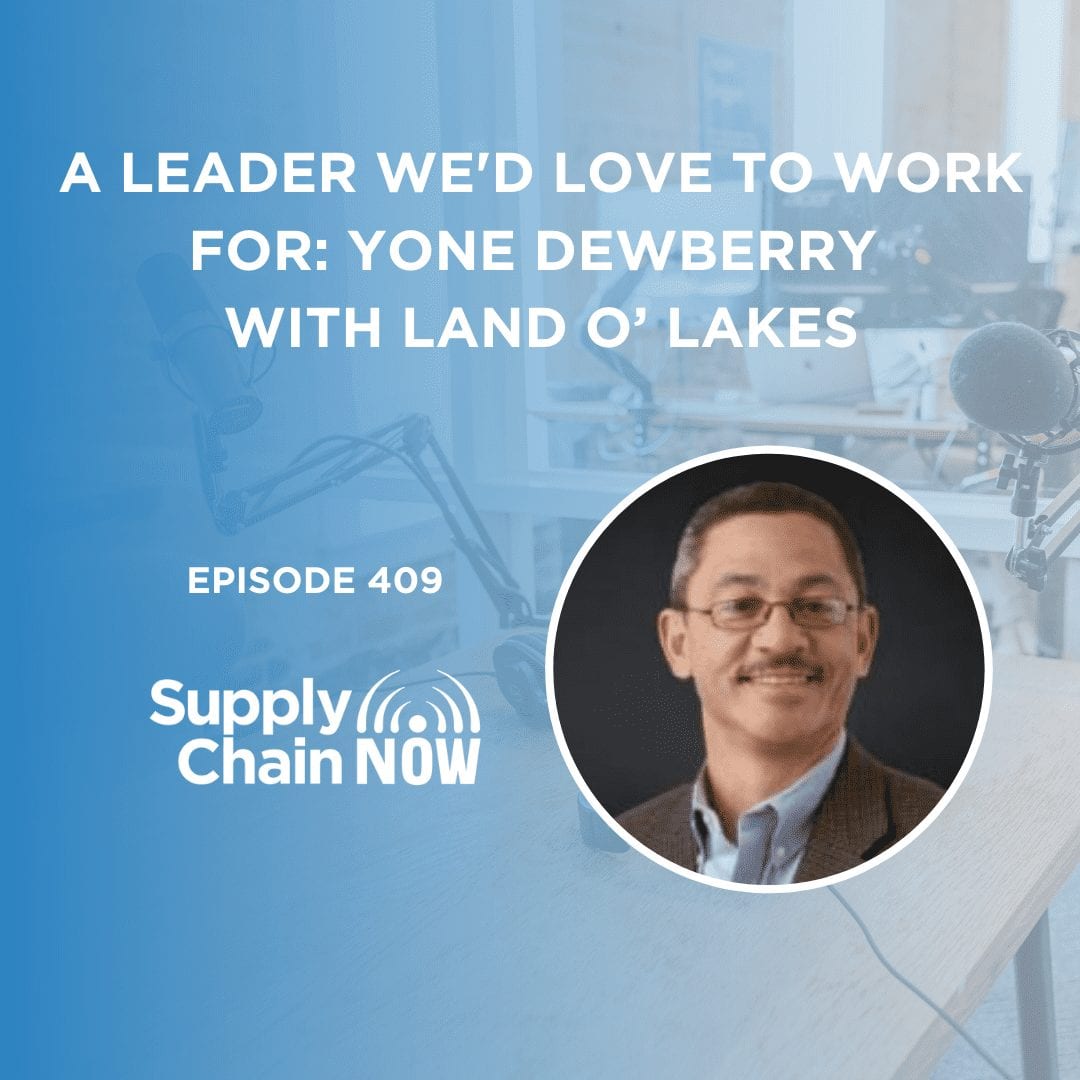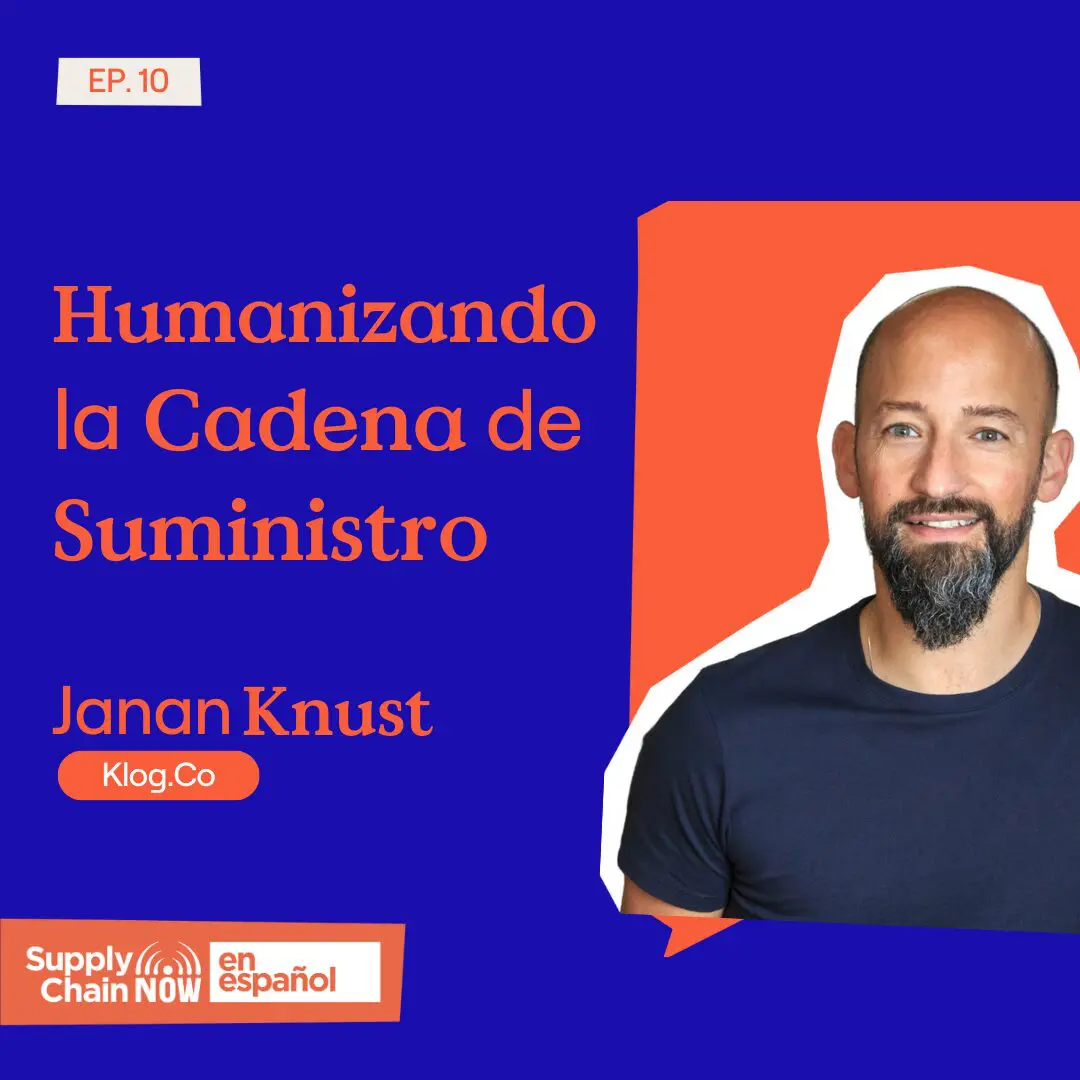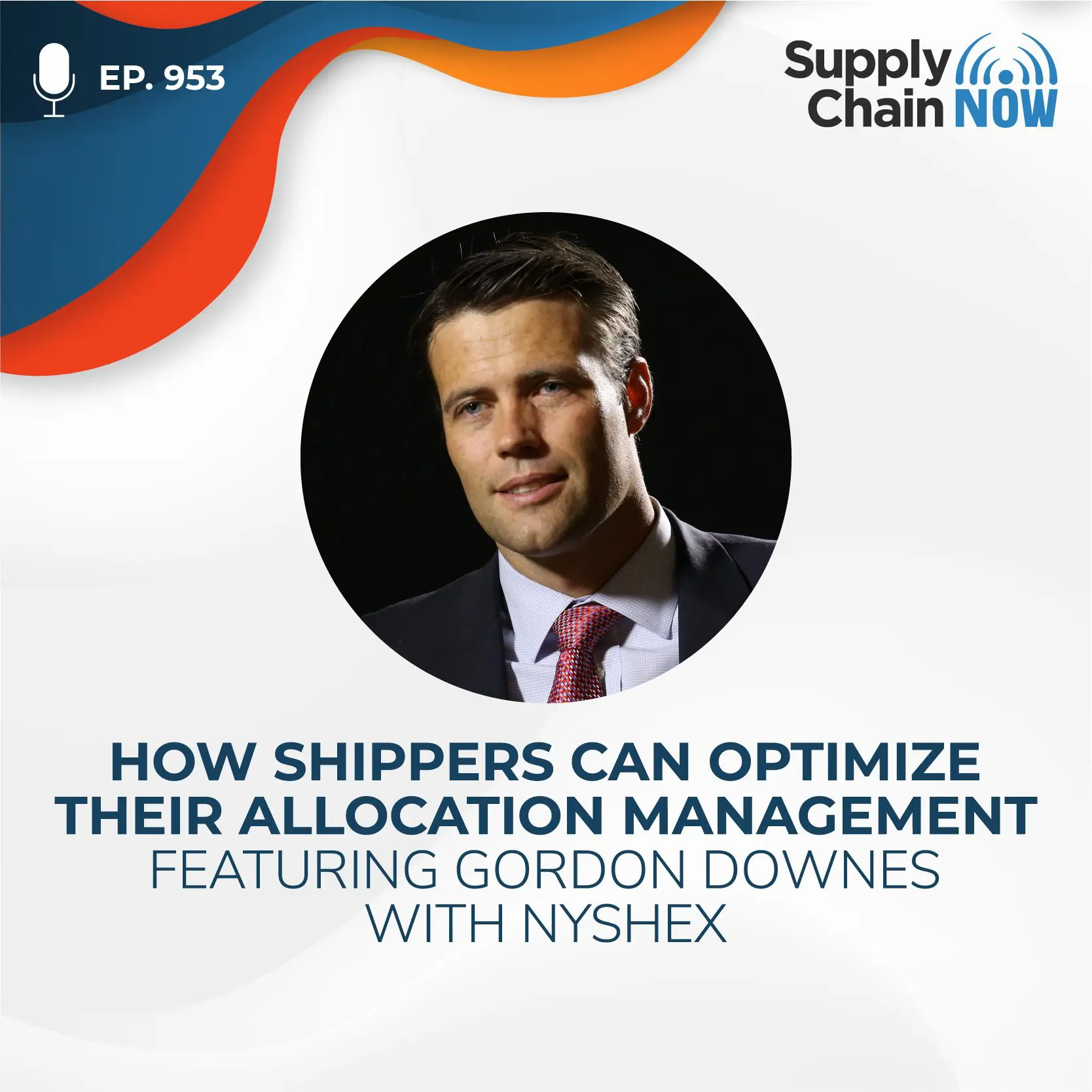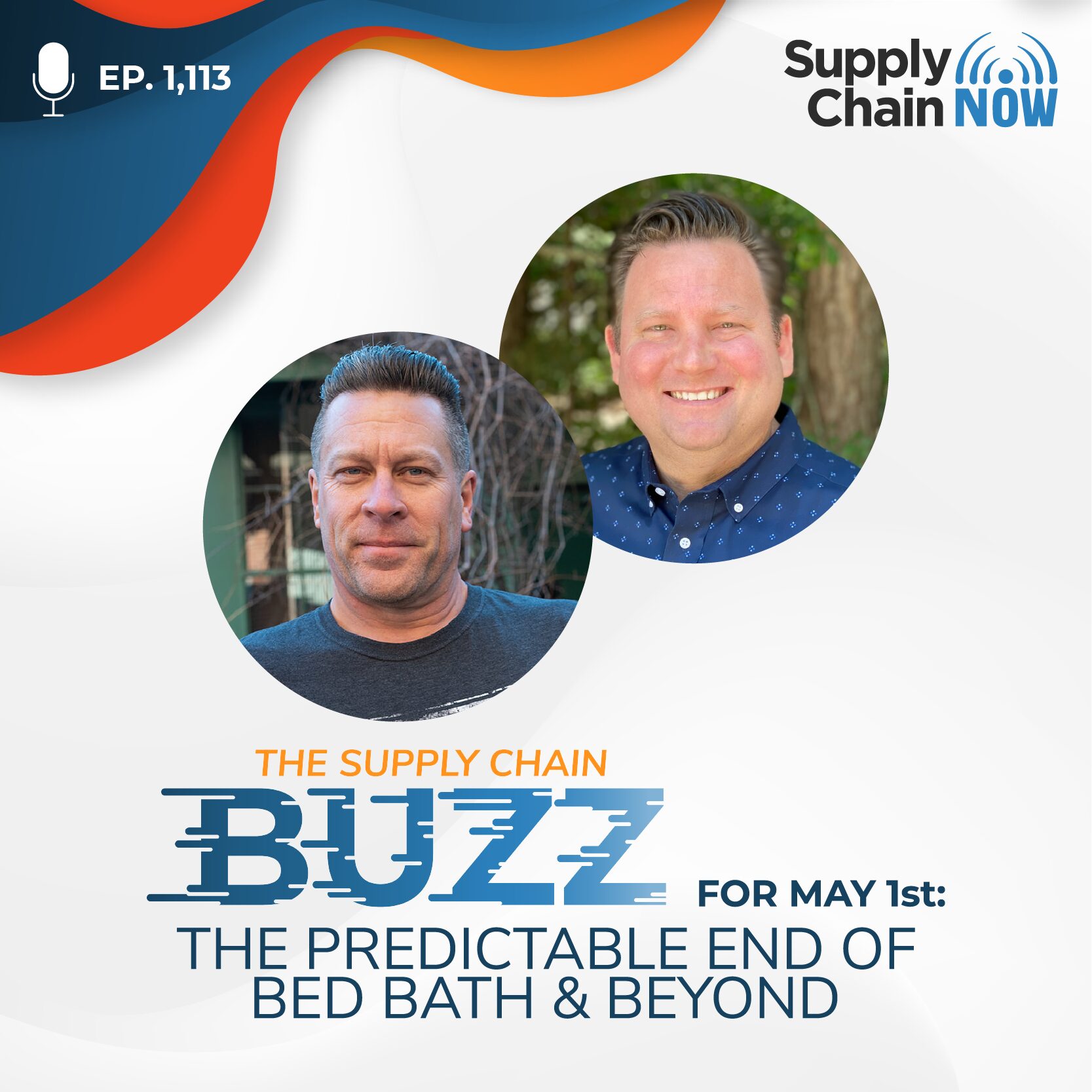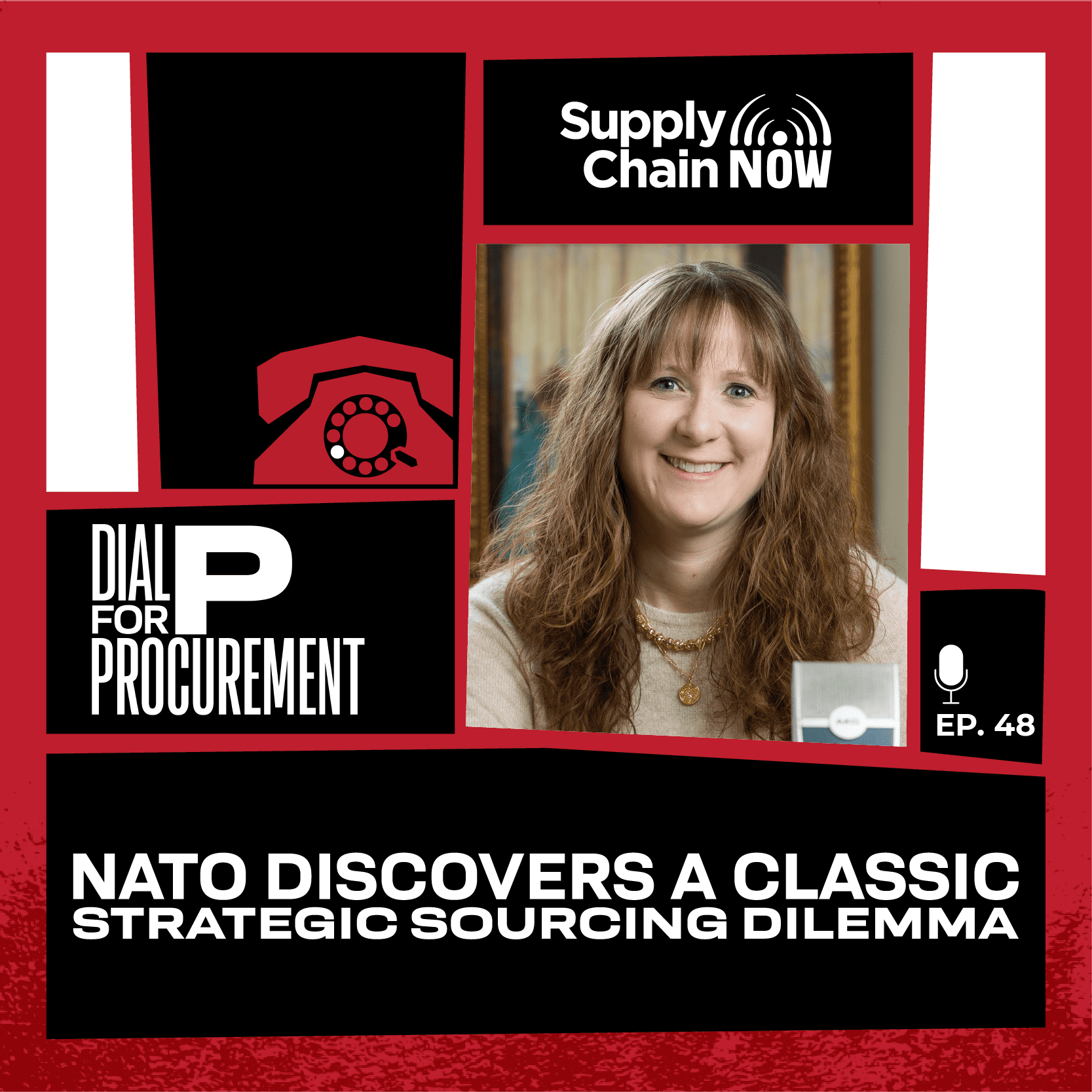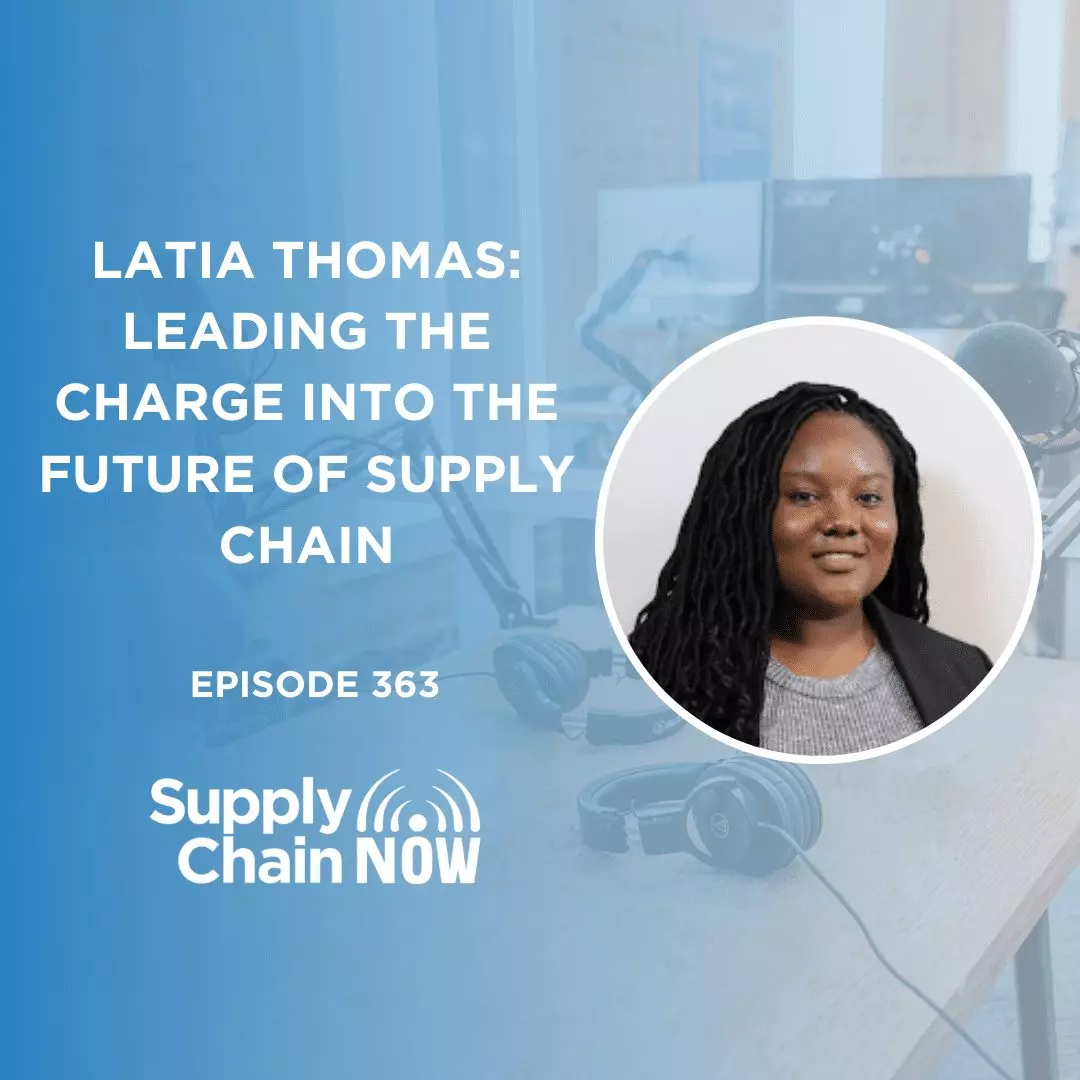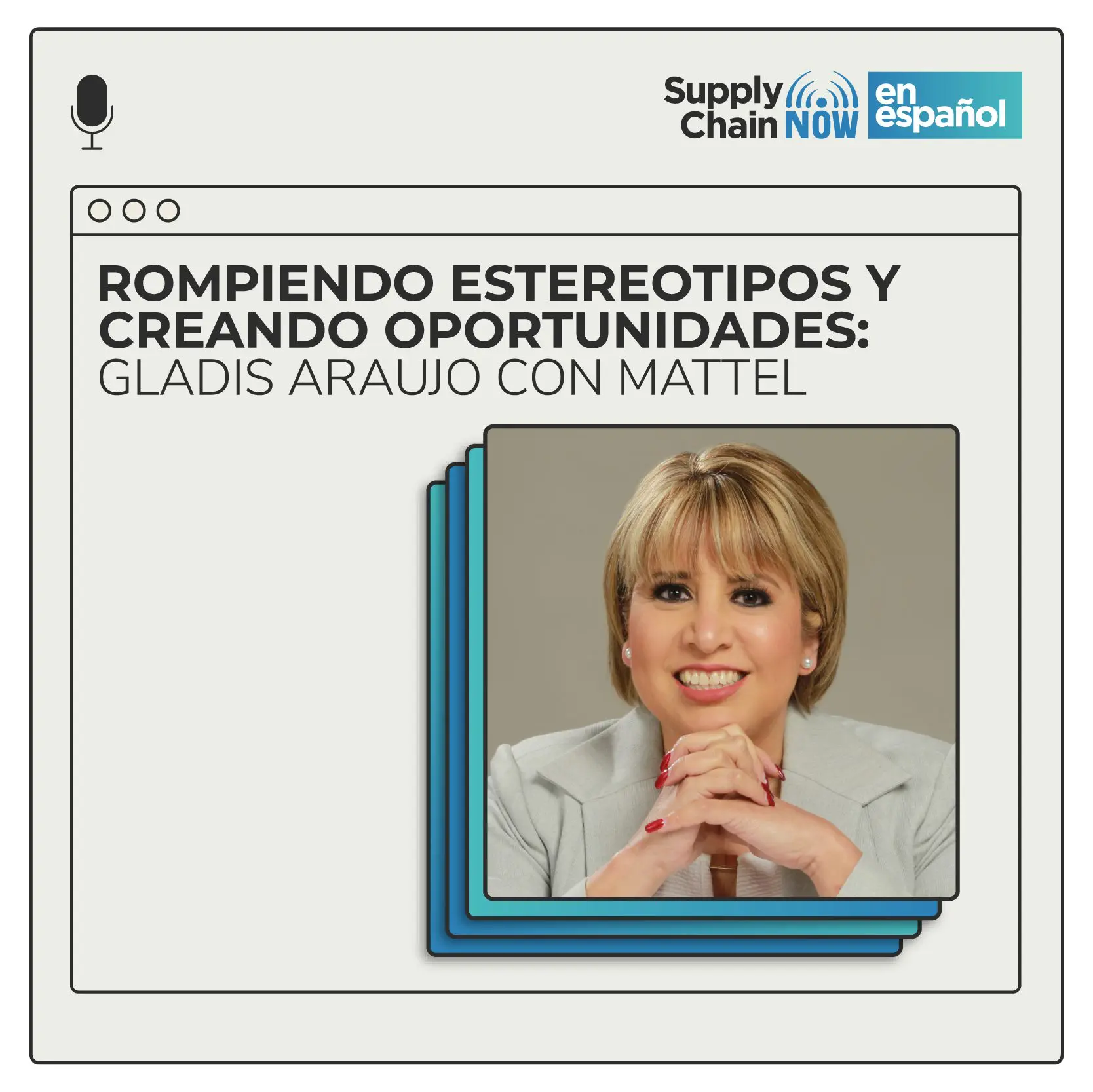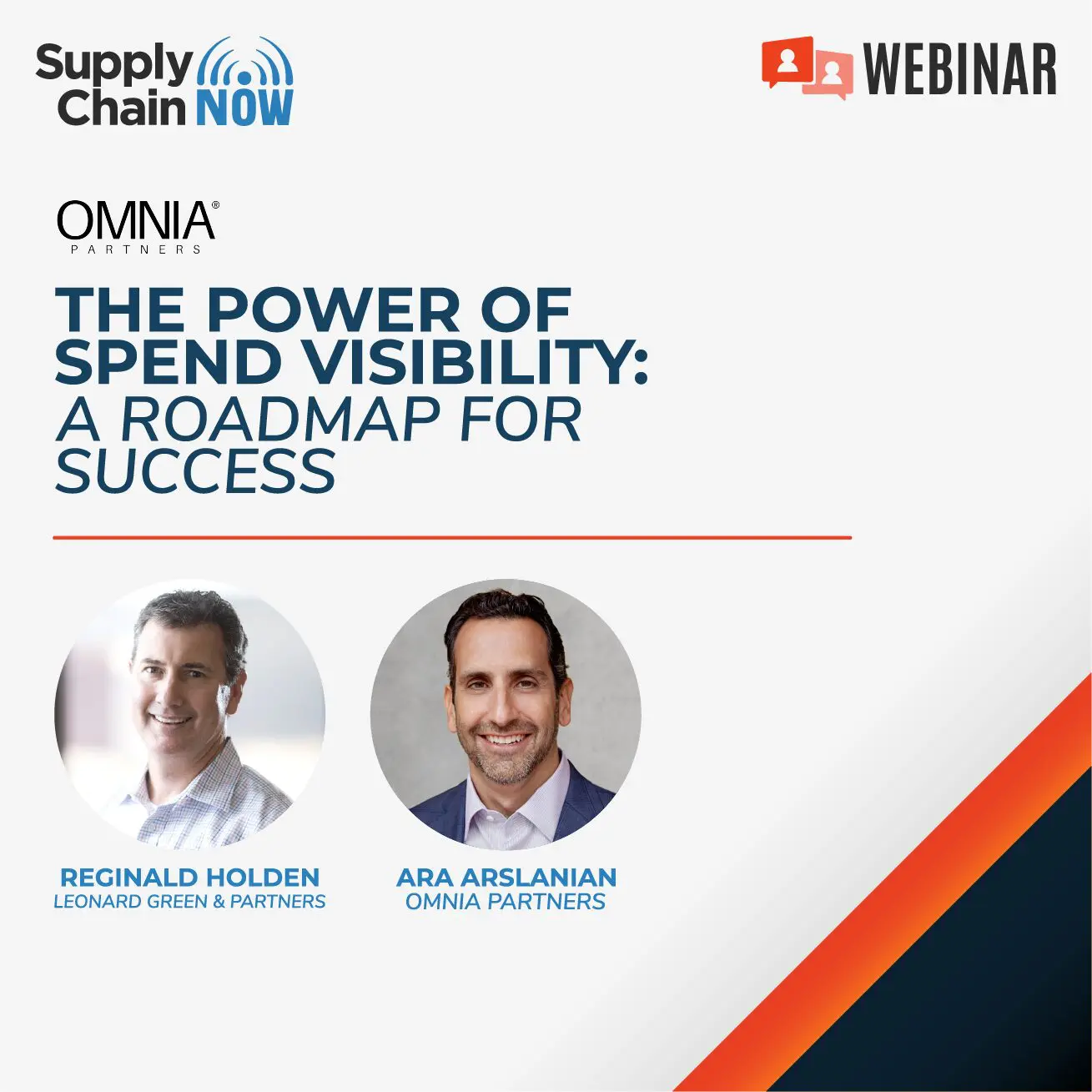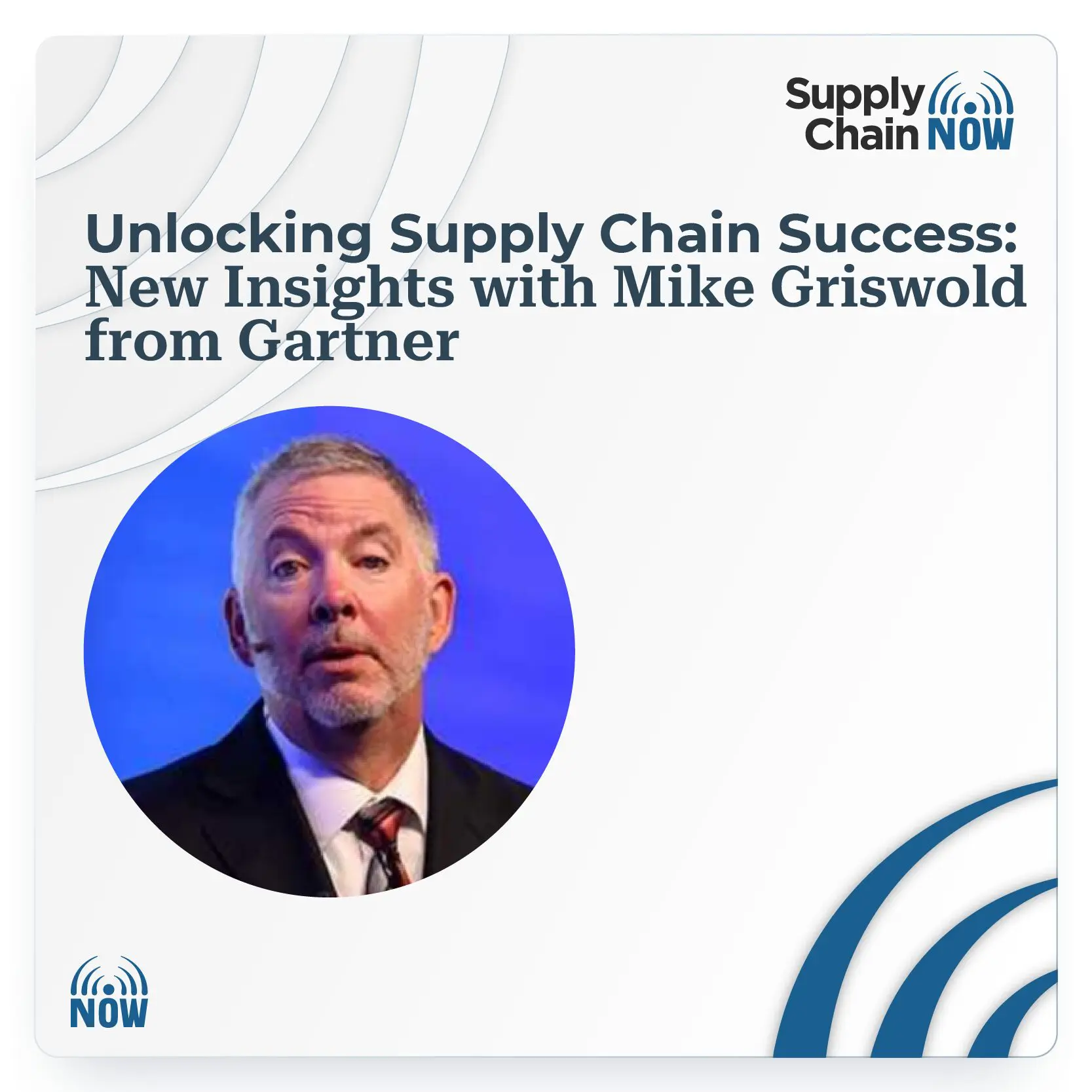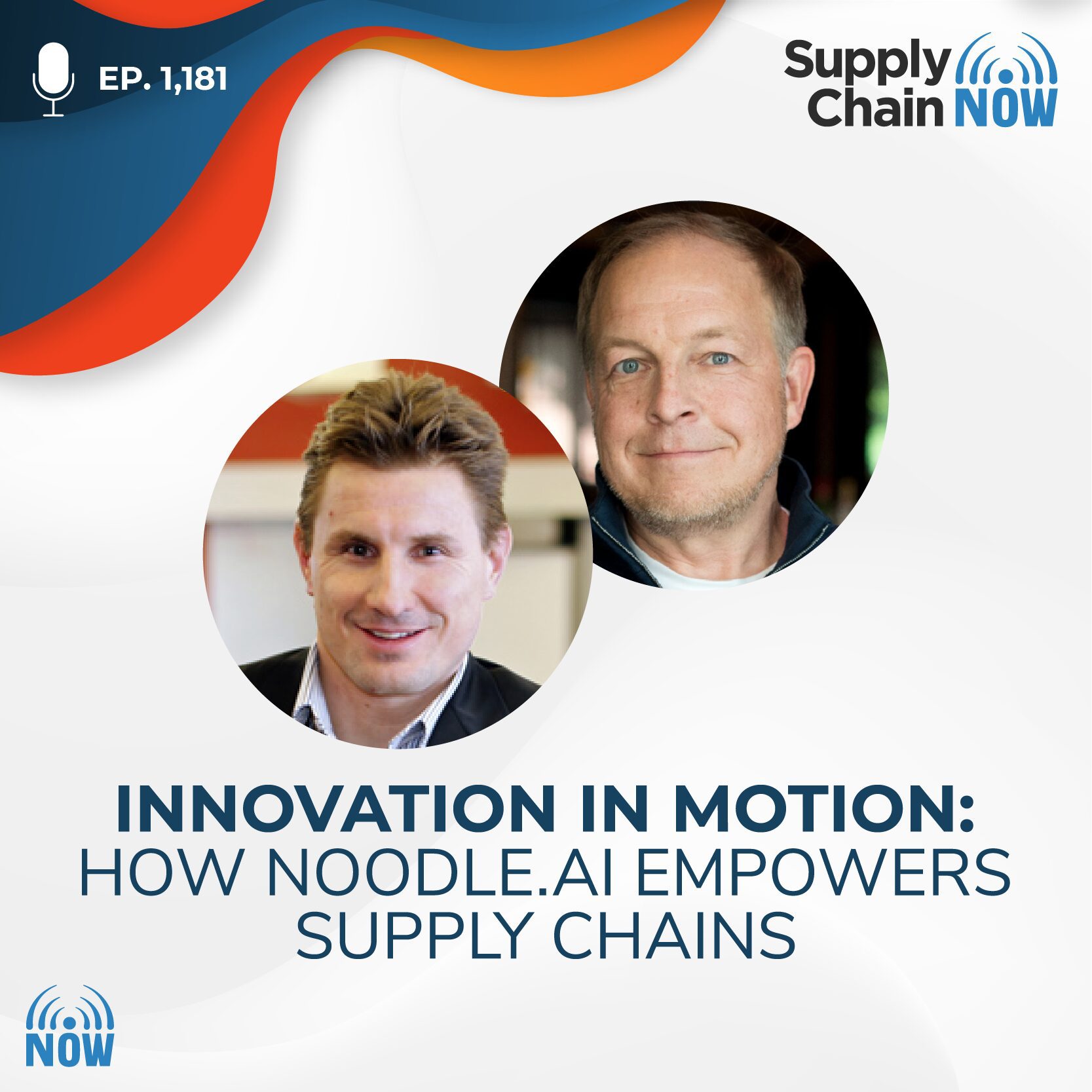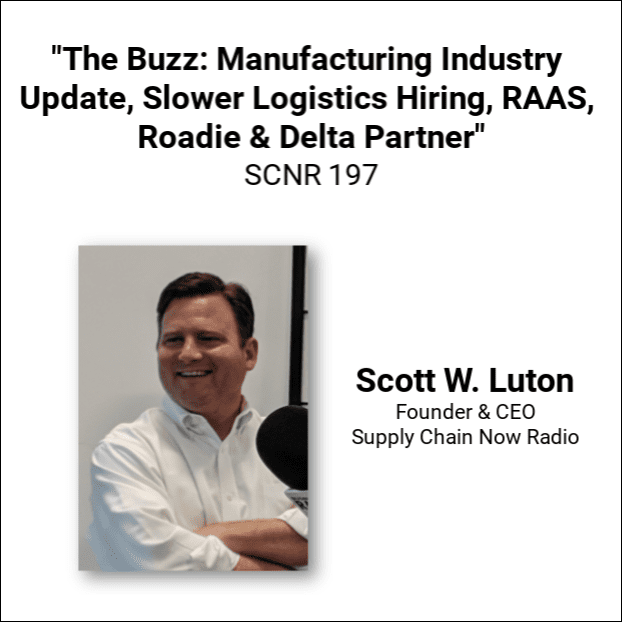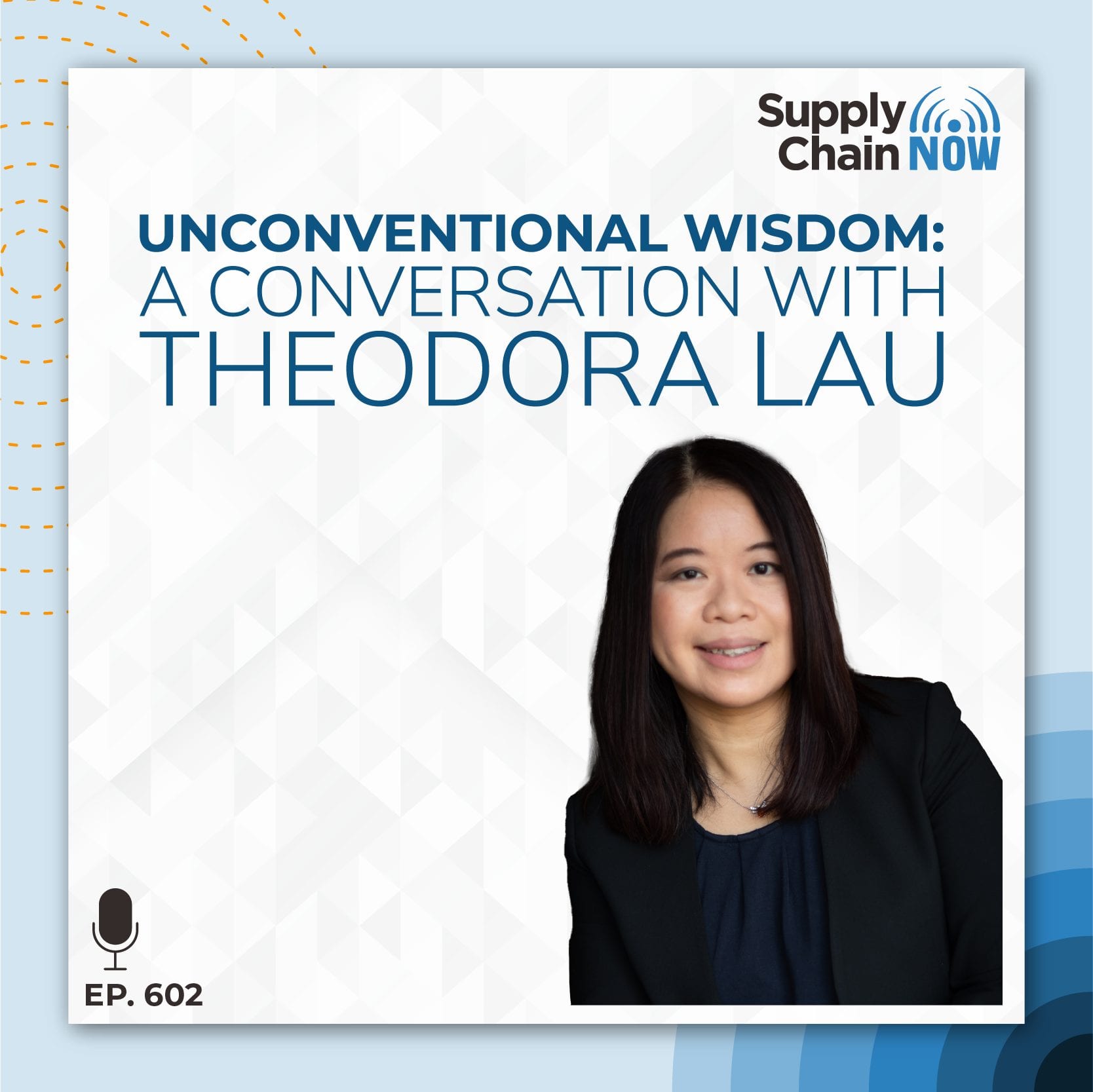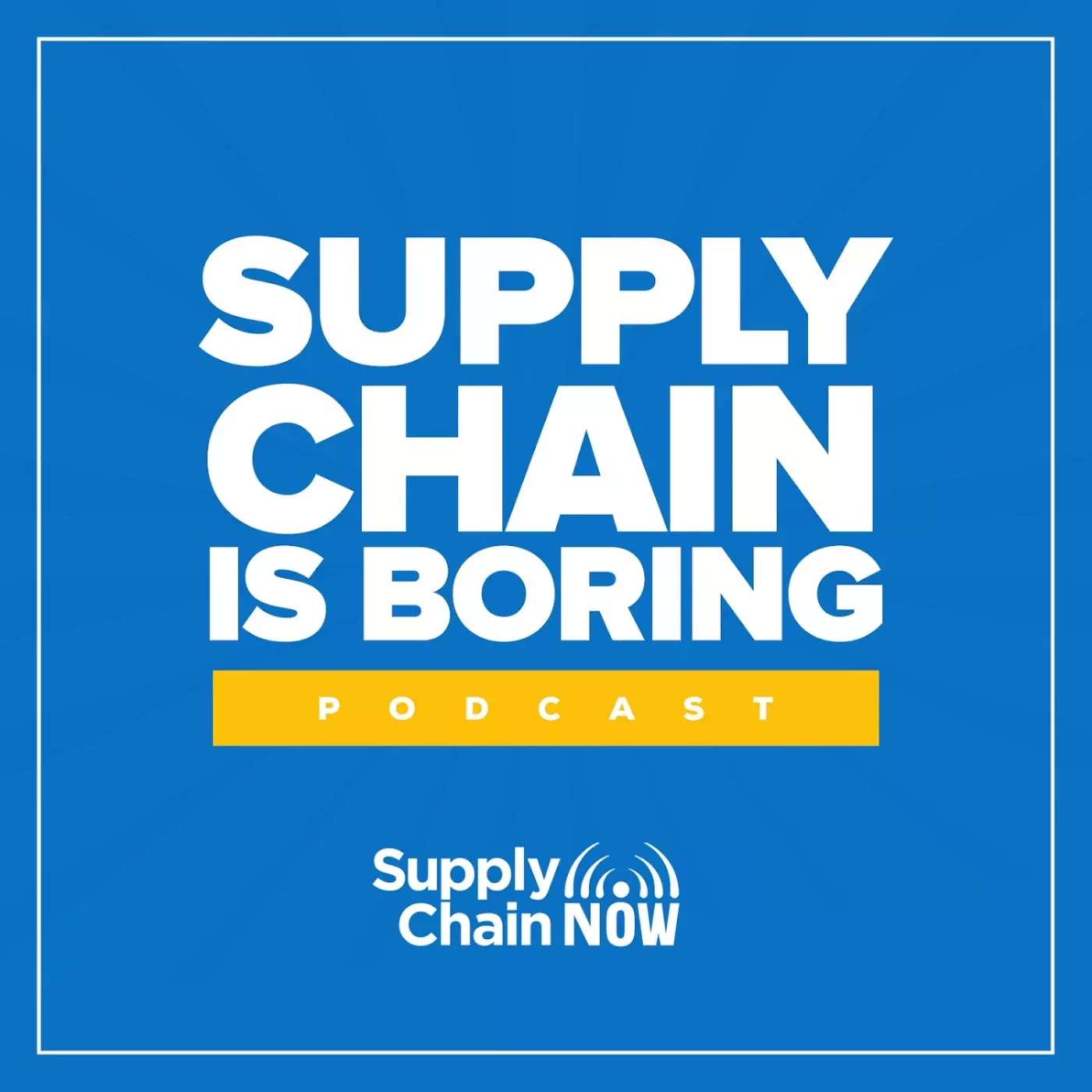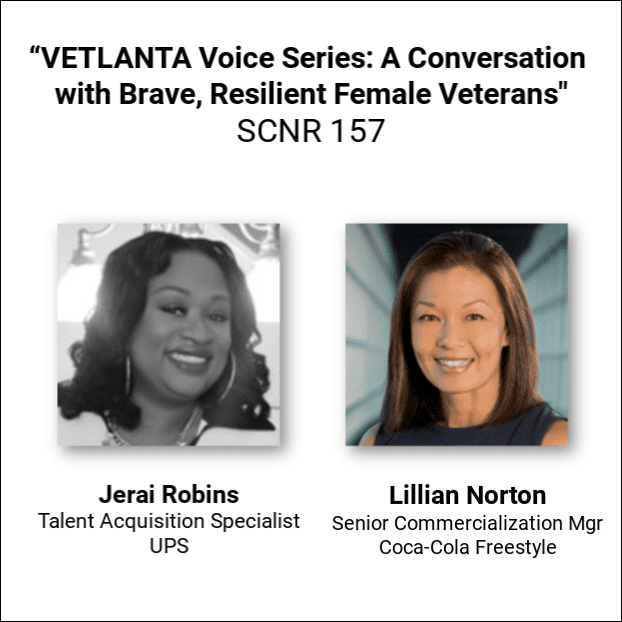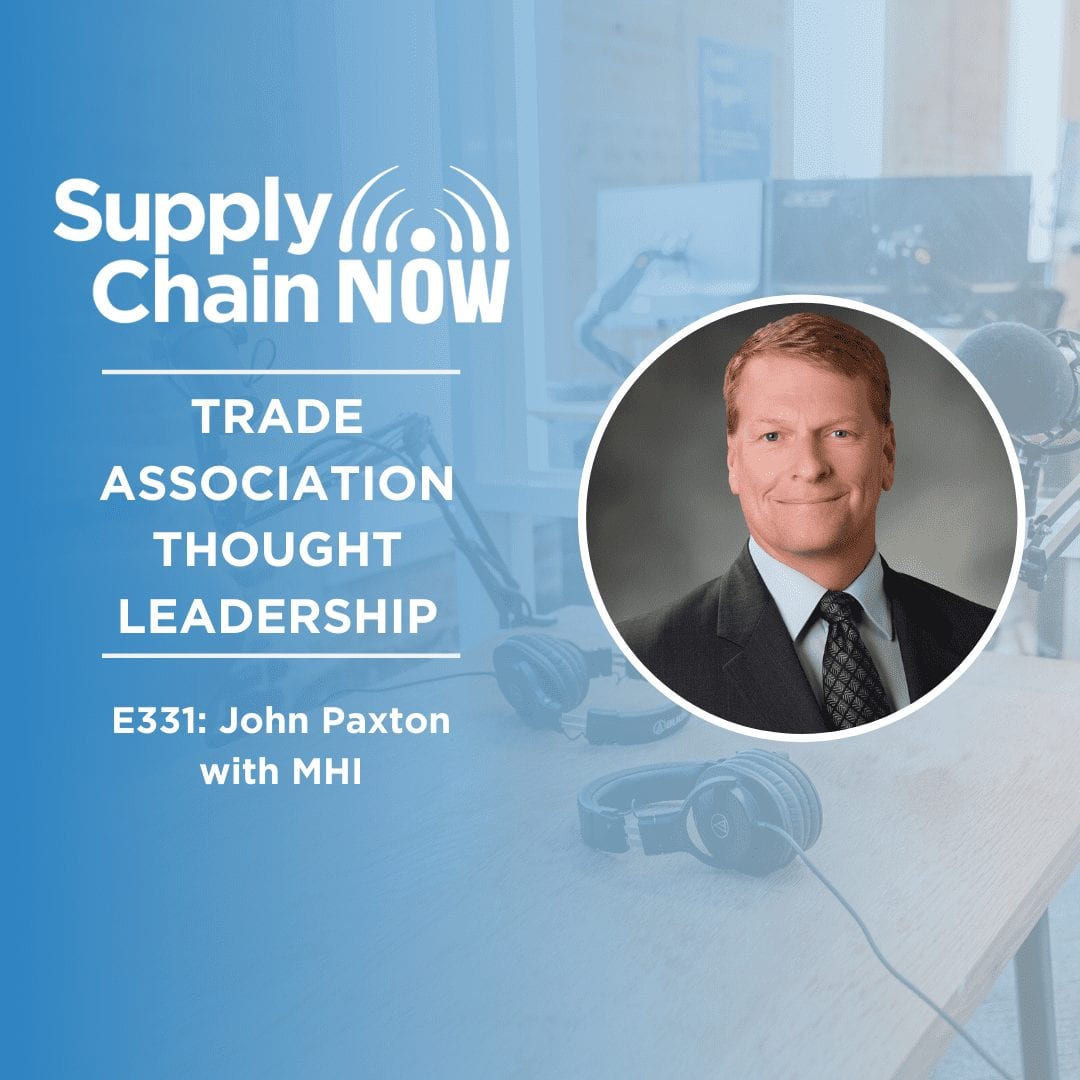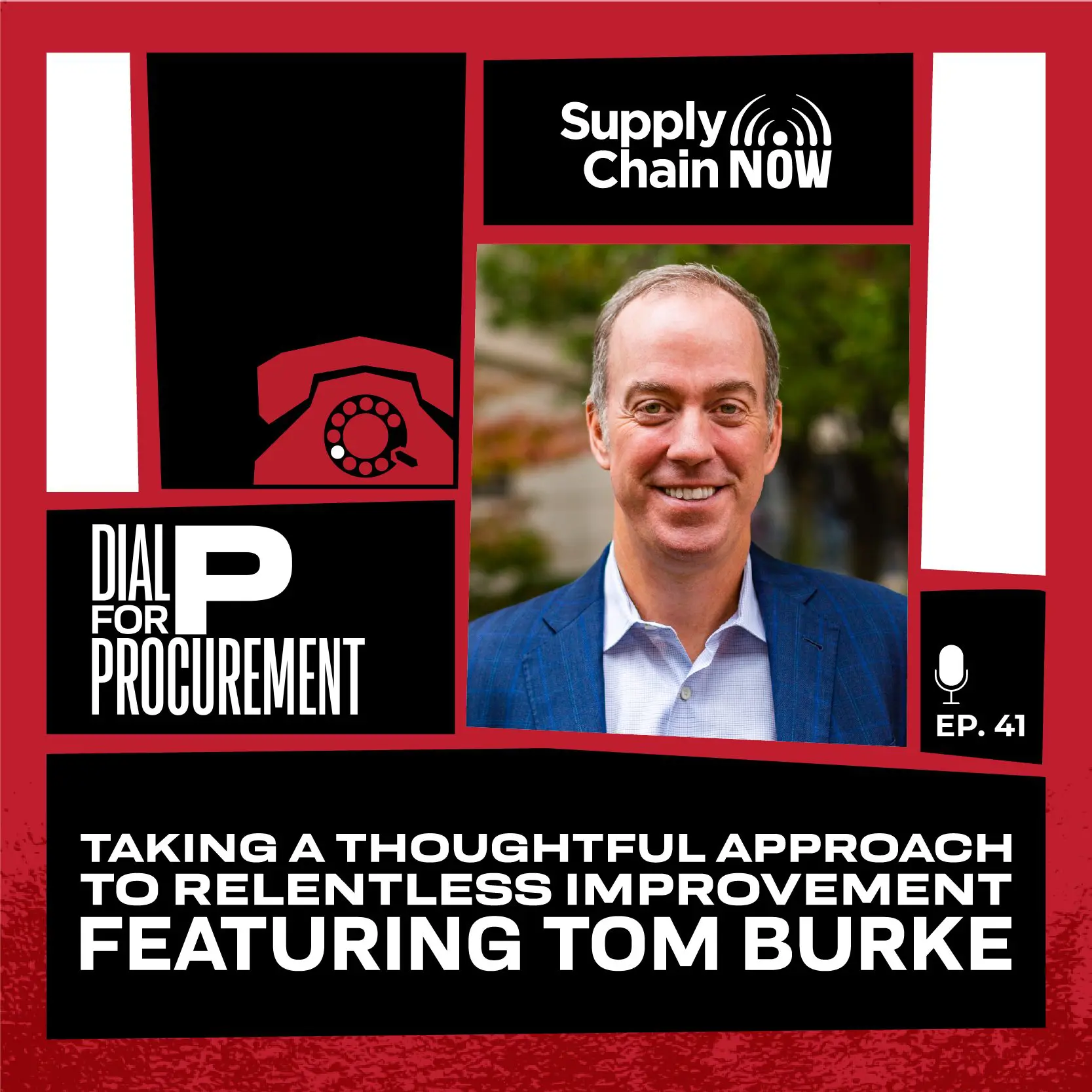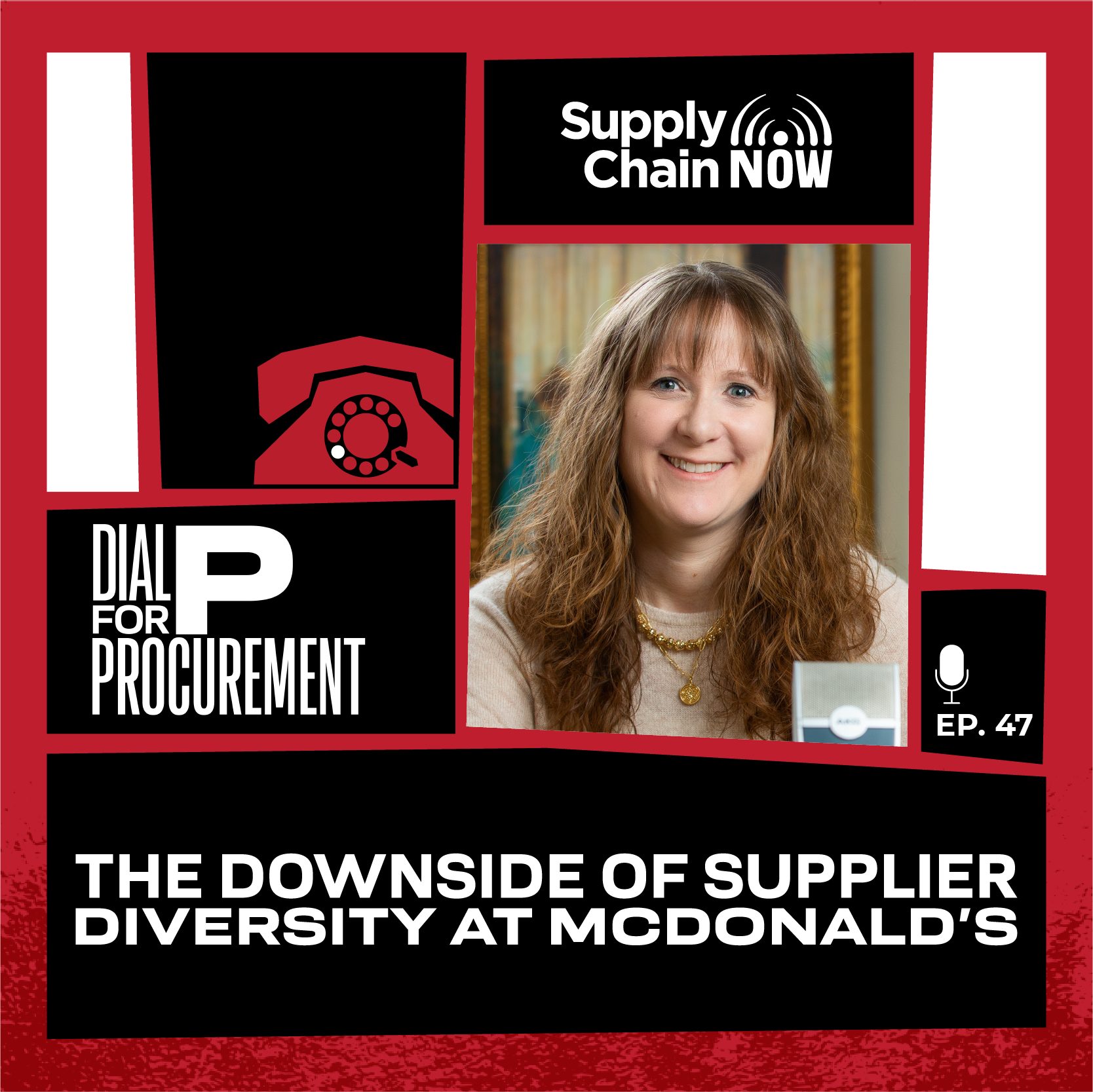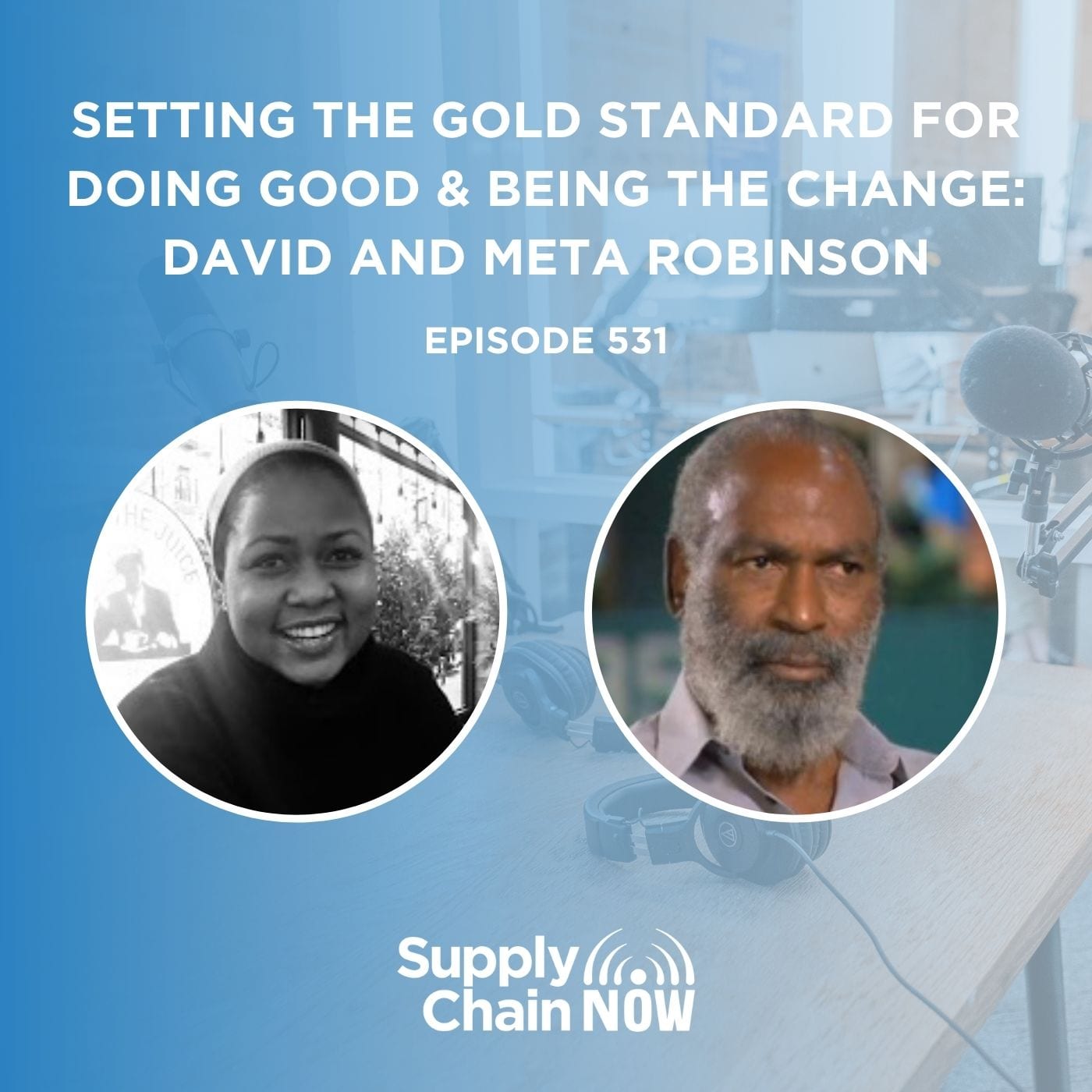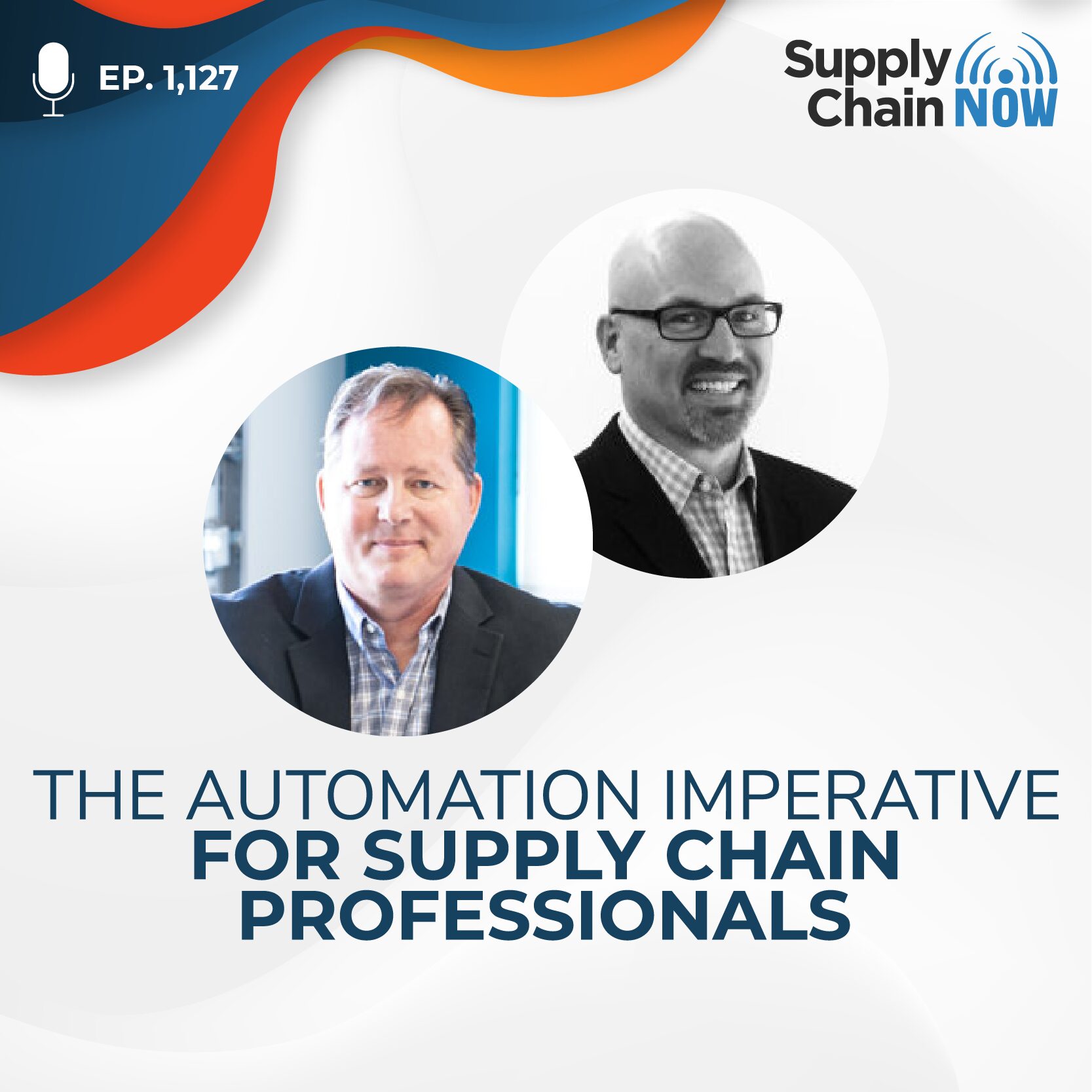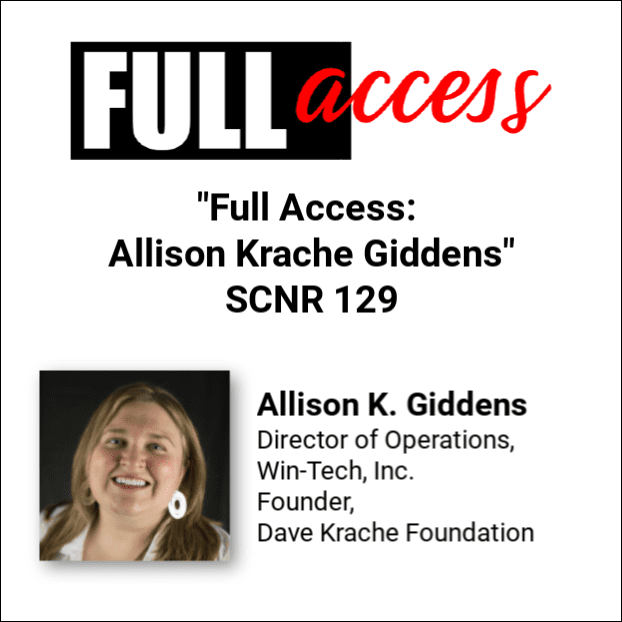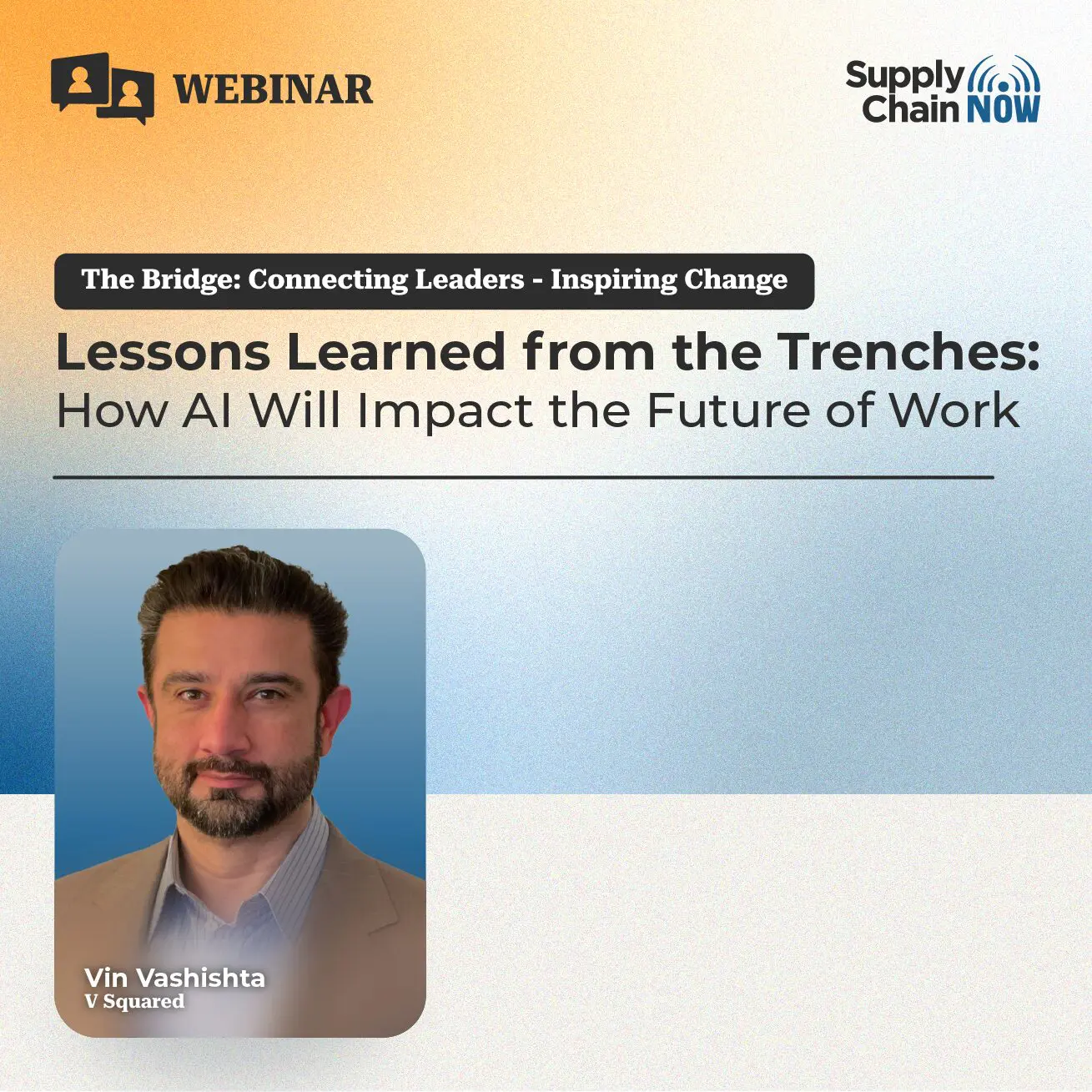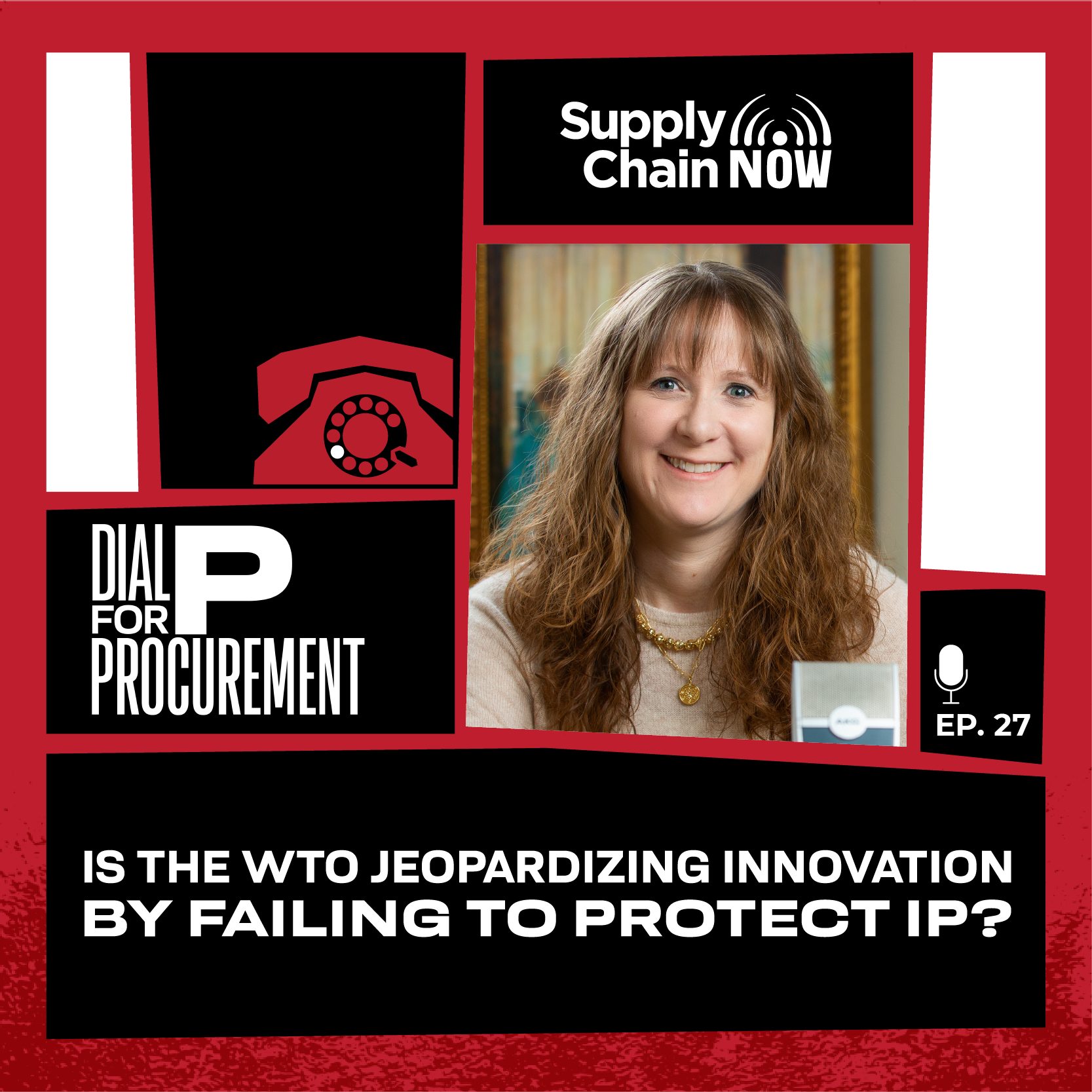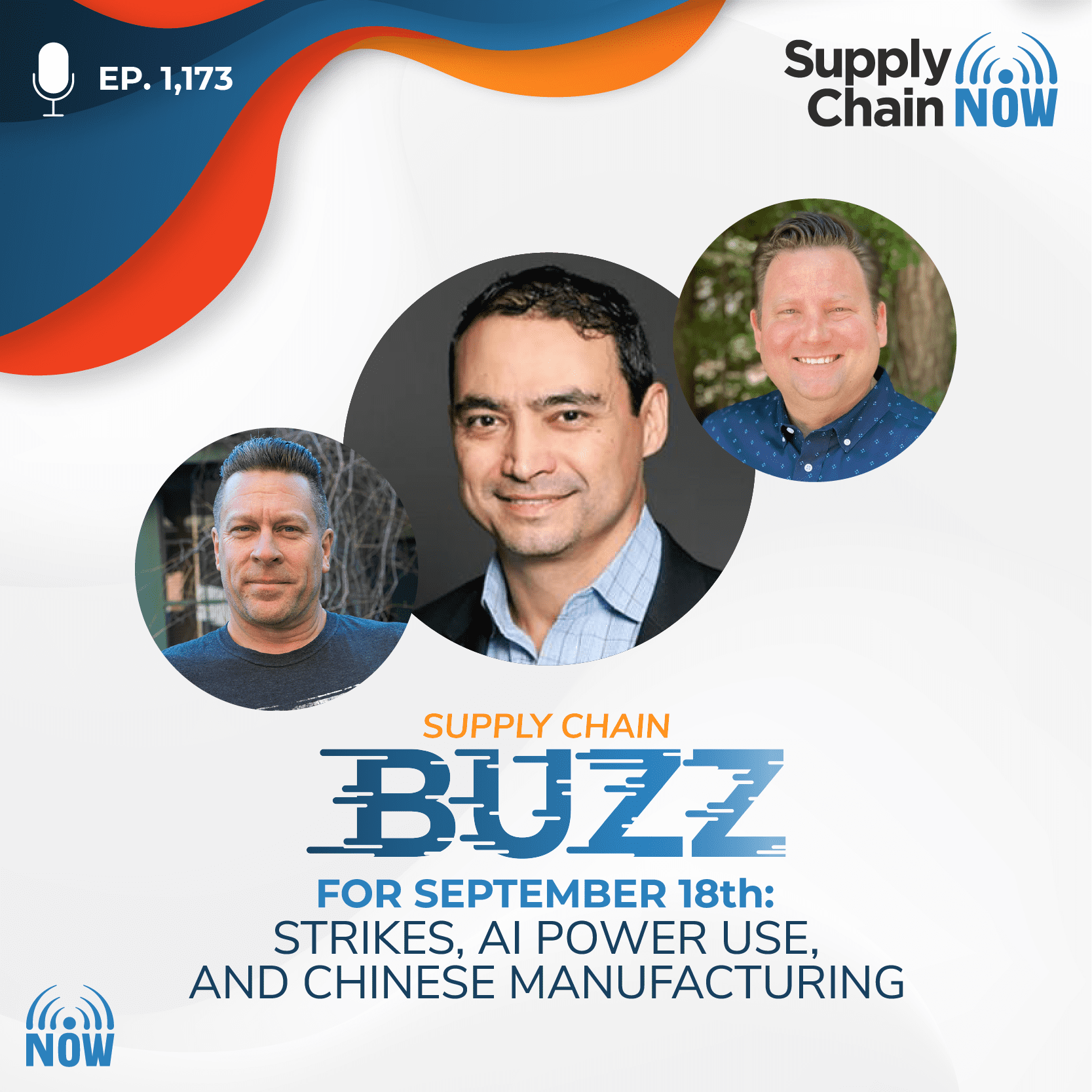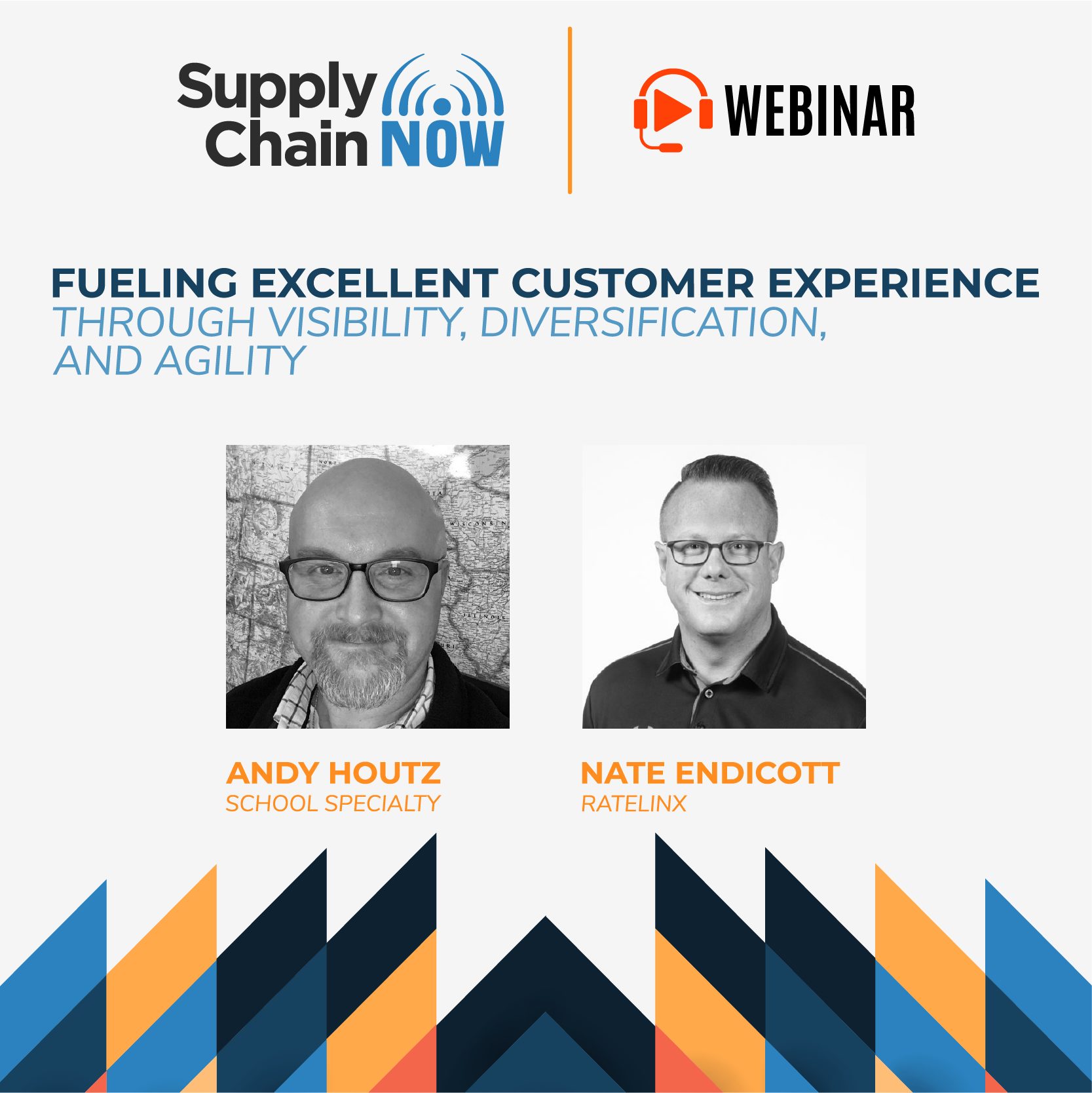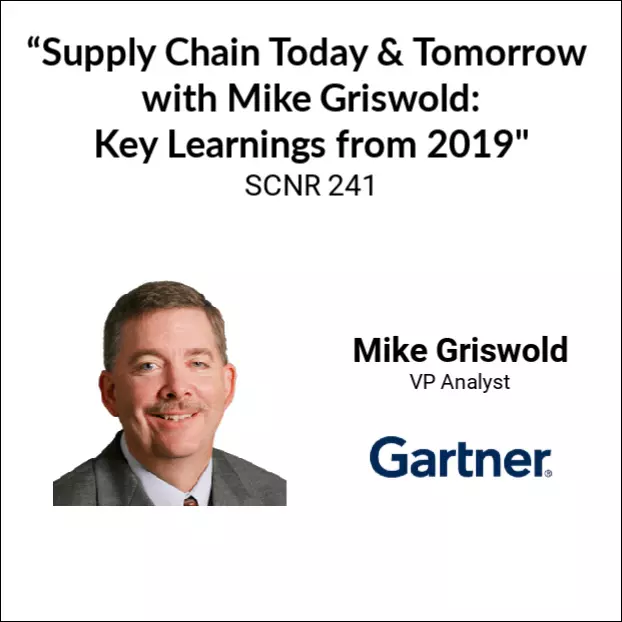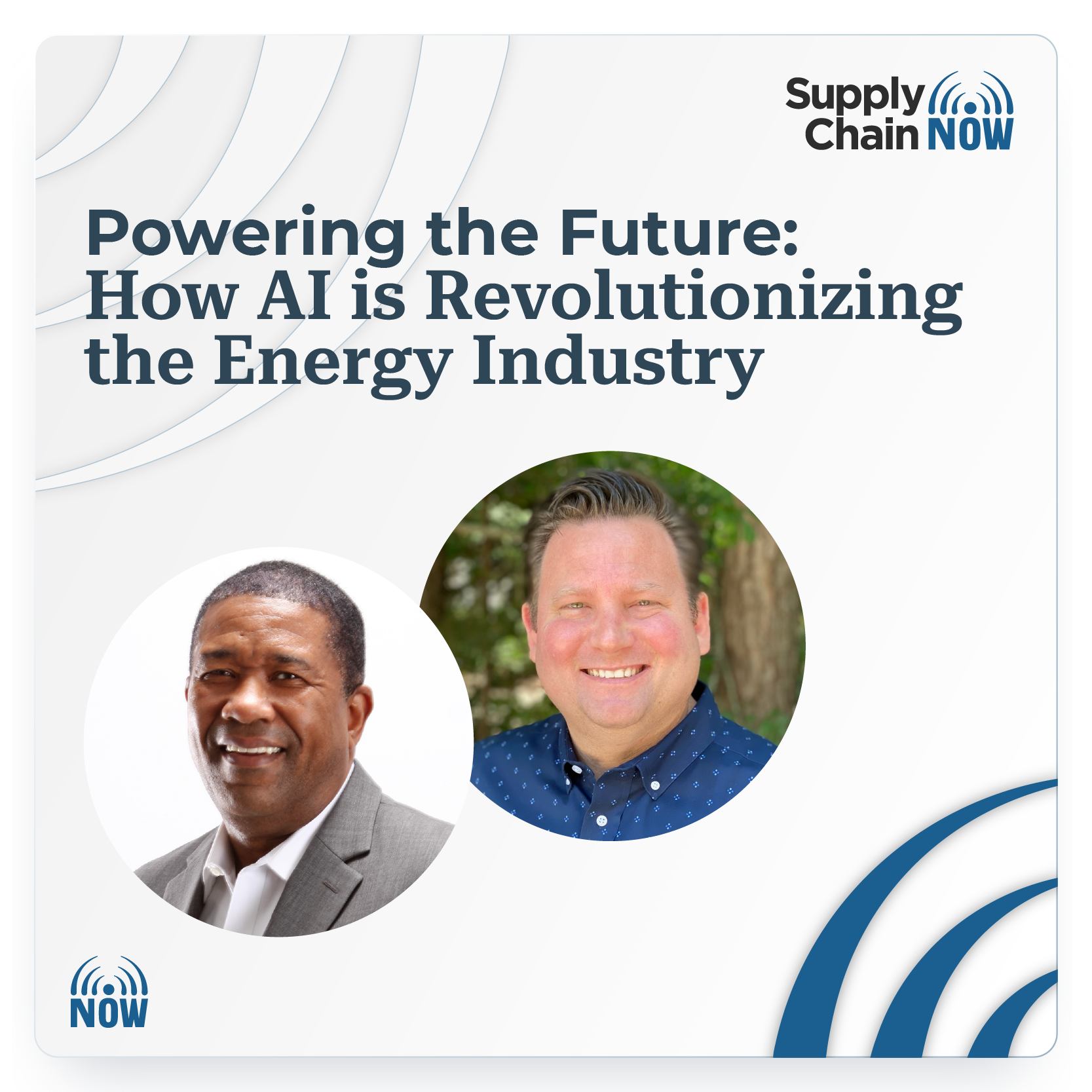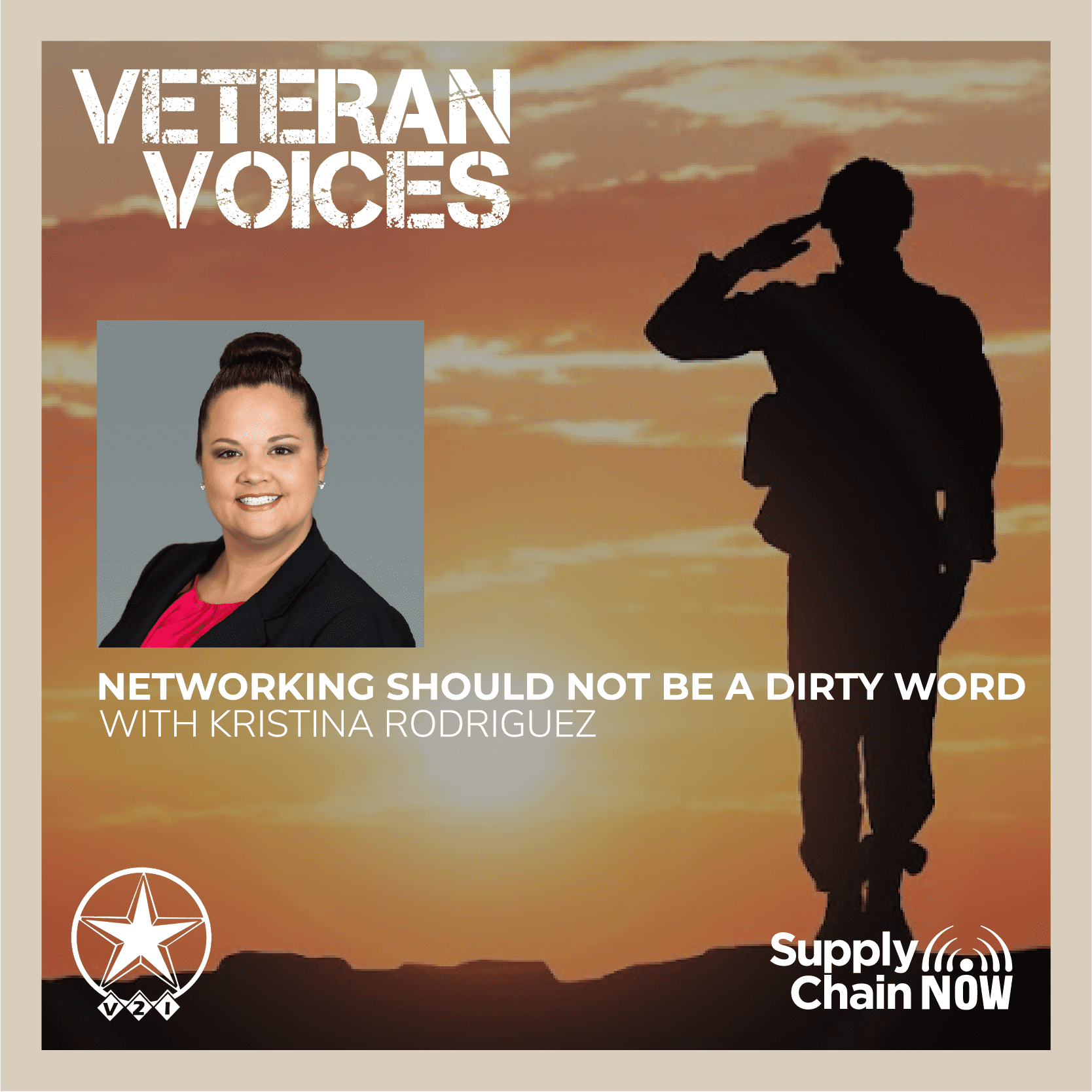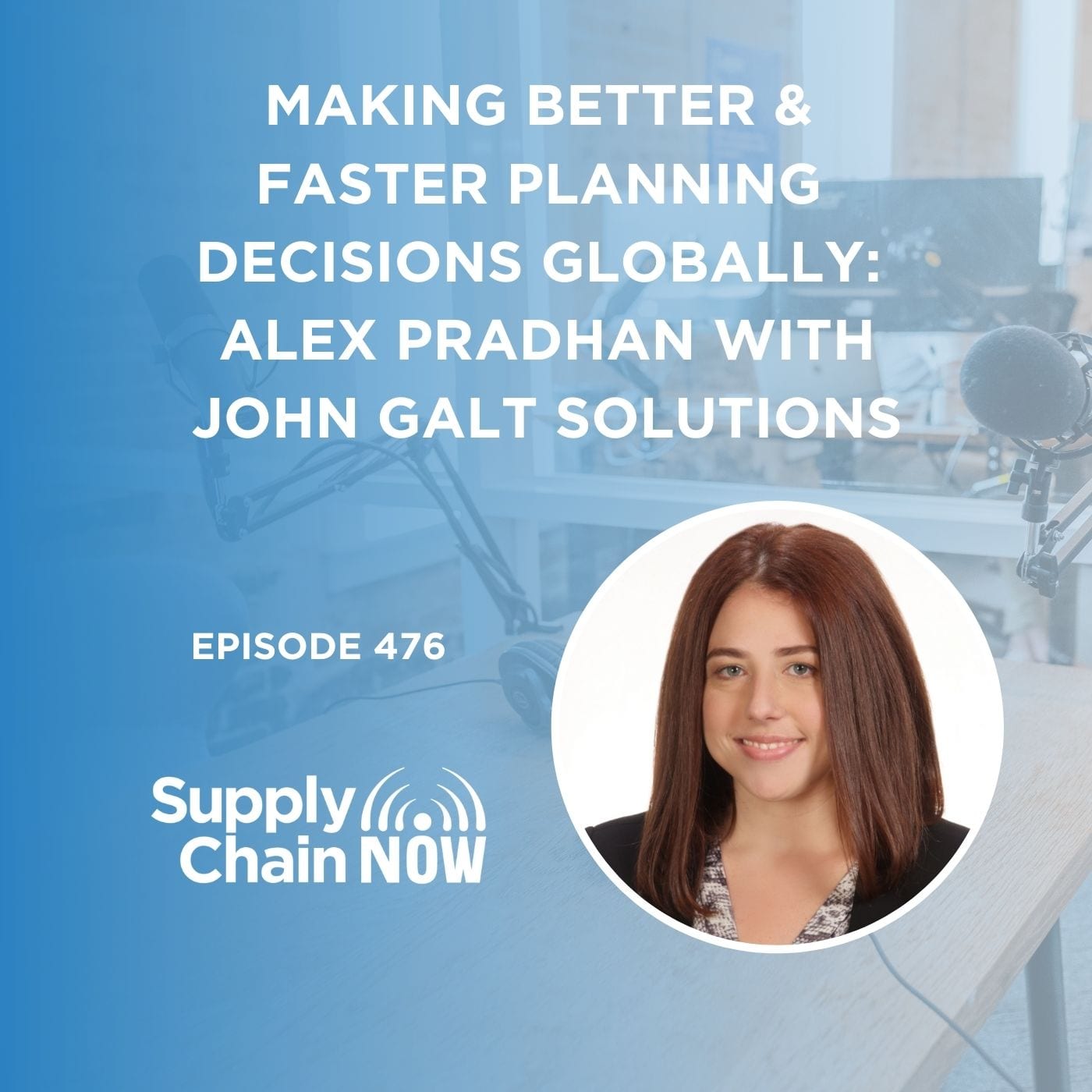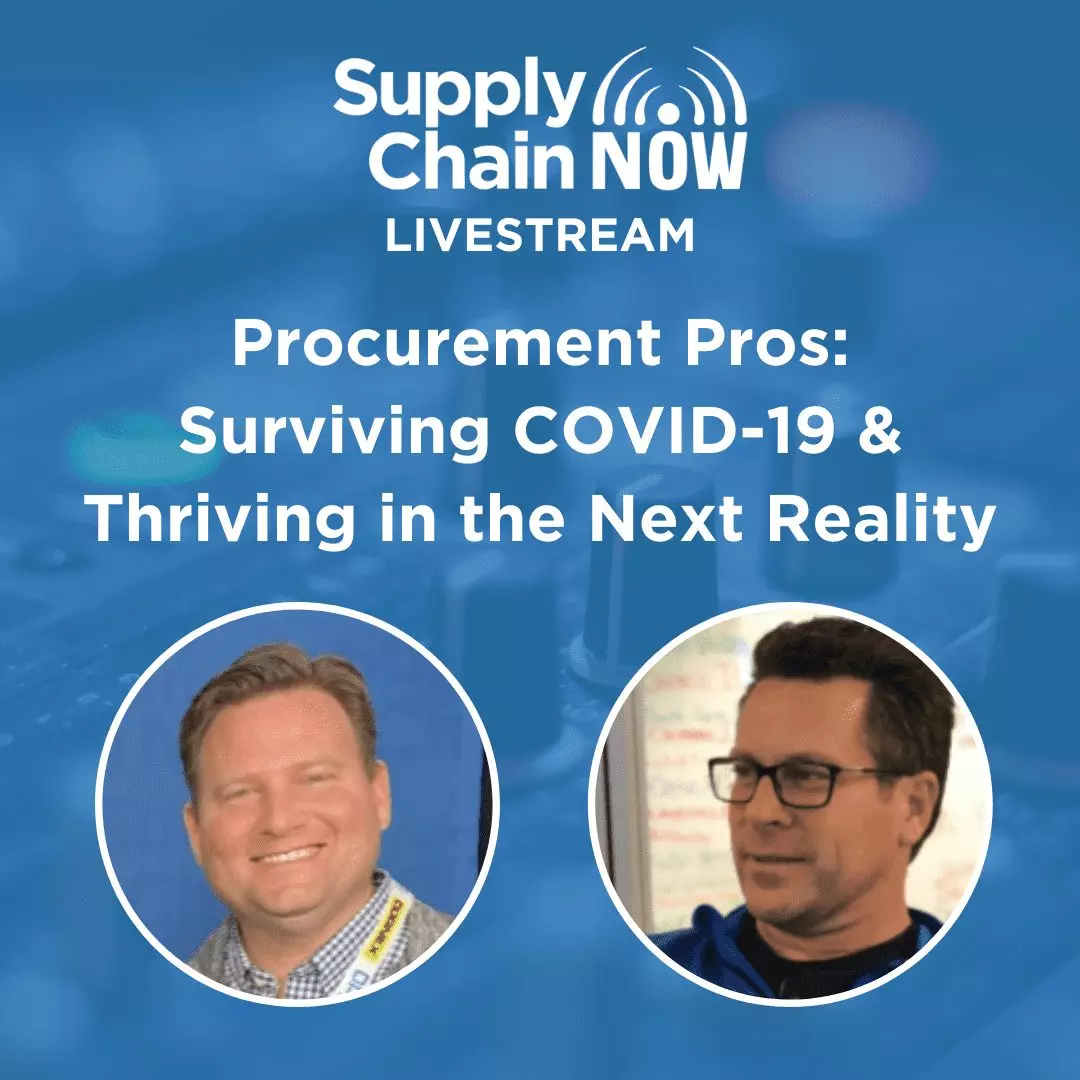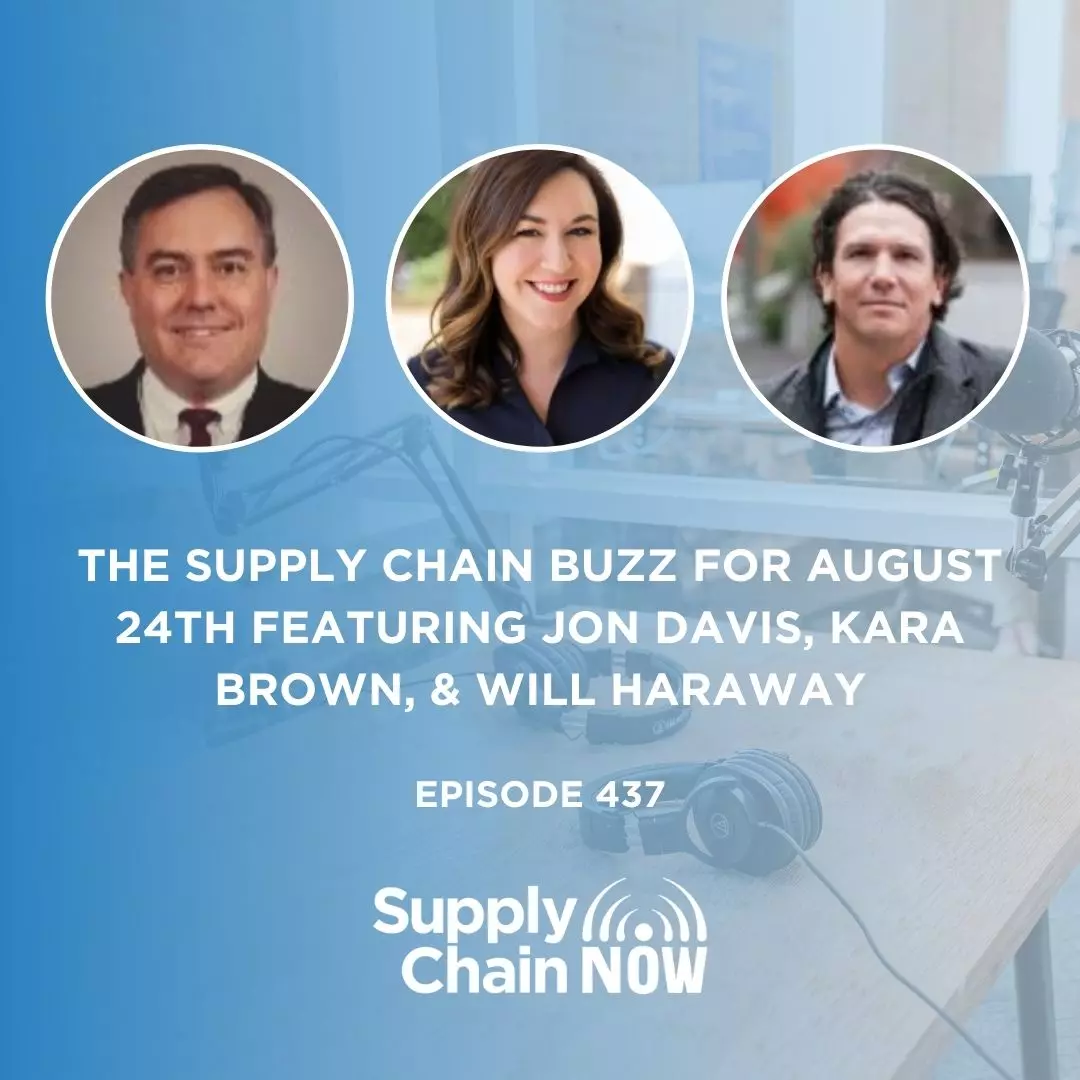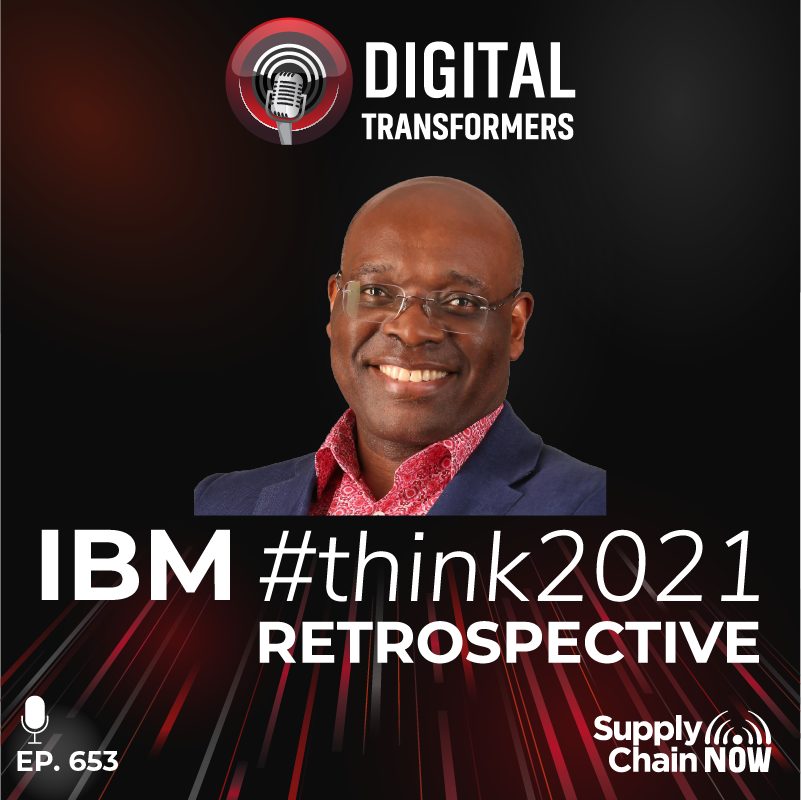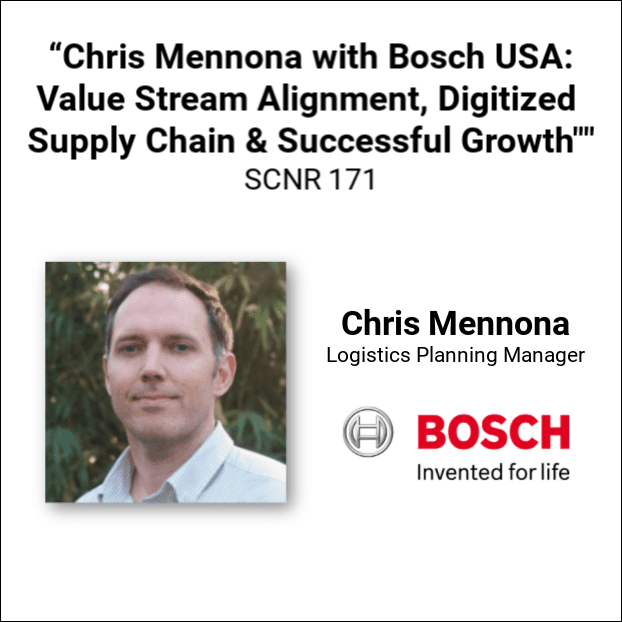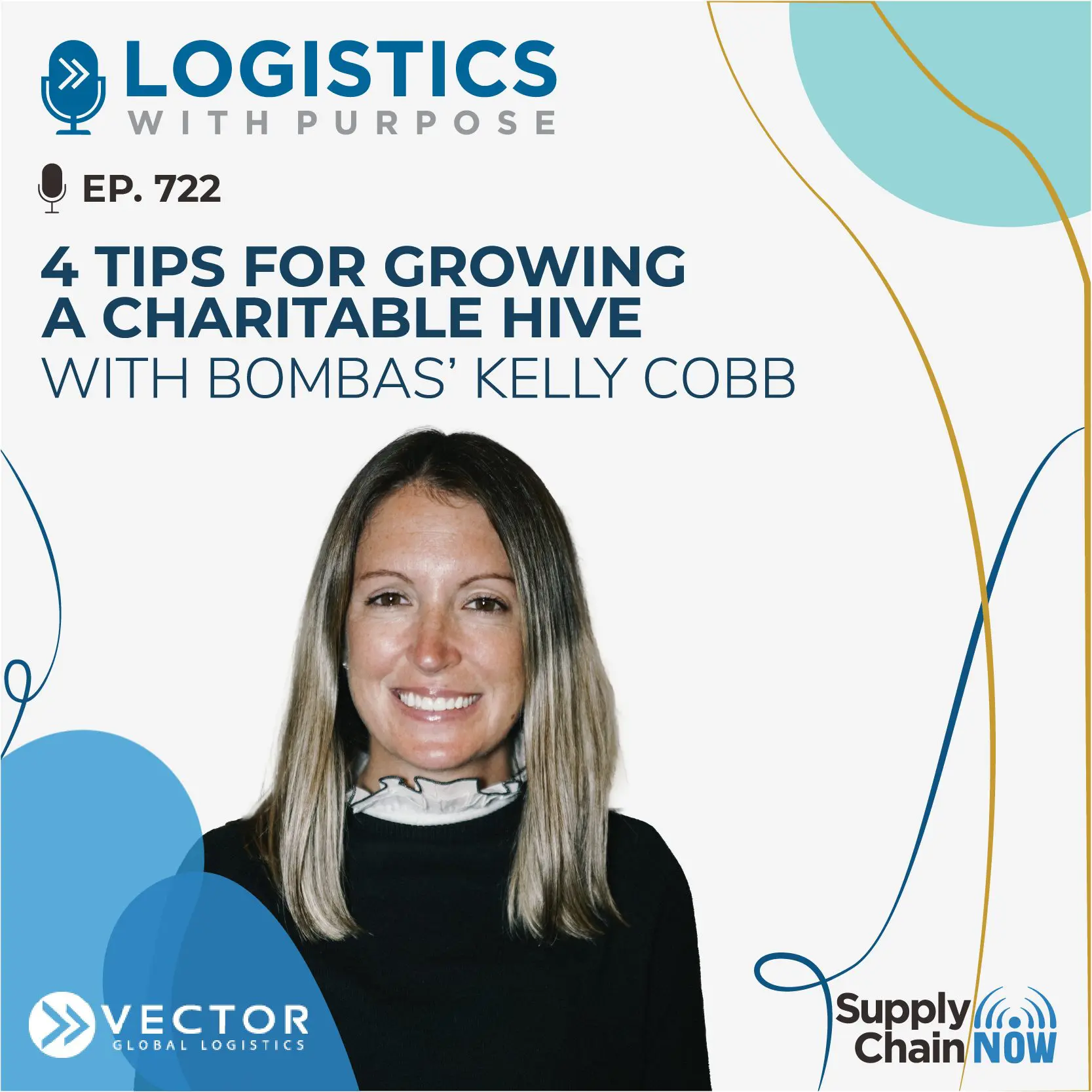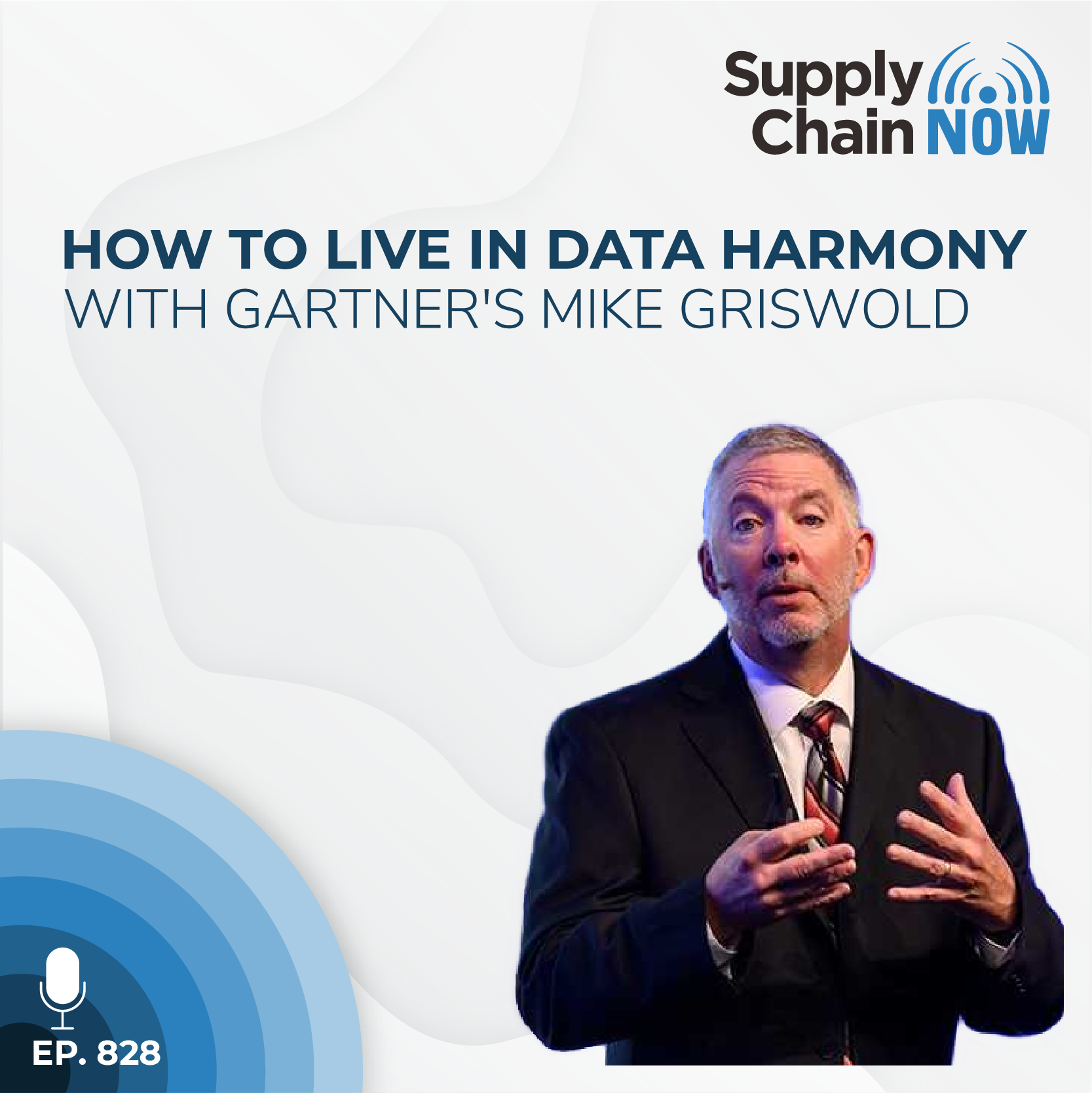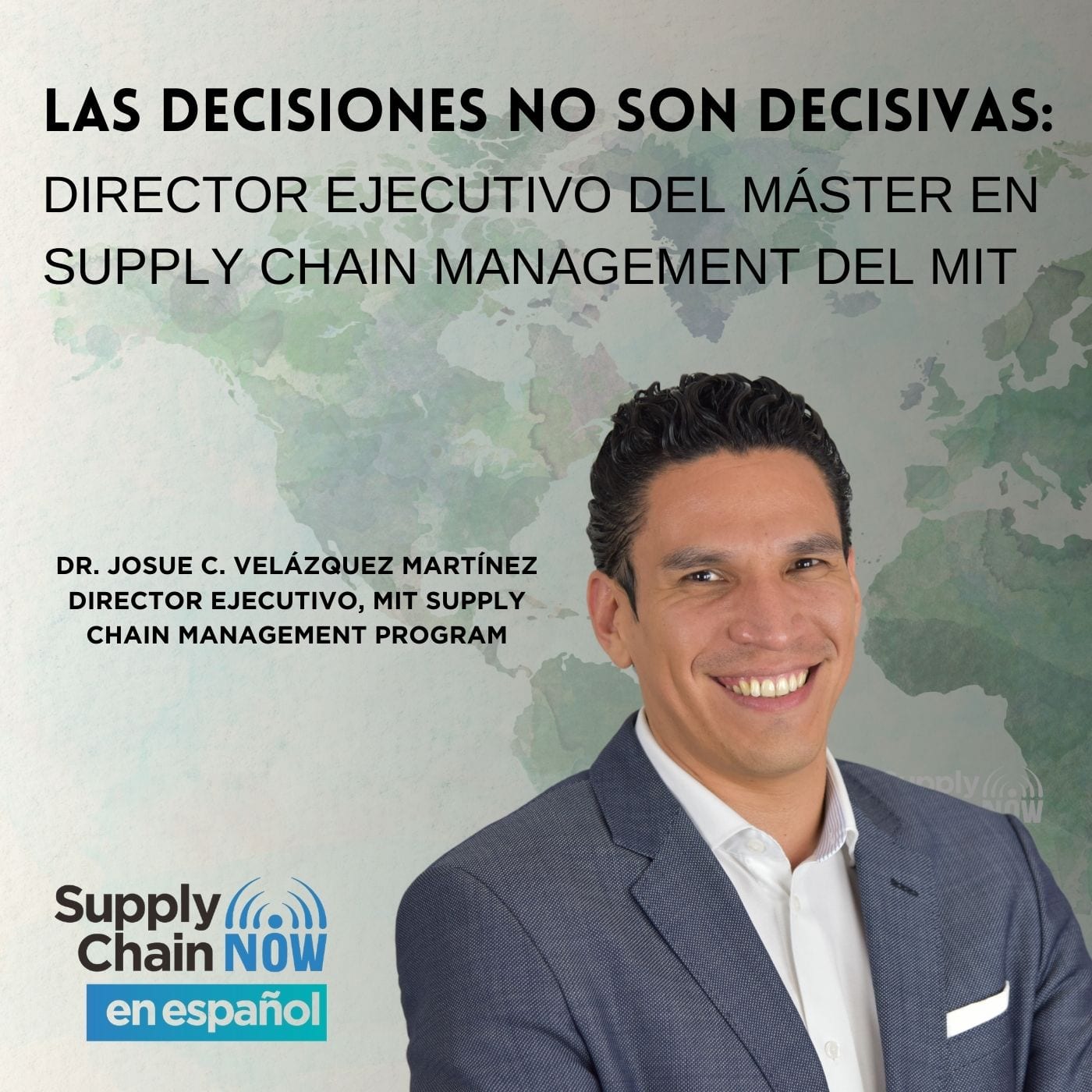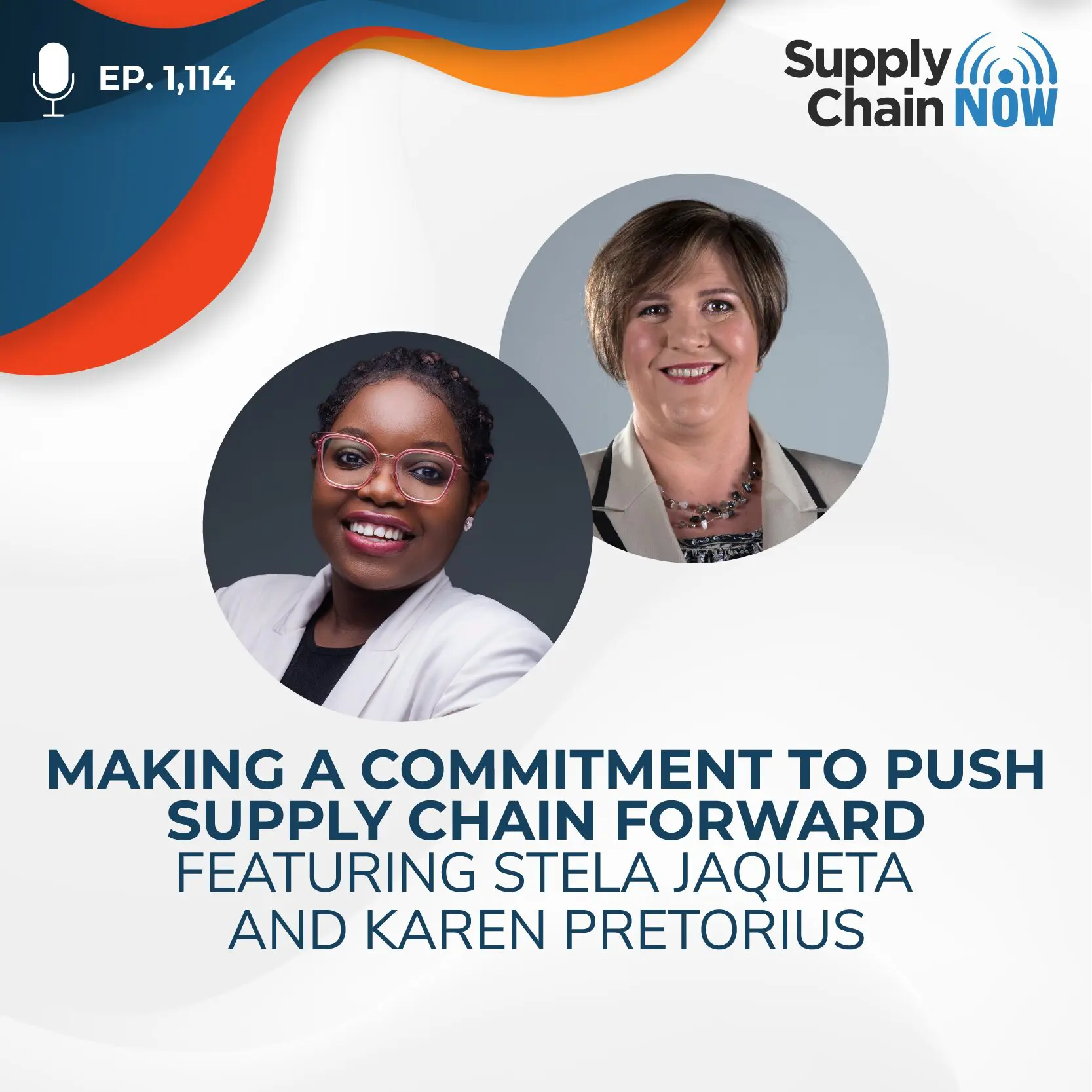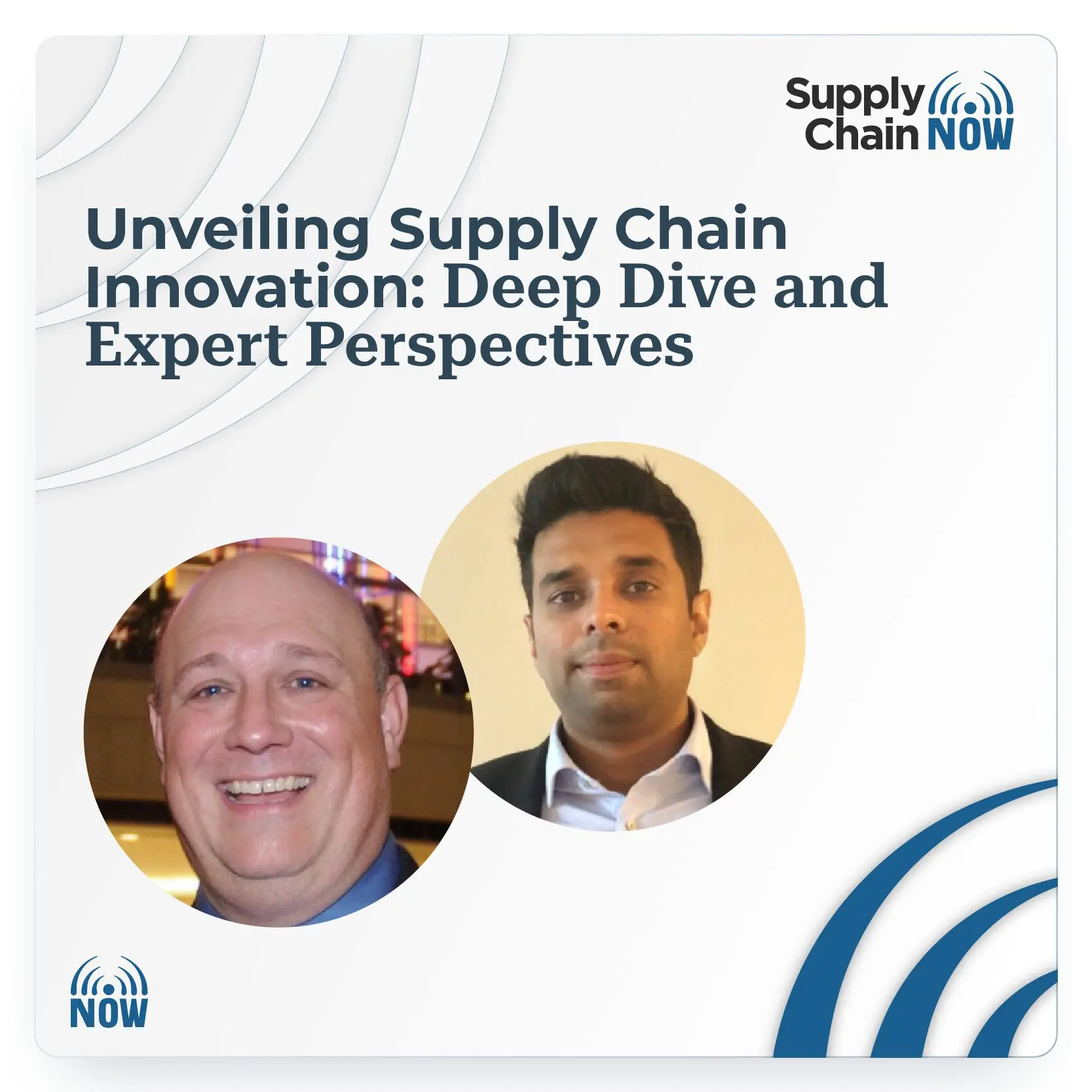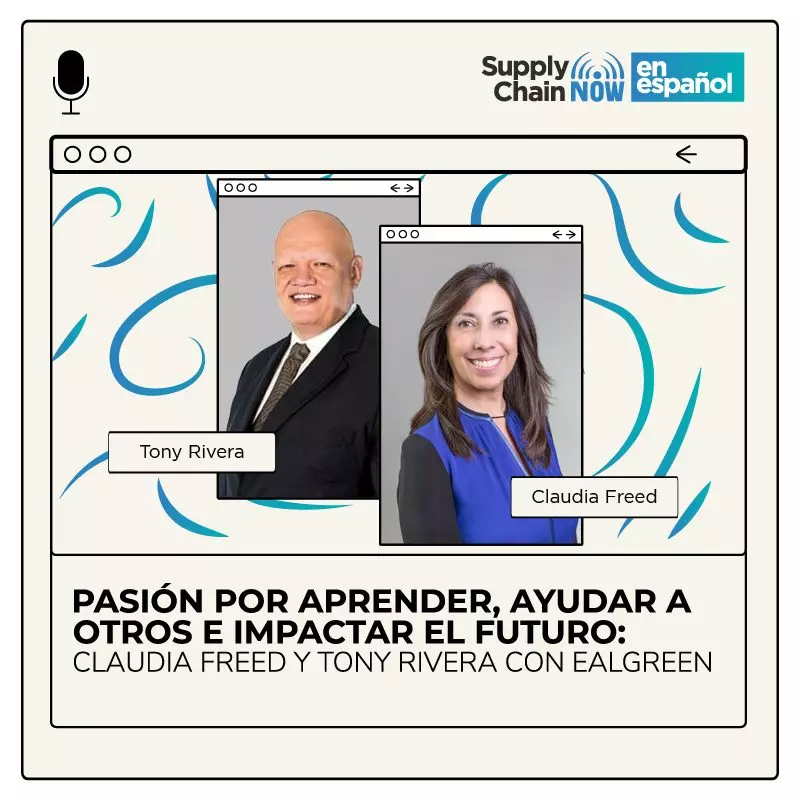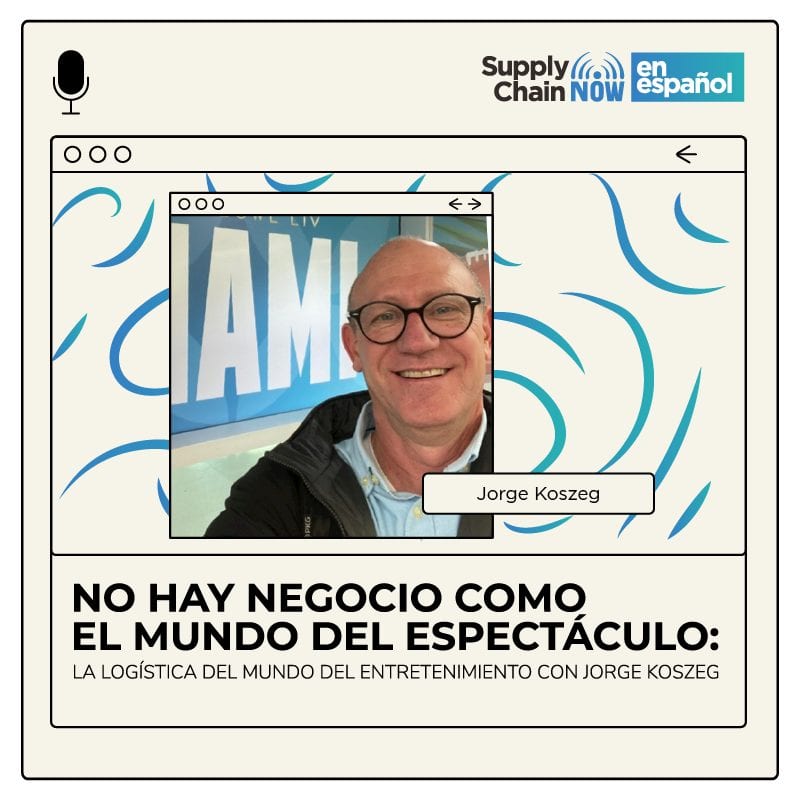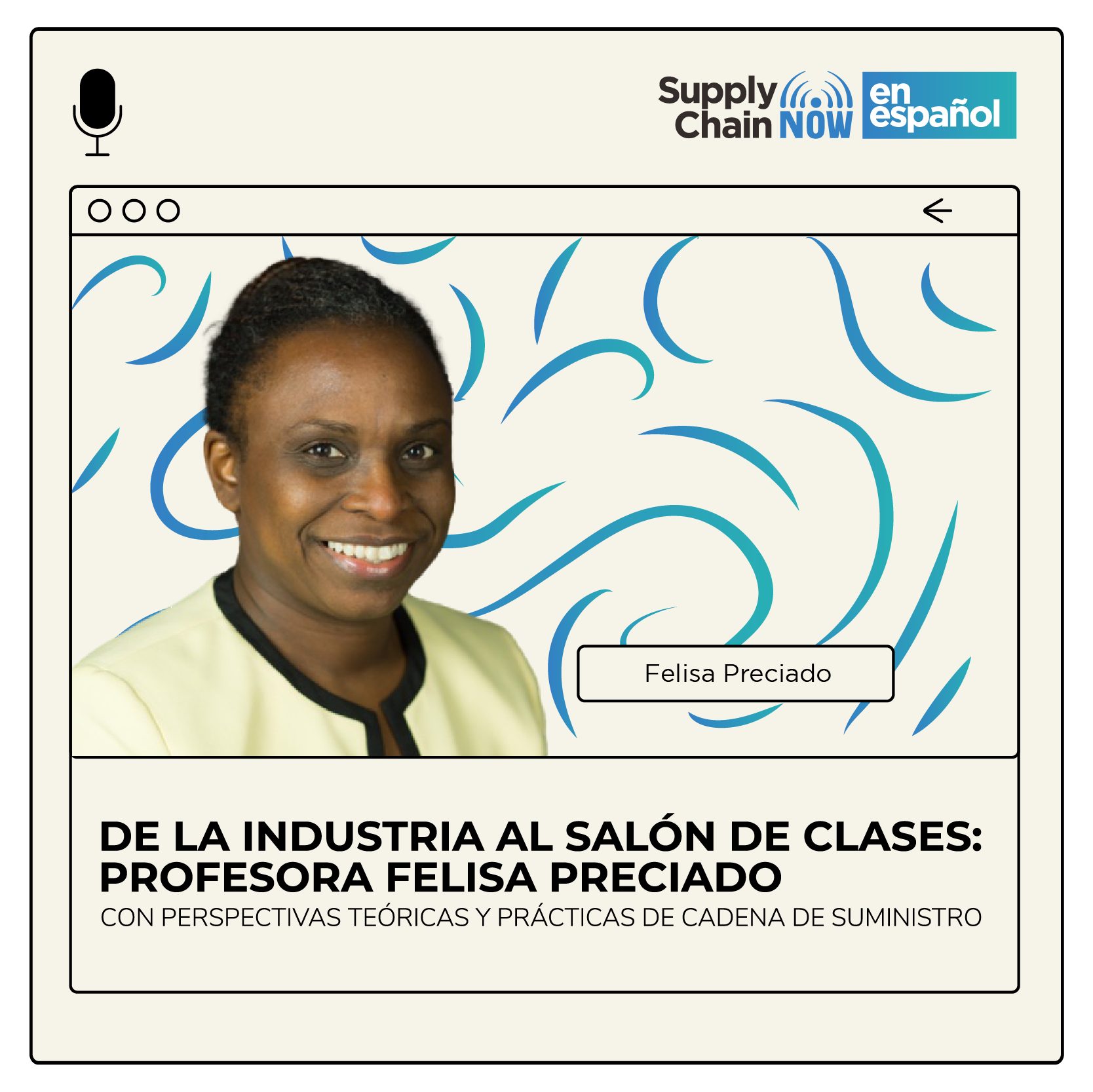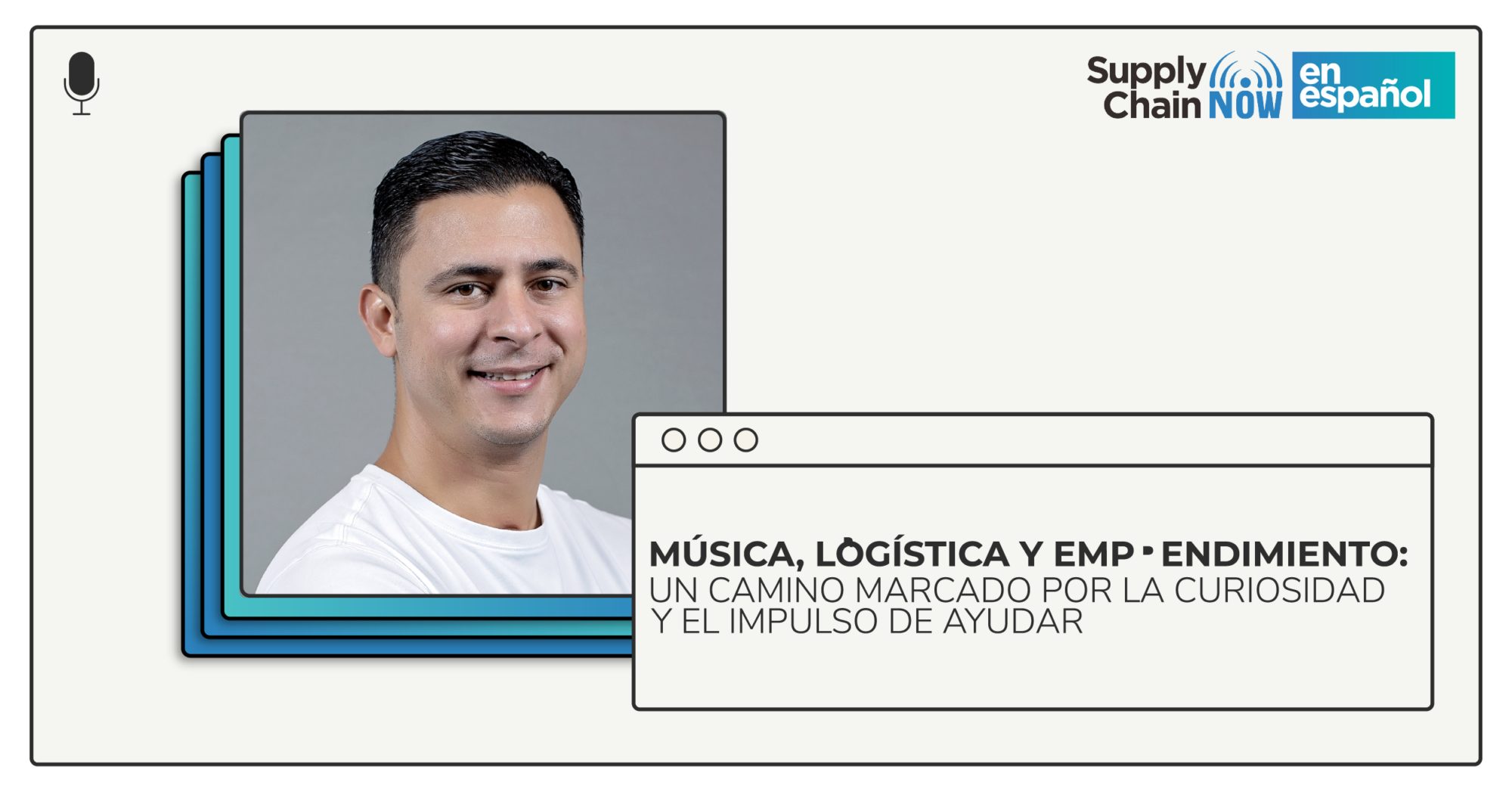
Se vale soñar, sin desenfocarse y siempre siendo fiel a los principios y valores de cada uno.
-Farouk Gomati
Resumen del Episodio
En este episodio de Supply Chain Now En Español, escuche al presentador Enrique Alvarez hablar con Farouk Gomati un musíco profesional que por su curiosidad y por sus ganas de ayudar, se andentra en el mundo de la logística y el empredimiento.
Farouk es el actual Vice Presidente en Interworld Freight y fundador de la compañía Linkoast. Conoce su inspiradora historia en donde la gratitud fue clave para lograr el éxito en su vida personal y profesional.
Transcripción en Español
[00:00:01] Hola.
[00:00:02] Bienvenidos a Supply Chain Now en español Transmitiendo para Latinoamérica y el mundo entero. Supply Chain Now presenta lo mejor en todo lo relacionado con la logística. Mejores prácticas, tecnologías, organizaciones, retos y oportunidades. Todo esto y más a través de las historias y experiencias de las personas que hacen de la logística la principal actividad comercial y de mayor impacto en nuestras vidas. Y ahora con ustedes, nuestro anfitrión.
[00:00:33] Muy buenos días, Mi nombre es Enrique Álvarez y les doy la más grata bienvenida a otro episodio más de Supply Chain Now en español. Hoy tengo conmigo a un buen amigo, este Faruq. Faruq. ¿Como estás? Muy buenos días. ¿Cómo has estado? Enrique. Muy bien, gracias. Es un honor estar aquí con ustedes hoy y poder compartir. Muy contento. Muy contento de esta oportunidad tan bonita. El placer es todo mío. Y, bueno, Faruq es vicepresidente de Inter World Freight. Él está basado en Miami. Y, bueno, tiene una historia muy peculiar de cómo llegó a liderazgo que tiene ahora este entonces. ¿No? Muchas gracias por aceptar nuestra invitación. Es un gusto tenerte con nosotros. Y bueno, para empezar, pues dinos un poco más de ti, que es Cómo fue tu infancia. ¿Cuéntanos de dónde eres, dónde creciste? Claro que sí, Enrique. Bueno, aprovecho antes de comenzar a saludar a todos los oyentes. ¿Espero que este sea un tiempo que construya para todos, verdad? Y que nuestra historia sea de inspiración para la gente, para emprendedores, para empresarios y pues nada más bonito que compartir de de la historia de cada uno. Entonces comienzo, comienzo diciendo yo nací en Barranquilla, Colombia. Nací en Colombia, de un padre francés, slash tunecino y de una madre colombiana, pero libanesa también. Entonces siempre hago chistes que por error nací en Colombia, pero bueno, nací en Colombia, en Barranquilla, donde donde hice mi escuela y a los 17 años me fui a vivir a Alemania, donde viví un aproximadamente unos ocho años y luego ya pasé a este lado del mundo a Estados Unidos.
[00:02:27] Llegué a Boston dos años y bueno, ya y ya tengo aproximadamente 12 años en Miami. Para lo bueno que es matemática, ya saben cuántos años tengo. ¿Lo pusiste difícil para la mayoría, pero no una experiencia sumamente internacional, no? Y bueno, de hecho, antes de que llegaras al mundo creo que es una historia muy interesante la que tu papá tuvo para llegar a Colombia. Volviendo a tu pasado, volviendo otra vez a Colombia, nos comparten alguna experiencia de la infancia que te acuerdes a lo mejor con cariño, algo que te que te marcó de cierta manera. Sí, mira que puedo. Puedo recordar claramente que desde pequeño, a pesar de que no crecí con mi papá, mi papá vivía en Bogotá y yo vivía en Barranquilla, nos veíamos mucho, bueno, mucho. Será unas tres veces al año que podía compartir con él y entonces yo crecí con esta figura de mi papá, que siempre, siempre estaba vestido de saco y corbata, cierto, y que por su trabajo viajaba mucho. Entonces, desde muy temprana edad, nació dentro de mí como una admiración por por los viajes, por los idiomas y esa figura que yo me mantuve siempre de ese del típico business man. ¿Cierto? Claro que entonces no fue tal como una experiencia que de pronto, que de pronto me marcó algo puntual. Pero esa imagen siempre fue hasta el día de hoy.
[00:04:07] ¿Vive fuertemente dentro de mí y fue el reflejo de ese papá que yo veía que viajaba y siempre estaba muy bien vestido y de alguna manera dije yo quiero hacer así que cuando sea grande no? Y es una imagen bueno, una generación muy, muy elegante, muy bien vestida. Me acuerdo con mi papá también cuando ibas al aeropuerto, cuando te ibas a subir al primer vuelo que fuimos a lo mejor a Dallas o a algún lugar así. Tenías que vestirte bien para ir al avión. Ahora, digo, la ha cambiado muchísimo desde aquella época. Sí, sí, sí, sí, tal cual, tal cual. Entonces eso, eso me marcó, eso me marcó y me me definitivamente lo que lo que hoy en día soy yo creo que en gran parte fue por inspiración de esa figura paterna de. De que del que viaja, del que habla idiomas, de. Del aventurero. Porque creo que le hice un tipo de copypaste a la historia de mi papá. Entonces. Sí, bueno, ahorita nos vas a platicar un poco más de esa historia, que la verdad es sumamente inspiracional y es bastante bastante divertida también en ciertos, en cierta forma. Entonces sí, sí, cuéntanos un poco. ¿Volviendo a Colombia, hay alguna otra cosa? A lo mejor alguna enseñanza, algo que te ayudó a impulsar, porque una cosa es que vieras el ejemplo y otra cosa es también lanzarte a a tener ese ánimo de emprendedor, esas ganas de aventurarte por el mundo. ¿Hay algo que recuerdes más de aquellos primeros años de tu infancia en Colombia? ¿Mira, yo pienso que algo que que que como que marcó el comienzo de de esa vida emprendedora fue yo desde pequeño, desde los nueve años empecé a hacer música en Colombia, clases de música en la escuela como cualquier otro niño, y entonces organizamos un grupo musical en la escuela y ahí empezamos a tocar bastante en los eventos de la escuela y empezábamos a tocar en eventos de la ciudad y ahí vamos siendo reconocidos localmente, verdad? Y Pero era simplemente un hobby, algo, algo que me gustaba hacer.
[00:06:23] ¿Qué tocabas tu? La percusión, tambores. Tú eras el baterista del grupo, el percusionista. Todo lo que tiene que ver con algo que se toca, con la diferencia a las manos. Cuando la batuta es la la batería es la que los drums, los que ves que la persona se sienta y tocas y que es un instrumento de percusión también. Pero entonces está el resto de la percusión, que son las congas, los timbales y todo un mundo de de instrumentos autóctonos de cada país, de cada región. Cierto, entonces yo soy percusionista y mira lo que marcó de verdad fuertemente mi vida fue cuando a los 16 años o 15, 15, 16 años, yo me fui a Alemania con ese grupo. Ah, qué bien tocar. ¿Entonces tu primer viaje internacional fue por la música? Básicamente sí, pero fue a tocar en en los colegios. O sea, fue. No fue que me iba de gira, fue que decidimos irnos un mes a tocar y.
[00:07:29] Y en ese mes nos ganamos una beca otorgada por el gobierno alemán. Pero yo tenía 15, 16 años y yo pretendía estudiar negocios. Entonces fue un momento donde donde eso definitivamente marcó mi destino, porque se me presentó una oportunidad de irme a Alemania a estudiar con mis mejores amigos y fue un momento de decisiones fuerte, de decir bueno, voy a emprender, voy a me voy a ir. Y bueno, ahí, ahí comenzó una nueva vida para mí y no me arrepiento en lo absoluto. Fue un poco difícil, fue un poco difícil. ¿La familia me dijo cómo vas a hacer eso? ¿Cómo te vas a ir a estudiar música? Pero bueno, lo hice, seguí mis sueños. O sea, creo que ese fue el aprendizaje número uno ahí que fui obediente a la pasión y a seguir mis sueños, sabiendo que podía equivocarme, pero tenía todavía la edad suficiente para darme el lujo de equivocarme y volver a comenzar luego. Y bueno, y finalmente no me equivoqué. Fue definitivamente unos años maravillosos allá en Alemania. Que bien. Y bueno, como ya se imaginarán la gente que nos está escuchando ahorita, bueno, vamos a tener que caminar todo este camino de la música, la logística paso a paso, que es realmente dimensionalmente separado. Yo me imagino un mundo de la música muy artístico, muy de sentimiento, muy de impulso, y luego la parte logística es un poco mucho más fría, mucho más calculadora.
[00:08:58] Entonces cuéntanos un poco más. ¿Entonces estuviste en Alemania y qué pasó después? Sí, sí, Enrique yo llegué a Alemania con He cumplido los 17 años, muy jovencito me fui con tenía un quinteto de jazz y llegué a Alemania a estudiar en el conservatorio y así lo hice. Y la verdad que gracias a Dios me fue muy bien en todos estos años. Allá en Alemania fueron, fueron en total unos ocho años que viví por allá. Yo había estudiado en una escuela alemana en Colombia, entonces ya sabía un poco el idioma, aunque lógicamente me tocó llegar a perfeccionarlo. Y bueno, qué te puedo decir, una vivencias espectaculares. Crecí allá, prácticamente me convertí en un hombre allá y llegué con 17 añitos solo a Europa y bueno y le tocaba a uno ya pagar la renta, lavar la ropa y adquirir responsabilidades que de haberme quedado en Colombia muy seguramente no hubiera tenido que hacer hasta hasta un par. Años después. Es cierto. Entonces yo creo que eso me aceleró un poco en madurar. Cierto. Pero fue. Fue. Fue un tiempo muy bonito. Estuve. Estuve allá ocho años. Y luego, em. Para ser un poco fast forward. Em. Después de haber ya estado tocando con los artistas más reconocidos allá en Alemania. Y bueno, como dije, perdón que te interrumpa, pero bueno, está interesante esta parte. Tenías. Dijiste un quinteto de jazz. ¿Tenían algún nombre en particular? ¿O como se llamaba el Latin Sampling? ¿Latin sampling? O sea, la mayoría latinos éramos todos de la escuela Jalo, todos eran de kinder, los mismos que iban tocando.
[00:10:45] Ah, qué bien. El luego de la escuela. Entonces era un sueño. ¿Estábamos entre los mejores cinco amigos viviendo un sueño en Alemania y con quien? Que te recuerdes con quien llegaron a tocar. ¿Cuál fue? Digamos algo que fue particular para ti. Algo dijo que hay varios, pero alguno que. Que nos puedas compartir. Que te. Que mira YouTube. Gracias a Dios tuve la oportunidad de tocar con muchísimos artistas más en la parte de jazz, más en la parte de jazz. Ya yo después individualmente no, no con mi grupo, sino que con otros artistas grabando sus percusiones y todo eso, eh. Hay dos personas en especial en las cuales marcaron bastante mi mi vida, un poco musical. Uno de ellos se llama Joe Gallardo. Gallardo es un trombonista mexicano, americano, texano, que se estableció en Alemania desde hace muchos años. Él fue con el Navy a Alemania y se volvió uno de los trombonista más reconocidos allá en Alemania de jazz y de jazz latino. Entonces, justo cuando nosotros llegamos a Alemania, él nos apadrinó de cierta manera y nos tomó de la mano, hizo las introducciones que había que hacer, nos presentó y nos puso, nos dio cierto exposure, cierto y y bueno, y de ahí nuestra carrera allá. Solamente subía y subía y luego. Y luego otra que fue muy especial para mí. A mí me encanta la música brasilera, me fascina la música brasilera.
[00:12:28] Si un día te montas en el coche conmigo, va a sonar música brasilera porque la escucho todos los días y tuve la linda oportunidad de hacer una gira con un cantante brasilero que se llama John Bosco y John Bosco es uno de los cantantes de bossa nova. Más, más es una leyenda. Entonces el hecho de poder, de poder, de poder compartir con él unas dos semanas, día y noche, fue definitivamente algo que me llenó mucho, hasta el punto de tener una vez culminada la gira con él, fue que tomé la decisión de decir bueno, mi tiempo en Alemania se acaba o me voy a vivir a Brasil o me voy a vivir a los Estados Unidos. Y ahí fue que entonces terminé, terminé otra, otra gran decisión en tu vida. Ahora tenía que hubiera resultado en una vida totalmente diferente, me imagino, totalmente diferente. Qué interesante, qué interesante. Y vamos a ver si me la pasas. Luego ponemos una liga a lo mejor de alguna de la música, tanto de Johannes Bosco a este como de Jo Gallardo, para que la tengamos también ahí en la entrevista. Claro, claro que sí. Te pasaré, ahorita te paso. Oye, este bueno y entonces me imagino decides a Estados Unidos, pero cuéntanos un poco más sobre esa decisión. ¿Y bueno, te alejas un poco de la música o era todavía la esperanza? Yo era la música. Al final de los ocho años en Alemania ya yo estaba graduado y ya yo vivía de la música, cierto, vivía de las giras, giraba por toda Europa via gira por Estados Unidos, por África, por gira por todas partes, con muchos artistas.
[00:14:06] Em Y en una ocasión me enteré que venía una universidad de música que creo que es de las más reconocidas del mundo, que se llama Berklee en Boston, Berklee College of Music, que estaban audicionando personas para dar, para dar becas. Y yo me me apunté por apuntarme, fue simplemente por apuntarme. Venían cerca de la casa donde yo vivía y para mi sorpresa yo me gané una beca completa para para Boston. Ese fue el punto donde dije bueno, voy a vender todo lo que tengo acá y me voy para Boston, porque estudiar en Berkeley es como el sueño de cualquier músico. Berkeley es ese lugar donde todos quieren ir y es bastante costoso y es algo que yo no me podía pagar. Cierto. Y al momento. Que me dieron un Food visions, pues no la tuve que pensar mucho y ahí vendí todo, vendí mi carro y me fui. Entonces me fui entonces a vivir a Boston. Luego que llegué a Boston, yo tenía una noviecita que vivía en Miami. En Miami ya éramos novios a la distancia y ya estando en Boston estábamos más cerca. Y ahí es donde empieza a entrar todo el tema de la logística. Pero, pero estuve hacer un fast forward, estuve dos años en Boston y ahí empecé a girar con un cantante colombiano con el cual estuve de gira por muchos años, por unos seis, siete años y donde también ganamos, ganamos Grammys, o sea, giramos por todo centro, Sudamérica, el Caribe, Estados Unidos.
[00:15:50] Y como esa gira era muy, me exigía estar mucho tiempo de viaje. Ahí decidí terminar Boston y ya mudarme a Miami de tal manera que Miami fuera un pop claro, más cerca de los conciertos y estaba cerca a mi novia. Hoy en día es mi esposa y la madre de mis hijos. Sí, sí, muy, muy similar. A lo mejor un poco a lo que le pasó a tu papá, como decías al principio de la entrevista, no este. Y regresas a Miami y ahí es donde te empiezas a dar cuenta de la de la logística, que creo que es una una historia también muy interesante. Cuéntanos en qué momento pasas del del músico reconocido que ha viajado por todo el mundo hasta un líder exitoso en el ámbito logístico. ¿Ahí cómo te diste cuenta de esa oportunidad en la logística? Bueno, mire que una vez ya estaba en Miami, yo empiezo a conversar con mi suegro, que ha sido el fundador de esta compañía hace 30 años, y yo le dije a él John, yo estoy girando mucho, es soy músico en mi vida, es lo que seguiré haciendo toda la vida, pero hay días que estoy cuatro o cinco días en Miami, donde esperando el próximo viaje para la próxima gira.
[00:17:06] Y yo le dije mira, a mí siempre me ha gustado ser una persona. Yo soy muy curioso, me gusta aprender de todo, me gusta entender el porqué de las cosas y le pregunté con mucho respeto si estaba bien con él, que yo viniera a la oficina, especialmente a la bodega para empezar, para ver cómo se recibía la carga, cómo se despachaba la carga. Algo nuevo. ¿Claro, Siempre me ha gustado vivir en un aprendizaje constante, cierto? Entonces él fue la verdad muy, muy bueno, en el sentido de que me lo permitió hacer. Y así comencé. Empecé en la bodega con tenis, sudando, con la pantaloneta puesta y empezando a aprender cómo se recibe carga en un almacén, cómo se mide, cómo se pesa la importancia de los documentos de de tener información correcta. ¿Y ahí yo empecé a darme cuenta de oportunidades y empezaba a preguntar y por qué están haciendo esto así y no así? ¿Y al de El Montacargas le preguntaba y ese para el que llevas para qué país va? Y y. Y uno me decía no, yo no sé, yo estoy moviendo el pallet, porque eso fue lo que me dijeron. Y yo decía no, pero no puedes hacer eso, tienes que, tienes que entenderlo, tienes que, tienes que encontrarle un sentido a todo lo que haces y. Y bueno, y así empecé y mientras tanto me iba de gira, regresaba, me iba de gira, regresaba. Ya luego de pasar varios meses en la bodega, tuve la oportunidad de sentarme en la oficina y aprender de operaciones.
[00:18:39] Cierto, todo esto como. Como un aprendizaje. Ya en ese momento todavía no veías muy claro esta. Probablemente no era nuevo. Estoy aprendiendo a vivir vida, la música. Exactamente. Tengo la linda oportunidad de aprender algo nuevo y lo voy a hacer. Pero no había ningún plan de de dedicarme a esto entonces. Y bueno, y así fue. Y luego se presentaron ciertas situaciones en mi vida. Creo que de pronto luego en la entrevista llegaremos a ese punto, pero te iba a preguntar antes de llegar a eso y bueno, me imagino un poco a qué te refieres, que también es una parte muy importante, obviamente de tu historia de vida. Creo que si eras un cliente muy importante de la nada realmente sin es que eso sea a final de cuentas, bueno, eres músico, te gusta estar con la gente, Me imagino que ahí te diste cuenta que también podías. Eres buen vendedor, eres muy buen vendedor. Míralo, es ese gancho, ese gancho a la logística. Ocurre o ocurre cuando yo estoy en una gira de unos dos dos meses en Latinoamérica y estoy en. Guay y me siento a conversar con uno de los organizadores del concierto. Nos invitaron a cenar en la noche a la banda. ¿Yo ahí giraba con un cantante cristiano muy reconocido que se llama Alex Campos y bueno, estaba con Alex y la banda cenando en un hotel muy bonito en Paraguay y me pongo yo a hablar con el organizador y le pregunto César Escobar, tengo tanto cariño? Todavía me acuerdo mucho de ese César.
[00:20:26] Cuéntame. ¿Y tú te dedicas a hacer conciertos? ¿Eres promotor de conciertos? Me dice. No, no, Faruk, esto yo lo hago de joven. Yo en realidad soy el director de Comercio exterior de la importadora más grande del Paraguay. Yo escuché dos palabras, escuché Importadoras y comercio exterior, menciona. Yo le dije a César Oye, qué casualidad, si supieras que yo también me dedico a lo mismo. Pero bueno. Y entonces me dice No te puedo creer que tú te dediques a la logística. Y yo sí, claro, sí, es otras veces. En realidad también lo hago. Y él me empieza a preguntar cosas que yo no tenía ni idea. Empieza a decirme Mira, tengo unos problemas con unos piojos. Dios mío, que es un lío en China, saliendo por. Por Shanghai, Beijing. Y son aproximadamente tantos Teus. Yo dije No, este tipo me cortó aquí. Yo ya no se va a dar cuenta que yo no sé nada. Y mi reacción natural fue alzar una copa de vino y brindar y decir César, mira, vamos, no hablemos de negocios en este momento, Disfrutemos, disfrutemos de esta cena y cuando yo regrese a Estados Unidos yo te vuelvo y te contacto. ¿Y bueno Enrique, bueno, la verdad es que regresé a Miami, pasé por la oficina de mi suegro y le dije a mi suegro mira, conocí a esta persona de interesante contacto, tengo un cliente y mi suegro me dice bueno y que le preguntaste? Y yo le dije no le pregunté nada porque se iba a dar cuenta que yo no sabía nada.
[00:22:10] Y ahí ese fue el día en que me abrieron mi email en la empresa y me dijo escríbele y pregúntale. Y bueno, el resultado de eso fue que al mes teníamos no menos de 150 contenedores en el agua de el trabajaba para la Tabacalera de Paraguay, entonces estábamos moviendo hojas de tabaco, los papeles para los cigarrillos, los filtros, las aromas, las cortadoras, los repuestos, las máquinas de la India, de la China, de Alemania, de Holanda, de Francia. Entonces eso para mí fue bueno. ¿Y además de eso, me gané una comisión, cierto? Entonces yo dije Sí, y es músico Oficialmente, todavía no estamos dedicados a la logística. Yo vivía en Boston. ¿Todavía tenías esta doble vida? Sí. No, no, yo vivía en Boston todavía. Y dije vendedor de logística. Y claro, yo pensé Esto es muy fácil. Yo creo que me tengo que dedicar a la logística. Bueno, claro, tengo que. Y bueno, creo que a la fecha, después de unos 11 o 12 años que eso ocurrió, ha sido sin el segundo o el tercer cliente más grande. ¿Que no, no es tan fácil como pensabas, verdad? Sí, sí, pero fue un gancho. Y ahí. Bueno, y ahí, como premio, me llevaron a una conferencia de una red de agentes que se llama El doble.
[00:23:39] Bucea David. Y ahí me llevaron como premio a haber cerrado esa cuenta y fui a Vietnam y allá empecé a conocer un poco más del tema de la agenciamiento y ahí pasaron cosas similares. Logré cerrar negocio con agentes sin saber de logística, simplemente por la empatía, por caer bien, por tener buena entrada y por generar confianza. Es cierto. Y bueno, ya, ya. Lo que pasó de ahí hasta ahora ha sido un camino largo. 12 años en esta industria solo recién hasta hace 989 años fue que decidí dedicarme 100% a esto y a poner la música un poco al lado. Cuéntanos. Excelente historia y la verdad digo, es la segunda vez que yo la escucho y cada vez es igual de emotiva y está igual de interesante este. Cuéntanos un poco y preséntanos ahora tu empresa Inter World Trade. Llevas 12 años, decías más o menos ocho oficialmente antes como doble agente entre músico y logística. Pero cuéntanos un poco de Inter World Trade, una empresa con no solo mucho éxito sino mucha tradición empezada hace mucho. Y bueno, me decías que incluso uno de los fundadores de la Doble S.A., la red de agentes más grandes de. Exactamente. Sí, bueno, te cuento. Inter World Freight es la empresa hoy en día por la empresa de la familia. ¿Cierto? Fue fundada hace 30 años e inicialmente se fundó en Colombia. Y luego rápidamente se abrió una sede en Estados Unidos para atender el volumen que ya se manejaba de Colombia.
[00:25:22] Eso fue hace 30 años. Ahora bien, establecido en Miami y siendo Miami un hub estratégico para Centro y Sudamérica. Se empezaron a desarrollar negocios para otras partes de la región, comenzando por Chile. Luego Argentina, lógicamente permanecía Colombia, Perú, Ecuador y así se fue armando un rompecabezas. Es cierto que hoy en día, 30 años después, pues estamos establecidos con una operación bastante sólida para prácticamente todos los países más todos los países de Centro Suramérica y ahorita estamos siguiendo en la conquista del Caribe. El Caribe tiene muchos países pequeños, mucha multinacional potencial y estamos estamos muy involucrados en en toda la región, especialmente en el tráfico de exportación, es decir, promoviendo productos americanos para el centro, Sudamérica y el Caribe. Excelente, Excelente. Bueno, el nombre de tu suegro. ¿Cuál es? Porque creo que mucho del éxito es y el trabajo lo ha tenido él. Entonces quiero ser muy respetuoso y realmente mínimo nombrarlo, ponerlo por ahí. ¿La Liga en la entrevista también? Totalmente. No es que por favor, es en realidad de una persona que inspira mucho. La verdad ha sido como un padre para mí, ha sido mi mentor en este negocio. Su nombre es John Crespo, John y John. John M. Es una persona, un líder, realmente un líder hoy en día haciendo el Fast Four después de los 30 años, somos aproximadamente unos 180 empleados aproximadamente en la compañía y me inspira ver cómo John hoy en día sigue siendo tan cercano a todo el equipo.
[00:27:19] Cierto es de estas personas que que llega, te saluda, te da la mano, te pregunta cómo está, se preocupa por ti. Entonces es un líder. Es un líder que inspira mucho, claro, y ha sido lógicamente el el fundamento de esta compañía. No se ve que por lo digo, conociéndote a ti y a un par de personas en tu equipo, me imagino que no solo es un gran líder, sino que tiene una cultura y unos valores muy muy bien definidos. Y bueno, me gustaría a lo mejor cerrar un poco con los valores y la cultura que tiene Inter World Trade, que también es admirable. No solo son un excelente proveedor logístico, sino también tienen unos valores muy diferentes al resto de la industria y también con mucho liderazgo. Entonces creo que sí es una gran cultura. Sí, sí, sí. Enrique es, es. Es cierto, Em John es una persona que. Que desde hace mucho tiempo encontró el. El. El propósito de su vida. Cierto. Y muchos pensarán que el propósito es construir la empresa más grande para Latinoamérica de carga. No, el propósito es el propósito que John encontró en su vida inspirado por Dios. ¿Una persona muy creyente es el de el de cambiar vidas y generaciones, verdad? ¿Por medio, por cualquier medio que Dios ponga a través de él, y en este caso es mover carga, Cierto? Entonces la carga es el medio por el cual hoy nosotros luchamos cada día para que las vidas de aquellas personas no solamente que trabajan en la empresa, sino que de alguna manera tienen que ver con nuestro ecosistema, llámese clientes, proveedores, empleados, cualquiera que de alguna manera su vida se ha cambiado para bien al tener algún tipo de contacto con nosotros y en especial John tiene un un.
[00:29:23] Como te digo, un. Un llamado, un llamado especial por. ¿Por cambiar la vida de estos niños que nacen en zonas vulnerables, donde tienen su futuro prácticamente condenado a las drogas o a la prostitución o al o sabes? Entonces tenemos un llamado muy importante a apoyar todas estas instituciones que que bien que educan niños en extrema pobreza y nos enfocamos en darles educación y en darles su barriguita de de. De comida. Para que no tengan que estudiar con hambre. Entonces ese es. Ese. Ese es nuestro propósito en Wolfram. Qué increíble. Y la verdad, qué buena historia. Y obviamente los que nos están escuchando vamos a poner ahí varios ligas para que puedan aprender un poco más, no solo de Inter World Trade como empresa logística, sino como un gran ejemplo a seguir en el mundo de los negocios. ¿Una empresa que da a los demás y como lo dijo Faro, que ayuda a muchos niños que de otra manera no tendrían de por sí no tienen las posibilidades que muchos otros tienen y sin su ayuda sería aún más difícil para ellos, no? ¿De acuerdo, de acuerdo, así es una pregunta para ti, que para muchos a lo mejor es algo capcioso, pero algún reto que se te haya presentado en tu vida? ¿Y cómo? ¿Cómo lo has enfrentado? ¿Cómo? ¿Cómo lo lograste resolver? Wow.
[00:30:52] Bueno, sí, yo, José, hace unos diez años me tocó enfrentar una situación muy difícil a nivel personal. Un día regresado regresando de una gira musical, me me levanté en la mañana y no sentía mis pies y. Y ver algo raro, algo raro. No sabía qué estaba ocurriendo al día siguiente no sentía mis manos y al día siguiente no sentía mi lengua y me empecé a quedar mudo. Esto en cuestión de dos o tres días. Entonces he. Una situación bastante rara. ¿Extraña? No sabía qué estaba ocurriendo a los cinco o seis días de haberme levantado con los pies dormidos. Ya estaba en un coma inducido por tres semanas, completamente sedado, sin saber qué estaba ocurriendo en mi cuerpo. Y después de esas tres semanas me levanto y me encuentro en siendo un vegetal, siendo prácticamente acostado en una camilla, sin poder mover absolutamente nada, conectado a un ventilador. Entubado. Intubado. Tenías conciencia, obviamente. ¿Te acuerdas? Un poco de Sí, sí, sí. Eso fue de pronto lo más duro, porque estaba. Digamos que. Ruth in my own body estaba que estaba encerrado en mi propio cuerpo. Veía, escuchaba. Mi mente estaba clara, pero no podía mover, no podía mover las manos, no podía hablar. Estaba completamente paralizado.
[00:32:33] Em. Se trató de un síndrome que se llama Killian Barre. Se me ocurrió después de, creo yo, después de estar de gira y comer algo que no estaba bien y me dio una infección. Y esto desencadenó algo autoinmune. Y fue una situación muy dura porque, pues, bueno, mi hijo tenía diez meses. Tenía cuatro meses de haber nacido. Era una. Era un momento de mucha incertidumbre, porque es un síndrome que no, que no existen tratamientos para uno recuperarse, sino básicamente esperar, esperar y ver si el cuerpo decide recuperarse. Entonces, a tu pregunta de sabes, a tu pregunta de. De haberme. De haber tenido algún momento. ¿Sabes? Una elección en la vida. ¿Sea profesional o personal, verdad? ¿Te puedo decir que la elección entra más en la parte personal espiritual, donde donde? Cuando uno se da cuenta del valor que tienen las cosas realmente en la vida, tu vida cambia completamente de perspectiva. Porque si te pregunto, Enrique. ¿Cuándo fue la última vez que tú le diste gracias? No sé, sin entrar en temas de creencias a la vida, a Dios o en lo que haya, en lo que creas. Cuándo fue la última vez que diste gracias por. ¿Por poder tomarte un café? ¿O por cuánto las cosas que tomamos no las tomamos como dadas? Y realmente no, la verdad. No, no lo pensamos así. Cuando tenemos todo, no lo pensamos así ni lo vemos así. Y hacer una gran lección de vida. ¿El que hayas pasado por algo tan horrible no fue una lección donde el valor de las cosas recobró un sentido impresionante, donde cada día que me levanto digo uy, gracias y me puedo parar, verdad? Y donde puedo abrazar a mis hijos y darle gracias a Dios porque lo puedo abrazar, Porque yo estaba entumecido en una silla de ruedas conectado a un ventilador.
[00:34:43] ¿Entonces entendí que en ese momento el dinero toma otro valor porque? ¿Porque por mucho o poco dinero que tenía no me iba a mejorar, no podía pagarle a los doctores para que me mejoraran, cierto? Entonces fue una. Fue una travesía de que me tomó aproximadamente un año, un año y medio en volver a recuperarme completamente y aprender a me dijiste no aprender a caminar otra vez, ósea literalmente aprender lo que era caminar, correr, hablar. Sí, sí, tengo videos y fotos donde mi esposa le tiene que dar la comida del bebé. No sé cómo, no sé. Bueno, en Colombia le decimos la compota o la papilla al bebé y a mí también, porque me tocó. Me tocó aprender a otra vez a tragar, a masticar. Hay fotos donde yo estaba en un caminador, aprendiendo a caminar y mi hijo estaba dándose golpes, aprendiendo a caminar también. Entonces, si no, me tocó aprender prácticamente todo, todo, respirar, tragar, caminar, estar con tu hijo. Me imagino una ayuda el verlo pasando un poco por las mismas cosas que tú estabas pasando. ¿Eso fue un apoyo, fue algo cierto? Sí, lógicamente había momentos duros porque como padre, mi primer hijo, yo quería abrazarlo, quería cargarlo, quería darle besos y no podía, no tenía.
[00:36:06] Yo perdí toda mi masa muscular. Entonces había momentos de frustración. Pero también eso era una inspiración para decir no, no, no, no, yo tengo a mi esposa, yo voy a salir adelante, tengo a mi hijo, tengo que salir adelante, no me puedo quedar así. Entonces definitivamente el amor de mi esposa y todo el apoyo de la familia, de mis suegros, de mi suegra, de mi papá, de mi mamá, de toda la familia en la compañía. Y bueno, eso fue en gran parte esa fue la medicina que me ayudó a recuperarme. Pues bueno, estamos sumamente agradecidos que te hayas recuperado porque de ahí fuiste a ser un buen líder y estás ayudando a mucha gente a través de tu empresa. Cambiando el tema y nuevamente muchas gracias por compartir algo tan personal con nosotros. Creo que es algo que muchos no nos imaginamos, mucha gente, muchos no pasamos por eso, pero. Pero es importante escucharlo, dar gracias por cosas tan sencillas como estar sentado en la silla o poder subir la mano o tomar café. O sea, creo que es un buen recordatorio. Así es, así es. Cambiando de tema, ahora eres. Fundador de Live Coast. ¿Qué? Cuéntame un poco más de esta parte de todo fundador de esta nueva empresa. Sí, bueno, Linux es una compañía que nace por ante la necesidad de de la industria del acceso al talento en la industria logística en Estados Unidos.
[00:37:40] ¿Te explico un poco más, eh? Nos dimos cuenta experimentando el crecimiento de la compañía de Inter World. Ahorita estoy hablando de la empresa de carga. Nos dimos cuenta, nos encontramos con un obstáculo localmente para para encontrar buen talento, gente, gente preparada, no solamente preparada, pero con la actitud correcta que se alinee con nuestros valores localmente en Estados Unidos. Y también nos dimos cuenta de que había un problema en cuanto a lo que era la expectativa salarial de las personas, donde estando en un mercado sumamente competitivo, donde muchas veces los clientes se te van por dos centavos, cierto, había quien no, los números no daban, Claro, cierto. ¿Em y Line Coast nace de esa necesidad donde por nuestras raíces colombianas nosotros en Inter World desde hace mucho tiempo empezamos a contratar personas en Latinoamérica, especialmente en Colombia, donde encontramos acceso a un talento muy profesional, sabes? Con una actitud al servicio muy pronunciada y que en lo que nosotros hacemos es clave. ¿Cierto? Em Y empezamos a crecer allá en Colombia con personal para atender la estación de Estados Unidos y hace mucho tiempo me encontré con un colega de la industria haciendo el que hace lo mismo que nosotros, un fic Forgotten, y me dice Faruk, necesito que me recomiendes a alguien en Miami para ser customer service. Y yo le dije mira, en Miami no sé a quién recomendarte, pero te puedo, te puedo, te puedo ofrecer yo buscarte una persona en Colombia y yo como amigo te la puedo poner allá para que trabaje para tu empresa, te reporta a ti y el que confió en mí la palabra es confió en mí, yo lo hice para ayudarlo, no lo hice, no lo hice pensando en un negocio, no lo hice para ayudarlo, pero eso en un momento se tornó a que esta persona ya tenía 15 o 20 personas en Google.
[00:40:06] Entonces bien, me encontré con esta necesidad de la industria logística en Estados Unidos de encontrar buen talento y talento profesional ante un ante un mercado difícil en Estados Unidos, donde donde el desempleo estaba muy bajo, donde encontrar gente buena era muy difícil también o muy cara. ¿Y Ling Cost nace como lo dice la palabra Linkin Coast, verdad? O sea el linkeado, las la las las costas donde estamos en en un país con la misma sonora y tiempo al mismo tiempo y hoy en día le prestamos servicios de staff a compañías de Fray Footing internacional en Estados Unidos, empresa de free, footing en Chicago o en Los Ángeles. ¿Y muy contentos porque esto es una figura que le permite escalar, verdad? Le da la oportunidad de tener oficinas satélite en otro país, con talento bilingüe, con talento profesional, con talento joven. Em Y bueno, eso es, eso es lo que habla nuevamente dándole un poco de vuelta a World Trade y a la cultura y a los valores, habla nuevamente del tipo de empresa que son muchas personas o a lo mejor muchas empresas.
[00:41:24] Lo vería como darle a lo mejor apoyo a la competencia y tú no lo ves como tú no lo ves como tal. Eso yo sí puedo ayudar a esto si el mercado es suficientemente grande y entre más ayude más me va a ir bien. ¿Este se oye como que algo que pocas empresas a lo mejor pudieran haber hecho, no? Con el riesgo de que estás compitiendo con tu propia empresa logística. Sí, sí. ¿Yo creo que la clave ahí, Enrique, fue que en los inicios de linkbuilding nació por por colegas y por ayudar como tú, por ayudar dónde? Dónde el sí, La iniciativa estaba más en ayudar que que si uno de pronto se sentía incómodo porque sabe mi vínculos con Inter World yo perfectamente lo entiendo. Claro, cierto, pero. Pero creo que prevalece es esa. De ayudar y es lo que nos ha permitido crecer con Linux y tener hoy en día varias varias empresas en Estados Unidos que utilizan estos servicios y donde nosotros nuestro valor agregado es dos. Conocemos la industria que es importante, claro está, es una industria llena de compliance, donde no es simplemente portar un documento, es estar transportando proyectos que si no sabes lo que hace puedes meterte en grandes problemas y verdad y y número dos pues apoyar localmente al talento y ya. Y a los colegas y a los amigos. Excelente Y bueno, por favor, también pondremos el link de esta otra empresa ahí en la entrevista.
[00:43:00] Muchas felicidades. Creo que creo que tiene una trayectoria muy exitosa y estoy seguro que seguirán así. Cerrando un poco nuestra entrevista, creo que mil gracias. Sé que podríamos platicar un par de horas más, pero sé que pero a lo mejor después tendremos otra segunda entrevista para que nos cuentes un poco más cómo va este de tus empresas y tu carrera musical, que en algún momento este seguro la retomará. Este sí le tuve que dar un consejo a ti mismo, a tu yo de 18 años. ¿Qué le dirías al Faro? ¿Que a lo mejor está en Colombia a punto de irse a Alemania? ¿A lo mejor que con base a tu experiencia, qué le dirías? ¿Qué le compartirías? Uf, esa pregunta es difícil. Esa pregunta es wow! A ver qué consejo me daría yo a los 18 años. Yo creo que tuve un momento al llegar a Alemania. Y yo me fui con 17 o 18 años. Llegué a cumplir los 18 en Alemania. ¿Claro, llegué con las puertas del mundo abiertas, cierto? Claro. Y llegué. Y de pronto viví unos dos, tres años algo desenfocado de los sueños. ¿Por qué? Porque estoy en una cultura nueva. Estoy solo. No estoy sin mi padre. Ya, ya puedo llegar tarde a casa y nadie me va a decir nada. Cierto consejo a los 18 años iría. Iría. Por ir ya por. ¿Mantener los principios que te inculcaron tus padres, ser fieles a ellos, verdad? Y nunca sacrificar estos principios por.
[00:44:49] Por lograr cosas repentinas o tratar de acelerar un proceso en la vida. Si no, uno cuando es joven no se da cuenta la importancia de tener tiempo libre y de aprovecharlo bien, porque cuando ya uno crece, uno dice si tuviera tiempo para hacer esto o lo otro. Y a veces dejamos pasar ese tiempo tan jóvenes por querer hacer cosas que en realidad no están sumando a a construir el futuro. Y creo que es un gran problema de los jóvenes hoy en día y siempre lo ha sido. Lo vi lastimosamente con muchos amigos que nunca que se quedaron en la fiesta y bueno, y de pronto nunca lograron lo que lo que otros sí. Por. Por entender que la vida hay que aprovecharla. ¿Cierto? Y no se trata de vivir una vida aburrida. ¿Yo me divertí muchísimo siendo joven, verdad? Pero. Pero si conscientemente. Y no descarrilarse por por rumbos que. Que finalmente más que construir derrumban cualquier cosa que se puede. Se puede construir. Entonces. Básicamente. Ser, ser fiel a los principios con los cuales uno creció. No negociarlo. Y el tercero es que se vale soñar que los sueños son muy importantes. Tener una imagen clara de dónde quieres llegar. En ese momento yo no sabía que iba a estar en logística, pero yo sí había decidido ser una persona exitosa en lo que en lo que sea que quería que lo que lo que iba a hacer.
[00:46:24] Yo creo que esa mentalidad ayuda a encarrilar mucho la vida. Entonces el consejo sería ese. No, no es enfocarse en las cosas. Pues muchísimas gracias, para que ha sido un placer. Y bueno, siempre que platico contigo es un gusto. Como sabes cuentas con tu casa aquí en Atlanta para lo que necesites, ya en algún momento lograremos tomar lonche o algo juntos. ¿Cómo pueden la gente ya despidiendo un poco la entrevista, la gente que que nos está escuchando, cómo pueden conectarse contigo? Cómo pueden aprender un poco sobre ti y tus negocios, que es la mejor manera de contactar contactarte. Gracias. Gracias, Enrique. ¿Sí, bueno, mi nombre es Faruk Hugo Mati y mi e-mail o por medio del email o del LinkedIn es la mejor manera, verdad? Soy una persona bastante, eh. Estoy siempre contento de conocer gente nueva y conectar. Y como lo hemos venido platicando, platicando en esta. En este tiempo yo soy feliz viendo como aporto valor a las personas de una manera personal, espiritual, profesional, es algo que me llena. Entonces pues feliz de conectar por las redes sociales o por mi email directamente. Yo feliz pues bueno, ahí lo tienen. Como quiera vamos a poner en las notas del episodio todos tus datos. Y bueno, para todos los que nos escucharon, para todos los que escuchan Supply chain hour en español. Muchas gracias por acompañarnos, espero les haya divertido e interesado esta entrevista con Hugo Maty tanto como a nosotros y que tengan un excelente día. Hasta la próxima. Gracias. Hasta luego. Ha sido un gusto, Enrique.
Episode Summary
In this episode of Supply Chain Now En Español, listen to presenter Enrique Alvarez speak with Farouk Gomati, a professional musician who, out of curiosity and his desire to help, ventures into the world of logistics and entrepreneurship.
Farouk is the current Vice President at Interworld Freight and founder of the Linkoast company. Learn about his inspiring story where gratitude was key to achieving success in her personal and professional life.
Episode Transcript
[00:00:01] Hello.
[00:00:02] Welcome to Supply Chain Now in Spanish Broadcasting for Latin America and the entire world. Supply Chain Now presents the best in everything related to logistics. Best practices, technologies, organizations, challenges and opportunities. All this and more through the stories and experiences of the people who make logistics the main business activity with the greatest impact on our lives. And now with you, our host.
[00:00:33] Good morning, my name is Enrique Alvarez and I would like to welcome you to another episode of Supply Chain Now in Spanish. Today I have with me a good friend, this Faruq. Faruq. How are you? Good morning. How have you been? Enrique. Very well, thank you. It is an honor to be here with you today and to be able to share. Very pleased. Very happy for this wonderful opportunity. The pleasure is all mine. And, well, Faruq is vice president of Inter World Freight. He is based in Miami. And, well, it has a very peculiar history of how it got to the leadership that it has now. No? Thank you very much for accepting our invitation. It is a pleasure to have you with us. And well, to begin with, tell us a little bit more about yourself, what was your childhood like. Tell us where you are from, where did you grow up? Of course, Enrique. Well, before I begin, I would like to take this opportunity to greet all the listeners. I hope this is a time that builds for everyone, right? And that our story is an inspiration for people, for entrepreneurs, for businessmen, and there is nothing more beautiful than sharing the story of each one of us. So I start, I start by saying I was born in Barranquilla, Colombia. I was born in Colombia, from a French father, Tunisian slash and a Colombian mother, but also Lebanese. So I always make jokes that by mistake I was born in Colombia, but well, I was born in Colombia, in Barranquilla, where I did my schooling and when I was 17 years old I went to live in Germany, where I lived for about eight years and then I moved to this side of the world to the United States.
[00:02:27] I came to Boston two years ago and well, I’ve been in Miami for about 12 years now. As good as math is, you know how old I am. You made it difficult for most, but not a highly international experience, right? And well, in fact, before you came into the world I think it’s a very interesting story that your dad had to get to Colombia. Going back to your past, going back to Colombia again, share with us some childhood experience that you remember fondly, something that marked you in a certain way. Yes, I can. I can clearly remember that since I was little, even though I didn’t grow up with my dad, my dad lived in Bogota and I lived in Barranquilla, we saw each other a lot, well, a lot. It would be about three times a year that I could share with him and then I grew up with this figure of my dad, who was always, always dressed in a coat and tie, right, and because of his work he traveled a lot. So, from a very early age, an admiration for travel, for languages and that figure that I always kept of the typical business man was born inside me. Right? Of course, it was not an experience that all of a sudden, that all of a sudden marked me something punctual. But that image has always been to this day.
[00:04:07] Does it live strongly within me and it was the reflection of that dad that I used to see traveling and he was always very well dressed and somehow I said I want to do that when I grow up, right? And it’s a good image, a very, very elegant, very well-dressed generation. I remember with my dad also when you were going to the airport, when you were going to get on the first flight that we went maybe to Dallas or some place like that. You had to dress up to go to the plane. Now, I mean, it’s changed a lot since that time. Yes, yes, yes, yes, yes, as is, as is. So that, that marked me, that marked me and definitely what I am today, I think it was largely inspired by that father figure. That of traveling, of speaking languages, of. Of the adventurer. Because I think I kind of copypasted my dad’s story. Then. Yes, well, now you are going to tell us a little more about that story, which is really very inspirational and it is also quite funny in some ways. So yes, yes, tell us a little bit. Going back to Colombia, is there anything else? Maybe some teaching, something that helped you to push, because one thing is that you saw the example and another thing is also to launch you to have that entrepreneurial spirit, that desire to venture out into the world. Is there anything you remember most about those early years of your childhood in Colombia? Look, I think that something that kind of marked the beginning of this entrepreneurial life was that since I was a child, since I was nine years old I started making music in Colombia, music classes at school like any other kid, and then we organized a musical group at school and then we started to play a lot at school events and we started to play at events in the city and then we started to be recognized locally, right? And But it was just a hobby, something, something I liked to do.
[00:06:23] What did you play? Percussion, drums. You were the drummer of the group, the percussionist. Everything that has to do with something that is touched, with the difference to the hands. When the baton is the drums, the drums that you see the person sit down and play and that is a percussion instrument as well. But then there is the rest of the percussion, which are the congas, the timbales and a whole world of native instruments of each country, of each region. Right, so I am a percussionist and look what really strongly marked my life was when I was 16 or 15, 15, 16 years old, I went to Germany with that group. Ah, how nice to play. So your first international trip was for music? Basically yes, but he went to play in schools. In other words, it was. It wasn’t that I was going on tour, it was that we decided to go away for a month and play.
[00:07:29] And in that month we won a scholarship awarded by the German government. But I was 15, 16 years old and I intended to study business. So it was a moment where that definitely marked my destiny, because I was presented with an opportunity to go to Germany to study with my best friends and it was a moment of strong decisions, to say well, I’m going to undertake, I’m going to go. And well, there, there began a new life for me and I don’t regret it at all. It was a little difficult, it was a little difficult. The family told me how are you going to do that? How are you going to go to study music? But hey, I did it, I followed my dreams. I mean, I think that was learning number one there that I was obedient to passion and following my dreams, knowing that I could be wrong, but I was still old enough to afford to be wrong and start over later. And well, in the end I wasn’t wrong. It was definitely a wonderful few years there in Germany. How nice. And well, as the people who are listening to us right now can imagine, well, we are going to have to walk this whole path of music, the logistics step by step, which is really dimensionally separate. I imagine a world of music that is very artistic, very sentimental, very impulsive, and then the logistical side is a bit much colder, much more calculating.
[00:08:58] Then tell us a little more. So you were in Germany and what happened next? Yes, yes, Enrique, I arrived in Germany when I was 17 years old, very young I left with a jazz quintet and I came to Germany to study at the conservatory and so I did. And the truth is that, thank God, I have done very well in all these years. There in Germany I lived there for a total of about eight years. I had studied at a German school in Colombia, so I already knew a little bit of the language, although logically I had to perfect it. And well, what can I say, a spectacular experience. I grew up there, I practically became a man there and I arrived in Europe when I was only 17 years old, and well, it was up to you to pay the rent, do the laundry and acquire responsibilities that if I had stayed in Colombia I would surely not have had to do until a couple of years ago. Years later. It is true. So I think that accelerated my maturity a bit. Right. But it was. It was. It was a very nice time. I was. I was there for eight years. And then, um. To be a bit fast forward. Em. After having already been playing with the most renowned artists back in Germany. And well, as I said, sorry to interrupt you, but well, it’s interesting this part. You had. You said a jazz quintet. Did they have any particular name? Or what was Latin Sampling called? Latin sampling? I mean, most of the Latinos were all from Jalo school, all of them were from kindergarten, the same ones that were playing.
[00:10:45] Ah, that’s nice. The after school. Then it was a dream. We were among the five best friends living a dream in Germany and with whom? That you remember who you got to play with. Which one was it? Let’s say something that was particular to you. Something said there are several, but some that. That you can share with us. That you. Who watches YouTube. Thank God I had the opportunity to play with many more artists in the jazz part, more in the jazz part. And then I did it individually, not with my group, but with other artists recording their percussions and all that, huh. There are two people in particular in which they marked my life a little bit musically. One of them is named Joe Gallardo. Gallardo is a Mexican, American, Texan trombonist who has been based in Germany for many years. He went with the Navy to Germany and became one of the most recognized trombonists in Germany for jazz and Latin jazz. So, just when we arrived in Germany, he sponsored us in a certain way and took us by the hand, made the introductions that had to be made, introduced us and set us up, gave us some exposure, some and well, and from there our career there. It just went up and up and up and then. And then another one that was very special to me. I love Brazilian music, I am fascinated by Brazilian music.
[00:12:28] If one day you ride in the car with me, Brazilian music will be playing because I listen to it every day and I had the nice opportunity to tour with a Brazilian singer named John Bosco and John Bosco is one of the bossa nova singers. More, more is a legend. So the fact of being able, of being able, of being able to share with him for two weeks, day and night, was definitely something that filled me a lot, to the point that once the tour with him was over, I made the decision to say well, my time in Germany is over or I’m going to live in Brazil or I’m going to live in the United States. And that’s when I finished, I finished another, another big decision in your life. Now I had that would have resulted in a totally different life, I imagine, totally different. How interesting, how interesting. And let’s see if you can pass it on to me. Then we put a link to the best of some of the music, both Johannes Bosco’s and Jo Gallardo’s, so that we have it there in the interview as well. Of course, of course. I’ll put you through, I’ll put you through right now. Hey, this good and then I imagine you decide to go to the United States, but tell us a little more about that decision. And well, you move away from music a little bit or was it still hope? I was the music. At the end of my eight years in Germany I was already a graduate and I was already making a living from music, right, I was making a living from touring, touring all over Europe, touring the United States, Africa, touring everywhere, with many artists.
[00:14:06] Em And on one occasion I found out that there was a music college that I think is one of the most recognized in the world, called Berklee in Boston, Berklee College of Music, that they were auditioning people to give, to give scholarships. And I signed up for the sake of signing up, it was just for the sake of signing up. They came near the house where I lived and to my surprise I won a full scholarship to Boston. That was the point where I said well, I’m going to sell everything I have here and go to Boston, because studying in Berkeley is like every musician’s dream. Berkeley is that place where everyone wants to go and it’s pretty expensive and it’s something I couldn’t afford. Right. And at the moment. They gave me a Food visions, so I didn’t have to think much about it and I sold everything, sold my car and left. So I went to live in Boston. After I arrived in Boston, I had a girlfriend who lived in Miami. In Miami we were already long distance sweethearts and when we were in Boston we were closer. And that’s where the whole logistics issue starts to come in. I spent two years in Boston and there I started touring with a Colombian singer with whom I toured for many years, for about six, seven years, and where we also won Grammys, that is, we toured all over Central and South America, the Caribbean and the United States.
[00:15:50] And since that tour was very, it required me to be on the road a lot. Then I decided to finish Boston and move to Miami so that Miami was a clear pop, closer to the concerts and I was close to my girlfriend. Today she is my wife and the mother of my children. Yes, yes, very, very similar. Maybe a little bit like what happened to your dad, as you said at the beginning of the interview, not this one. And you go back to Miami and that’s where you start to realize the logistics, which I think is also a very interesting story. Tell us at what point do you go from a well-known musician who has toured the world to a successful leader in the logistics field. How did you become aware of this opportunity in logistics? Well, look, once I was already in Miami, I started talking to my father-in-law, who has been the founder of this company for 30 years, and I told him John, I am touring a lot, I am a musician in my life, it is what I will continue to do all my life, but there are days when I am four or five days in Miami, waiting for the next trip for the next tour.
[00:17:06] And I said look, I’ve always liked being a person. I am very curious, I like to learn about everything, I like to understand the why of things and I respectfully asked him if it was okay with him, for me to come to the office, especially to the warehouse to start with, to see how the cargo was received, how the cargo was dispatched. Something new. Sure, I’ve always liked to live in a constant learning process, right? So he was really very, very good, in the sense that he allowed me to do it. And so I began. I started in the warehouse with tennis shoes, sweating, with my shorts on and starting to learn how to receive cargo in a warehouse, how to measure it, how to weigh it, the importance of documents and having correct information. And that’s when I started to realize opportunities and started to ask why are they doing this and not like this? And to El Montacargas, I was asking him, and what country is the one you are taking him to? Y and. And one told me no, I don’t know, I’m moving the pallet, because that’s what they told me. And I said no, but you can’t do that, you have to, you have to understand it, you have to, you have to make sense of everything you do and. And well, and so I started and in the meantime I went on tour, came back, went on tour, came back. After spending several months in the warehouse, I had the opportunity to sit in the office and learn about operations.
[00:18:39] Right, all this as. As an apprenticeship. Already at that time you still did not see this one very clearly. It was probably not new. I am learning to live life, music. Exactly. I have a nice opportunity to learn something new and I’m going to do it. But there was no plan to dedicate myself to this at the time. And so it was. And then certain situations arose in my life. I think we’ll get to that point later in the interview, but I was going to ask you before we get to that and well, I can imagine a little bit what you’re referring to, which is also a very important part, obviously of your life story. I think that if you were a very important client out of the blue really without that being at the end of the day, well, you’re a musician, you like to be with people, I imagine that’s when you realized you could too. You are a good salesman, you are a very good salesman. Look at it, it’s that hook, that hook to logistics. It happens or happens when I’m on a tour of about two two months in Latin America and I’m in. Cool and I sit down to chat with one of the concert organizers. We were invited to dinner in the evening to the band. I was touring with a very well known Christian singer called Alex Campos and well, I was with Alex and the band having dinner in a very nice hotel in Paraguay and I started to talk to the organizer and I asked him César Escobar, I am so fond of you? I still remember a lot about that Caesar.
[00:20:26] Tell me about it. And you’re in the concert business? Are you a concert promoter? He says to me. No, no, Faruk, I do this when I’m young. I am actually the foreign trade director of the largest importer in Paraguay. I heard two words, I heard Importers and foreign trade, he mentions. I said to César Hey, what a coincidence, if you only knew that I also do the same thing. But hey. And then he says to me, “I can’t believe you’re in logistics. And I do, of course, yes, yes, it is other times. Actually, I do that too. And he starts asking me questions that I had no idea about. He starts to tell me Look, I’m having some problems with lice. My God, what a mess in China, going out for. For Shanghai, Beijing. And that’s about that many Teus. I said No, this guy cut me off here. I will no longer realize that I do not know anything. And my natural reaction was to raise a glass of wine and toast and say Cesar, look, come on, let’s not talk business right now, let’s enjoy, let’s enjoy this dinner and when I get back to the States I’ll get back to you and I’ll contact you. Well Enrique, well, the truth is that I went back to Miami, I went to my father-in-law’s office and I told my father-in-law look, I met this interesting contact person, I have a client and my father-in-law said well, what did you ask him? And I told him I didn’t ask him anything because he was going to realize that I didn’t know anything.
[00:22:10] And that was the day they opened my email at the company and said write to him and ask him. And well, the result of that was that a month we had no less than 150 containers in the water of the water from the one that worked for the Tobacco Company of Paraguay, so we were moving tobacco leaves, papers for cigarettes, filters, flavors, cutters, spare parts, machines from India, China, Germany, Holland, France. So that was good for me. And on top of that, I earned a commission, right? So I said Yes, and he is a musician Officially, we are not yet dedicated to logistics. I lived in Boston. Did you still have this double life? Yes. No, no, I was still living in Boston. And I said logistics salesman. And of course, I thought, this is very easy. I think I have to dedicate myself to logistics. Well, of course, I have to. And well, I think to date, after about 11 or 12 years since that happened, it has been without the second or third largest customer. No, it’s not as easy as you thought, is it? Yes, yes, but it was a hook. And there. Well, and there, as a reward, I was taken to a conference of a network of agents called The Double.
[00:23:39] David dives. And then they took me as a reward for having closed that account and I went to Vietnam and there I began to learn a little more about the issue of agency and similar things happened there. I managed to close business with agents without knowing about logistics, simply by empathy, by being well liked, by having a good entrance and by generating trust. It is true. And well, now, now. What happened from there until now has been a long road. 12 years in this industry it was only until 989 years ago that I decided to dedicate myself 100% to this and to put music aside. Tell us about it. Excellent story and truth be told, it is the second time I listen to it and each time it is just as emotional and interesting. Tell us a little about yourself and introduce us now to your company Inter World Trade. You have been an official double agent between musician and logistics for 12 years, you were saying more or less eight years ago. But tell us a little bit about Inter World Trade, a company with not only a lot of success but also a lot of tradition started a long time ago. And well, you were telling me that even one of the founders of Doble S.A., the largest network of agents in. Exactly. Yes, well, I’ll tell you. Inter World Freight is today’s family-owned company. Right? It was founded 30 years ago and was initially founded in Colombia. And then quickly opened an office in the United States to handle the volume that was already being handled in Colombia.
[00:25:22] That was 30 years ago. Now, established in Miami and being Miami a strategic hub for Central and South America. Business began to be developed for other parts of the region, starting with Chile. Then Argentina, then of course Colombia, Peru, Ecuador, and so the puzzle was put together. It is true that today, 30 years later, we are established with a fairly solid operation for practically all the countries plus all the countries of Central and South America, and now we are continuing our conquest of the Caribbean. The Caribbean has many small countries, many potential multinationals and we are very involved in the whole region, especially in export traffic, that is, promoting American products to Central and South America and the Caribbean. Excellent, Excellent. Well, your father-in-law’s name. What is it? Because I think a lot of the success is and the work has been his. So I want to be very respectful and really minimal to name it, put it out there. The League in the interview as well? Totally. It’s not that please, it’s actually from a person who inspires a lot. He has been like a father to me, he has been my mentor in this business. His name is John Crespo, John and John. John M. He is a person, a leader, really a leader today doing the Fast Four after the 30 years, we are about 180 or so employees in the company and it inspires me to see how John today is still so close to the whole team.
[00:27:19] It is true that he is one of those people who arrives, greets you, shakes your hand, asks you how you are, worries about you. Then he is a leader. He is a very inspirational leader, of course, and has logically been the foundation of this company. You don’t see that from what I’m saying, knowing you and a couple of people on your team, I would imagine that not only are you a great leader, but you have a very very well defined culture and values. And well, I would like to close with Inter World Trade’s values and culture, which is also admirable. Not only are they an excellent logistics provider, but they also have very different values from the rest of the industry and also with a lot of leadership. So I think it is a great culture. Yes, yes, yes. Enrique is, is. That’s right, Em John is a person who. That for a long time he found the. El. The purpose of your life. Right. And many will think that the purpose is to build the largest cargo company in Latin America. No, the purpose is the purpose John found in his life inspired by God. A very believing person is the one to change lives and generations, right? By whatever means God puts through him, and in this case it’s moving cargo, right? So cargo is the means by which today we fight every day so that the lives of those people not only who work in the company, but who in some way have to do with our ecosystem, be it customers, suppliers, employees, anyone whose life has somehow been changed for the better by having some kind of contact with us and especially John has one.
[00:29:23] As I say, a. A call, a special call for. Why change the lives of these children who are born in vulnerable areas, where their future is practically condemned to drugs or prostitution or to the or do you know? So we have a very important call to support all these institutions that educate children in extreme poverty and we focus on giving them education and giving them their belly. Food. So that they don’t have to study hungry. So that’s it. That one. That is our purpose at Wolfram. How incredible. And really, what a great story. And obviously those of you who are listening to us are going to put several links there so that you can learn a little more, not only about Inter World Trade as a logistics company, but also as a great example to follow in the business world. A company that gives to others and as Faro said, that helps many children who otherwise would not have the possibilities that many others have and without your help it would be even more difficult for them, right? Okay, okay, so it’s a question for you, which for many people might be a little bit tricky, but any challenges that you’ve faced in your life? And how? How have you dealt with it? How? How did you manage to solve it? Wow.
[00:30:52] Well, yes, I, José, about ten years ago I had to face a very difficult situation on a personal level. One day I came back from a musical tour, I woke up in the morning and I couldn’t feel my feet. And see something weird, something strange. I didn’t know what was happening the next day I couldn’t feel my hands and the next day I couldn’t feel my tongue and I started to go mute. This in a matter of two or three days. So I have. A rather rare situation. Strange? I didn’t know what was going on five or six days after I woke up with my feet asleep. I was already in an induced coma for three weeks, completely sedated, not knowing what was going on in my body. And after those three weeks I wake up and find myself a vegetable, practically lying on a stretcher, unable to move anything at all, connected to a ventilator. Tubing. Intubated. You had a conscience, obviously. Do you remember? A little bit of Yes, yes, yes, yes. That was suddenly the hardest part, because it was. Let’s say. Ruth in my own body was that I was locked in my own body. He saw, he listened. My mind was clear, but I couldn’t move, I couldn’t move my hands, I couldn’t talk. He was completely paralyzed.
[00:32:33] Em. It was a syndrome called Killian Barre syndrome. It came to me after, I think, after being on tour and eating something that wasn’t right and I got an infection. And this triggered something autoimmune. And it was a very hard situation because, well, my son was ten months old. He was four months old. It was one. It was a moment of great uncertainty, because it is a syndrome that does not, that there are no treatments to recover, but basically wait, wait and see if the body decides to recover. So, to your question of you know, to your question of. From having me. If you have had a moment. You know? A choice in life. Professional or personal, right? I can tell you that the choice comes more in the personal spiritual part, where where? When you realize how valuable things really are in life, your life completely changes perspective. Because if I ask you, Enrique. When was the last time you thanked him? I don’t know, without going into issues of belief in life, in God or in whatever there is, whatever you believe in. When was the last time you gave thanks for. For being able to have a coffee? Or for how much do we take things we don’t take as given? And not really, actually. No, we don’t think so. When we have everything, we don’t think of it that way or see it that way. And make a great life lesson. Wasn’t going through something so horrible a lesson where the value of things regained an impressive sense, where every day I wake up I say oops, thank you and I can stand up, right? And where I can hug my children and thank God that I can hug him, because I was numb in a wheelchair connected to a ventilator.
[00:34:43] So I understood that at that moment money takes another value because? Because no matter how much or how little money I had I wasn’t going to get better, I couldn’t pay doctors to make me better, right? Then it was one. It was a journey that took me about a year, a year and a half to fully recover and learn to learn to walk again, literally learn what it was like to walk, to run, to talk. Yes, yes, I have videos and pictures where my wife has to feed her baby food. I don’t know how, I don’t know. Well, in Colombia we call the baby compote or papilla, and me too, because it was my turn. I had to learn to swallow again, to chew. There are pictures where I was on a walker, learning to walk and my son was bumping himself, learning to walk as well. So, if not, I had to learn practically everything, everything, breathing, swallowing, walking, being with your child. I imagine it helps to see him going through some of the same things you were going through. Was that a support, was that something true? Yes, logically there were hard moments because as a father, my first son, I wanted to hug him, I wanted to hold him, I wanted to give him kisses and I couldn’t, I didn’t have any.
[00:36:06] I lost all my muscle mass. Then there were moments of frustration. But it was also an inspiration to say no, no, no, no, no, I have my wife, I am going to get ahead, I have my son, I have to get ahead, I can’t stay like this. Then definitely the love of my wife and all the support of the family, my in-laws, my mother-in-law, my dad, my mom, the whole family in the company. And well, that was largely the medicine that helped me recover. Well, we are extremely grateful that you have recovered because from there you went on to be a good leader and you are helping a lot of people through your company. Changing the subject and again thank you very much for sharing something so personal with us. I think it’s something that a lot of us don’t imagine, a lot of people, a lot of us don’t go through that but. But it is important to listen to him, to give thanks for things as simple as sitting in a chair or being able to raise your hand or drink coffee. In other words, I think it’s a good reminder. That’s right, that’s right. Changing the subject, you are now. Founder of Live Coast. What? Tell me a little more about this part of every founder of this new company. Yes, well, Linux is a company that was born out of the industry’s need for access to talent in the logistics industry in the United States.
[00:37:40] Shall I explain a little more, eh? We realized this by experiencing the growth of Inter World’s company. Right now I’m talking about the freight company. We realized, we ran into an obstacle locally to find good talent, people, people ready, not just ready, but with the right attitude that aligns with our values locally in the United States. And we also realized that there was a problem in terms of people’s salary expectations, where being in a highly competitive market, where many times clients leave for two cents, right, there were those who did not, the numbers did not work, right, right. Em and Line Coast was born out of that need where, because of our Colombian roots, we at Inter World have been hiring people in Latin America for a long time, especially in Colombia, where we found access to a very professional talent, you know? With a very pronounced service attitude, which is key to what we do. Right? Em And we started to grow there in Colombia with personnel to attend the US station and a long time ago I met a colleague in the industry doing the same thing we do, a Forgotten fic, and he said to me Faruk, I need you to recommend someone in Miami to be customer service. And I told him look, in Miami I don’t know who to recommend you, but I can, I can, I can offer you, I can find you a person in Colombia and as a friend I can put him there to work for your company, he reports to you and he who trusted me, the word is he trusted me, I did it to help him, I did not, I did not do it thinking of a business, I did not do it to help him, but at one point it became that this person already had 15 or 20 people in Google.
[00:40:06] So, I came across this need of the logistics industry in the United States to find good talent and professional talent in a difficult market in the United States, where unemployment was very low, where finding good people was also very difficult or very expensive. And Ling Cost is born as the word Linkin Coast says, right? In other words, we are in a country with the same sound and weather at the same time and today we provide staff services to international jogging companies in the United States, free jogging companies in Chicago or Los Angeles. And very happy because this is a figure that allows you to climb, right? It gives you the opportunity to have satellite offices in another country, with bilingual talent, with professional talent, with young talent. Em And well, that’s, that’s what it speaks to again turning a little bit back to World Trade and the culture and the values, it speaks again to the type of company that is a lot of people or maybe a lot of companies.
[00:41:24] I would see it as maybe giving support to the competition and you don’t see it as you don’t see it as such. I can help this if the market is big enough and the more I help the more I will do well. This sounds like something that few companies could have done, doesn’t it? With the risk that you are competing with your own logistics company. Yes, yes. I think the key there, Enrique, was that in the beginning linkbuilding was born for colleagues and to help like you, to help where? Where the yes, The initiative was more in helping that if one suddenly felt uncomfortable because he knows my links with Inter World I perfectly understand it. Sure, true, but. But I think the prevailing one is that one. To help and that is what has allowed us to grow with Linux and today we have several companies in the United States that use these services and where our added value is two. We know the industry is important, of course, it is an industry full of compliance, where it is not just carrying a document, it is to be transporting projects that if you do not know what it does you can get into big problems and truth and number two is to support the talent locally and that’s it. And to colleagues and friends. Excellent And well, please, we will also put the link to this other company there in the interview.
[00:43:00] Congratulations. I think they have a very successful track record and I’m sure they will continue that way. Closing our interview a little bit, I think thank you very much. I know we could talk for a couple of hours more, but I know that maybe later we will have another second interview so that you can tell us a little more about your business and your musical career, which at some point I’m sure you will resume. This one I did have to give advice to yourself, your 18-year-old self. What would you say to the Lighthouse? Maybe he is in Colombia about to go to Germany? Maybe based on your experience, what would you tell him? What would you share with him? Phew, that’s a tough question. That question is wow! Let’s see what advice I would give myself at the age of 18. I think I had a moment when I arrived in Germany. And I left when I was 17 or 18 years old. I turned 18 in Germany. Sure, I arrived with the doors of the world open, right? Of course. And I arrived. And suddenly I lived for two, three years somewhat unfocused from dreams. Why? Because I am in a new culture. I am alone. I am not without my father. Yeah, I can come home late and no one will say anything to me. True advice at the age of 18 would go. I would go. To go for. Maintain the principles your parents instilled in you, be faithful to them, right? And never sacrifice these principles for.
[00:44:49] For achieving sudden things or trying to speed up a process in life. Otherwise, when you are young you don’t realize how important it is to have free time and to make good use of it, because when you grow up, you say if only you had time to do this or that. And sometimes we let that time go by so young because we want to do things that are not really adding to building the future. And I think that’s a big problem with young people today and always has been. I saw it pitifully with many friends who never stayed at the party and well, and suddenly never achieved what others did. By. For understanding that life is to be enjoyed. Right? And it’s not about living a boring life. I had a lot of fun when I was young, didn’t I? But. But consciously. And not to derail by paths that. That finally rather than building they tear down anything they can. It can be built. Then. Basically. To be, to be faithful to the principles with which one grew up. Do not negotiate. And the third is that it is worth dreaming that dreams are very important. Have a clear picture of where you want to go. At that time I didn’t know I was going to be in logistics, but I had decided to be a successful person in whatever it was that I wanted to do.
[00:46:24] I think that mentality helps to get life on track. So the advice would be that. No, it’s not focusing on things. Well, thank you very much, it has been a pleasure. And well, whenever I talk to you, it’s always a pleasure. As you know you have your home here in Atlanta for whatever you need, and at some point we can have lunch or something together. How can people who are listening to us, how can they connect with you? How they can learn a little about you and your business, which is the best way to contact you. Thank you. Thank you, Enrique. Yes, well, my name is Faruk Hugo Mati and my email or through email or LinkedIn is the best way, right? I’m a pretty, uh, person. I am always happy to meet new people and connect. And as we have been talking about, talking about this. At this time I am happy to see how I bring value to people in a personal, spiritual and professional way, it is something that fulfills me. So then happy to connect via social media or my email directly. I’m happy, well, there you have it. However, we will put all your data in the episode notes. And well, for all of you who listened to us, for all of you who listen to Supply chain hour in Spanish. Thank you very much for joining us, I hope you enjoyed this interview with Hugo Maty as much as we did and have a great day. See you next time. Thank you. See you later. It has been a pleasure, Enrique.
Featured Guests
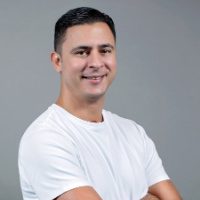
Farouk Gomati is fluent in five languages and brings more than twelve years of experience in international logistics and warehousing, Farouk’s leadership has contributed to the expansion and growth of Interworld Freight USA in different areas. He leads Interworld’s commercial and technology efforts, manages global partnerships and agent relationships, and has opened the company’s branches in Panama, Dominican Republic and Bahamas. From the ages of 18 – 29, Farouk traveled the world as a professional musician, sponsored by the world’s top percussion brands and earning four Latin Grammys. Farouk’s musical career and life were nearly cut short when in 2012 he was hospitalized and spent more than three months fighting for his life and having to re-learn how to walk, speak and breathe due to a very rare syndrome. He looks back on that time as one where God brought him back stronger with the mission to inspire everyone around him with a message of faith and strength. Connect with Farouk on LinkedIn.
